In chess, whoever corners the king wins. It doesn’t matter how many forces each player ends up with. If the king cannot move, he loses. Overthrowing the king is the ultimate end of the game, and the rest of the counters are expendable. Two young men wearing hoods and balaclavas on the street in Barcelona played a game of chess. They had come to the so-called Picnic for the Republic and played to destroy the enemy king. Without wanting to say their names or their age („twenty-something”), they discover their faces and respond kindly to the questions once the game is over.

Catalonia on trial
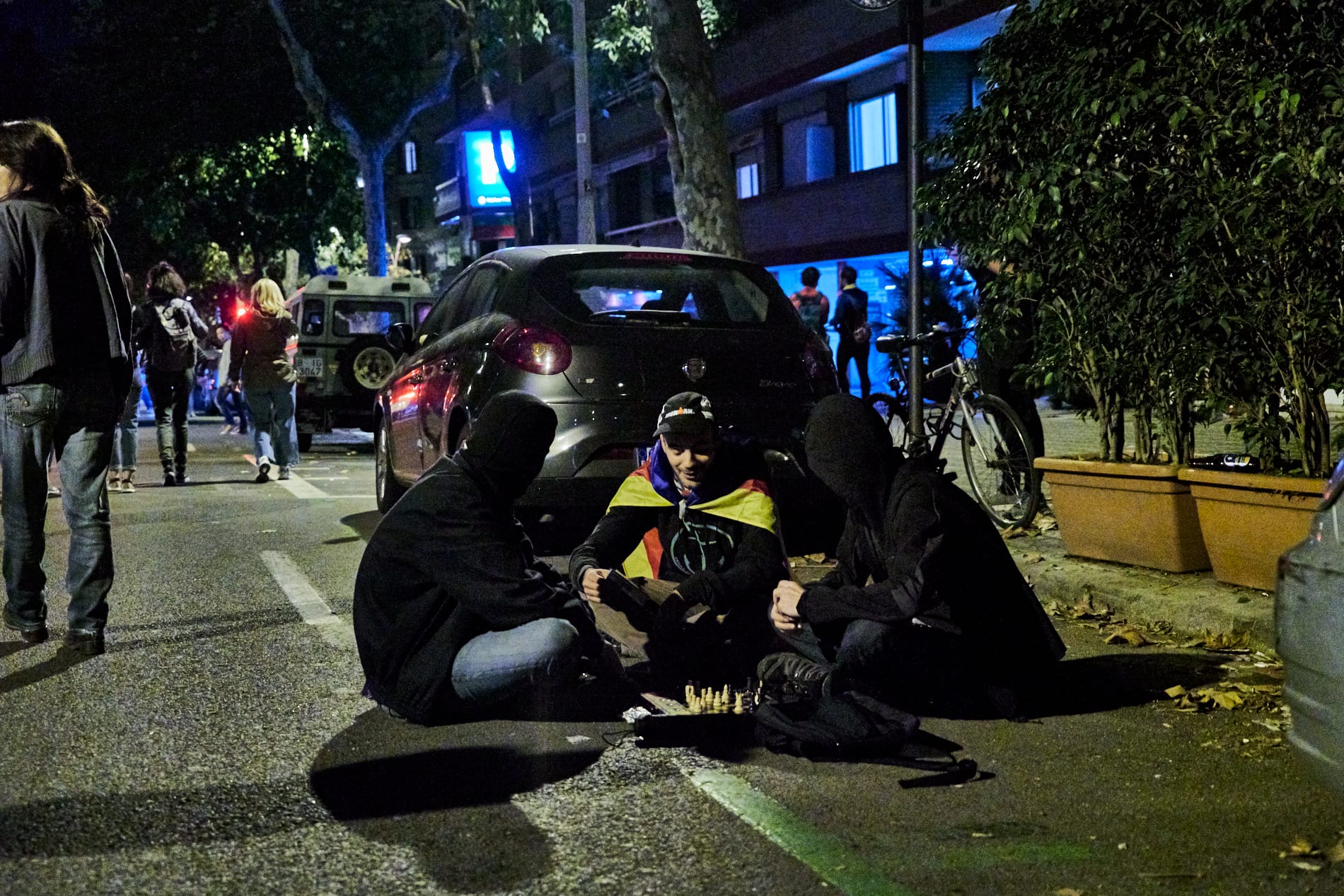
It is the night of Sunday, October 20, 2019. Six days have passed since the sentence convicting nine Catalan pro-independence leaders to between 9 and 13 years in prison for the independence process that culminated in a referendum and a declaration of independence in October 2017.
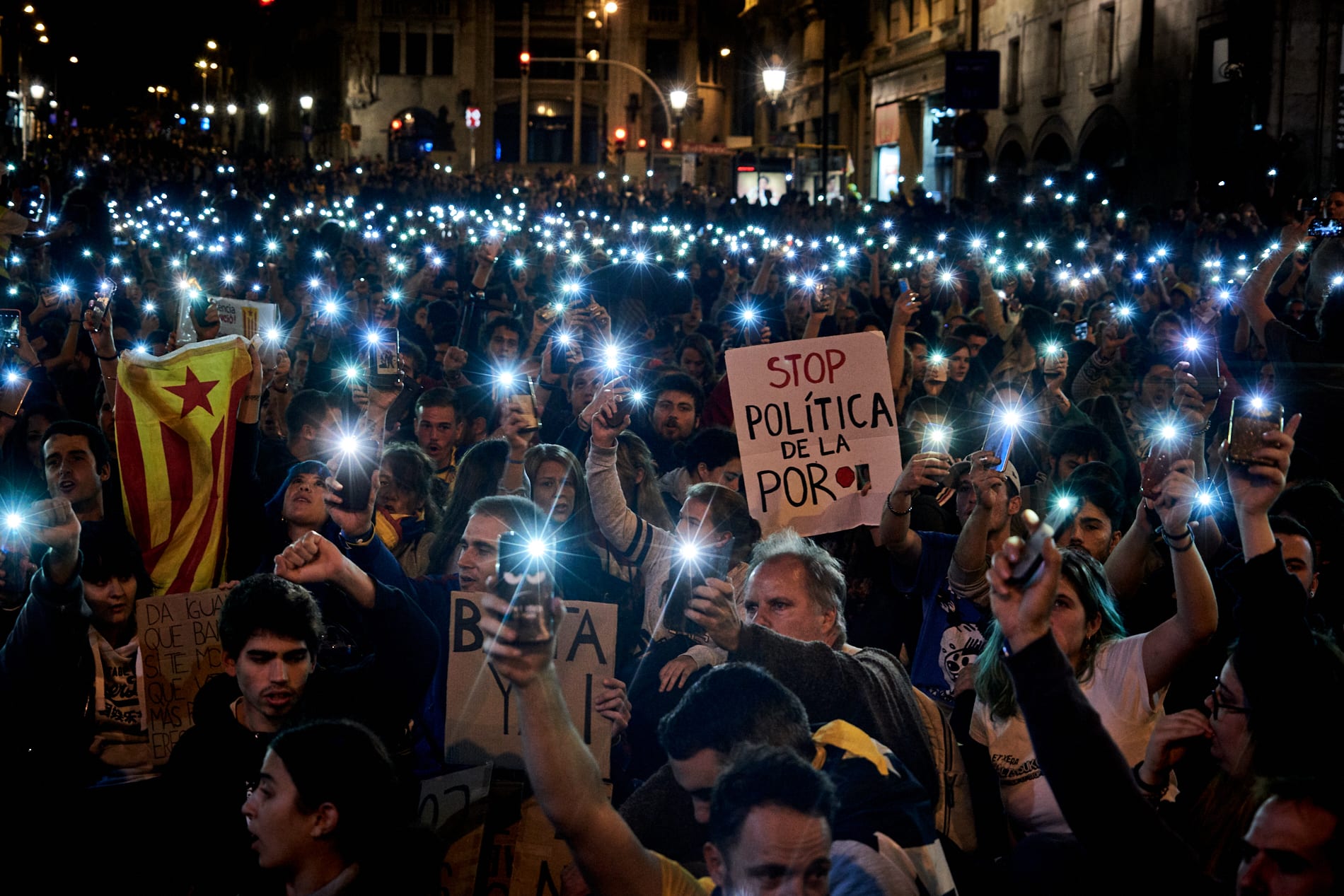
Six days of citizen protests against a sentence considered unfair by independentistas.
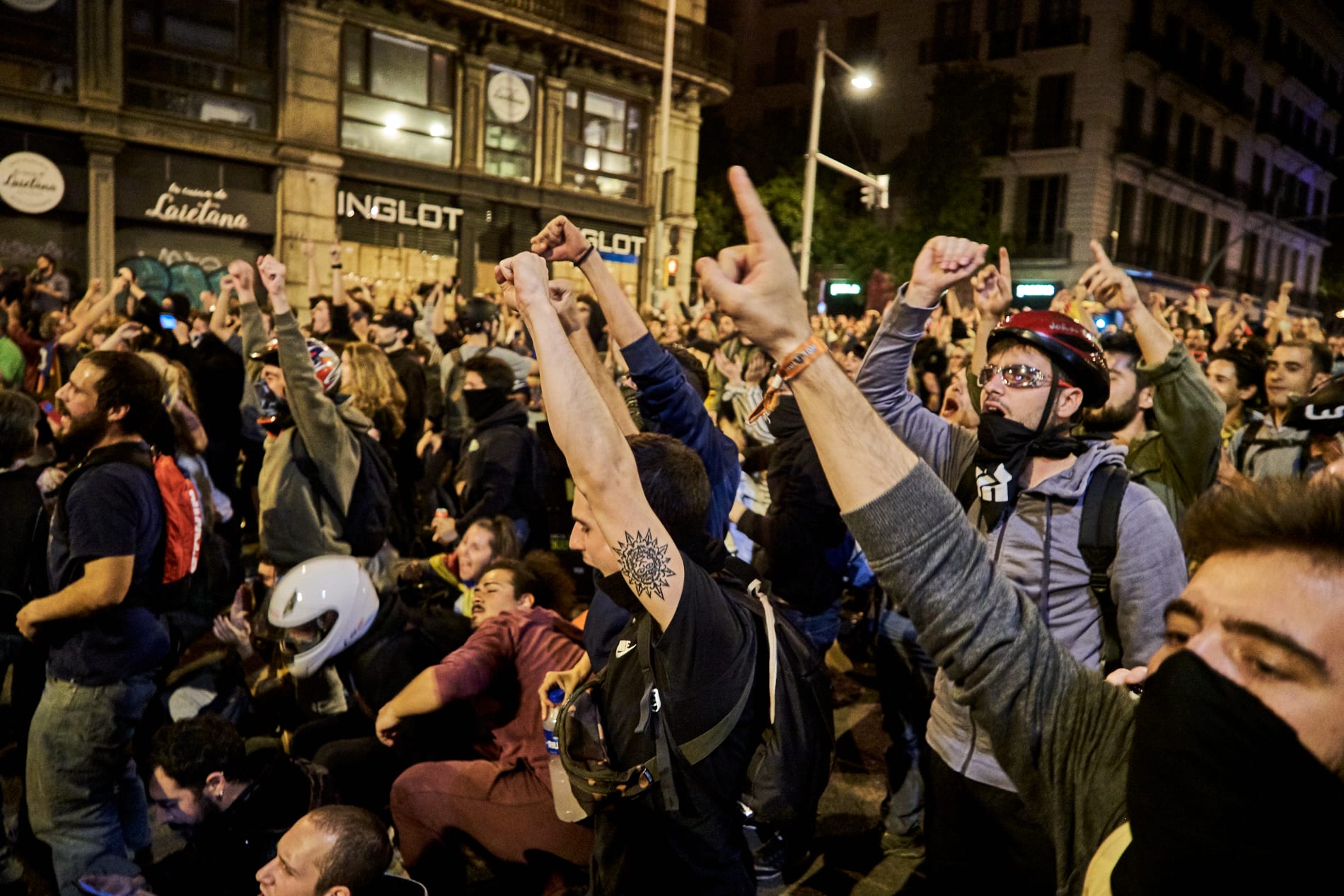
Six days of road and railway cuts, police charges, …
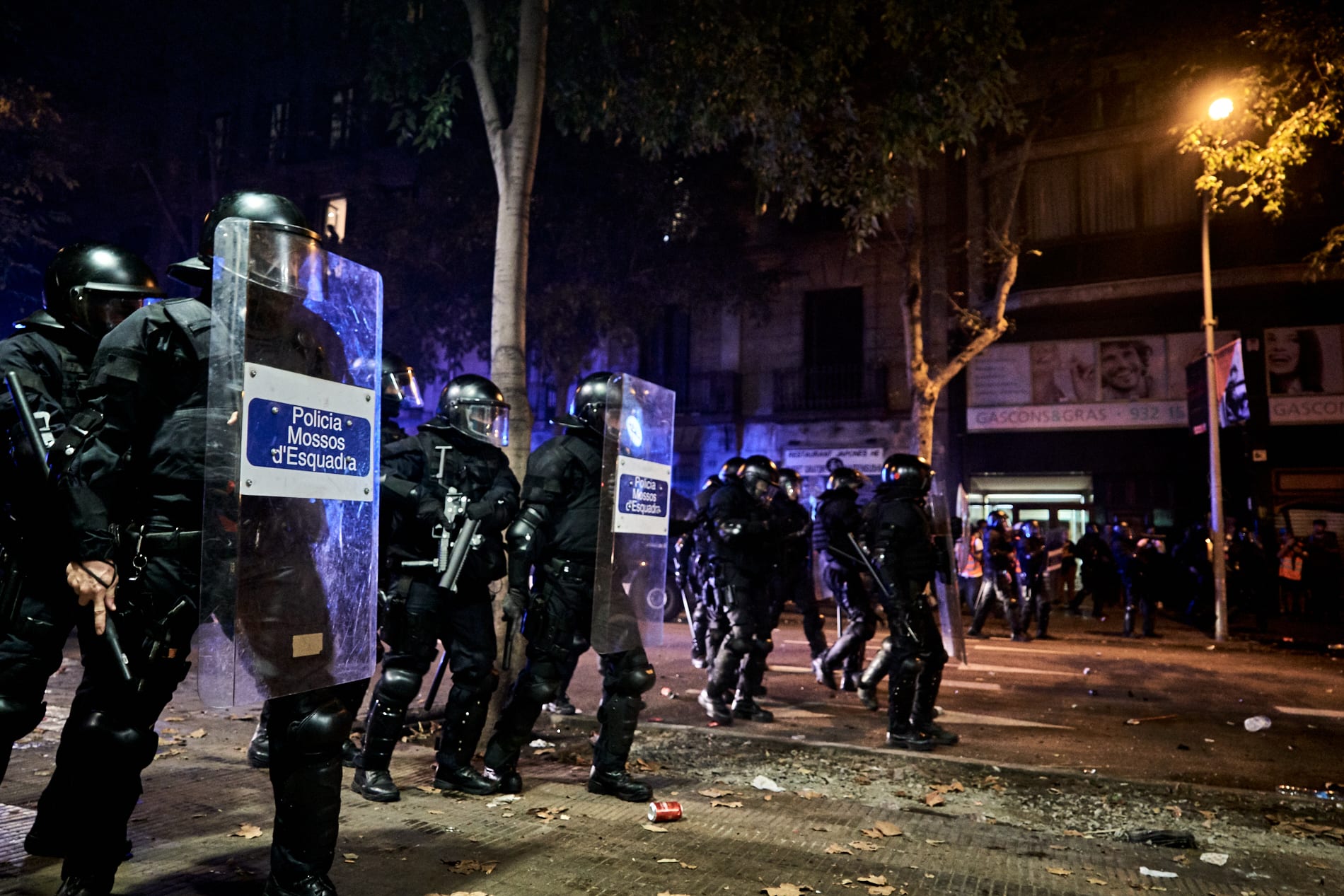
riots, …
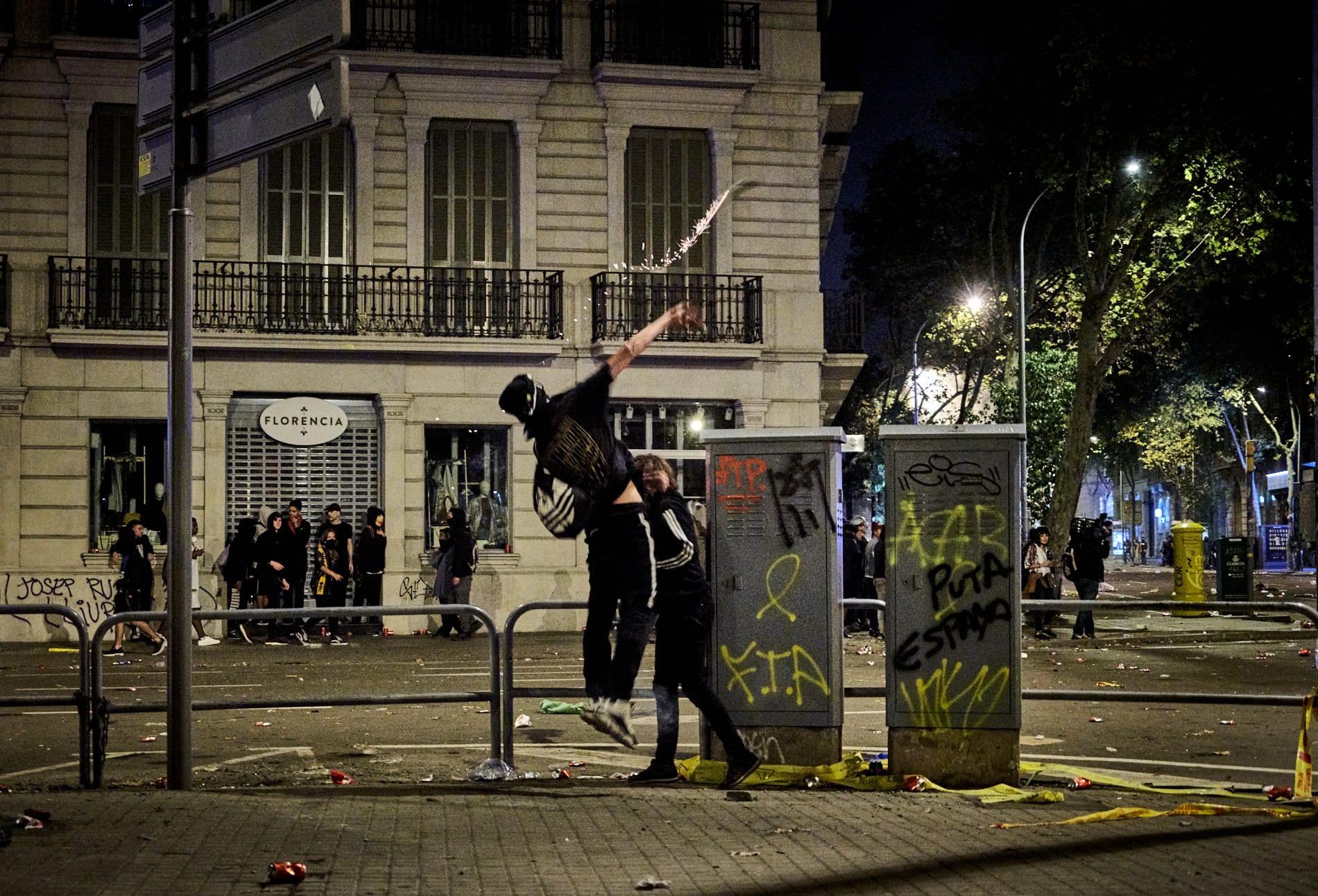
injuries and arrests, …
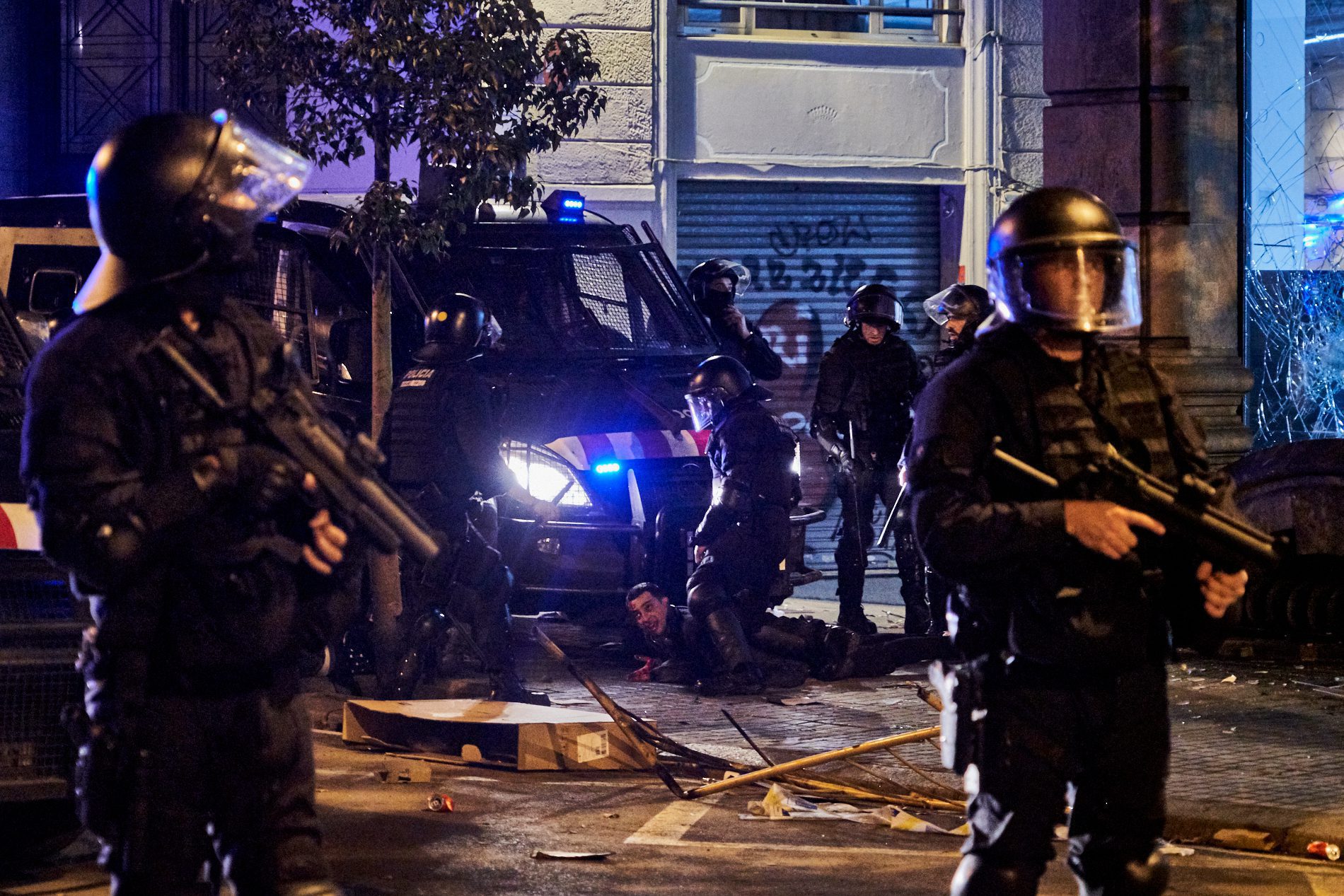
looting and even, for a few hours, the blockade of Barcelona airport.
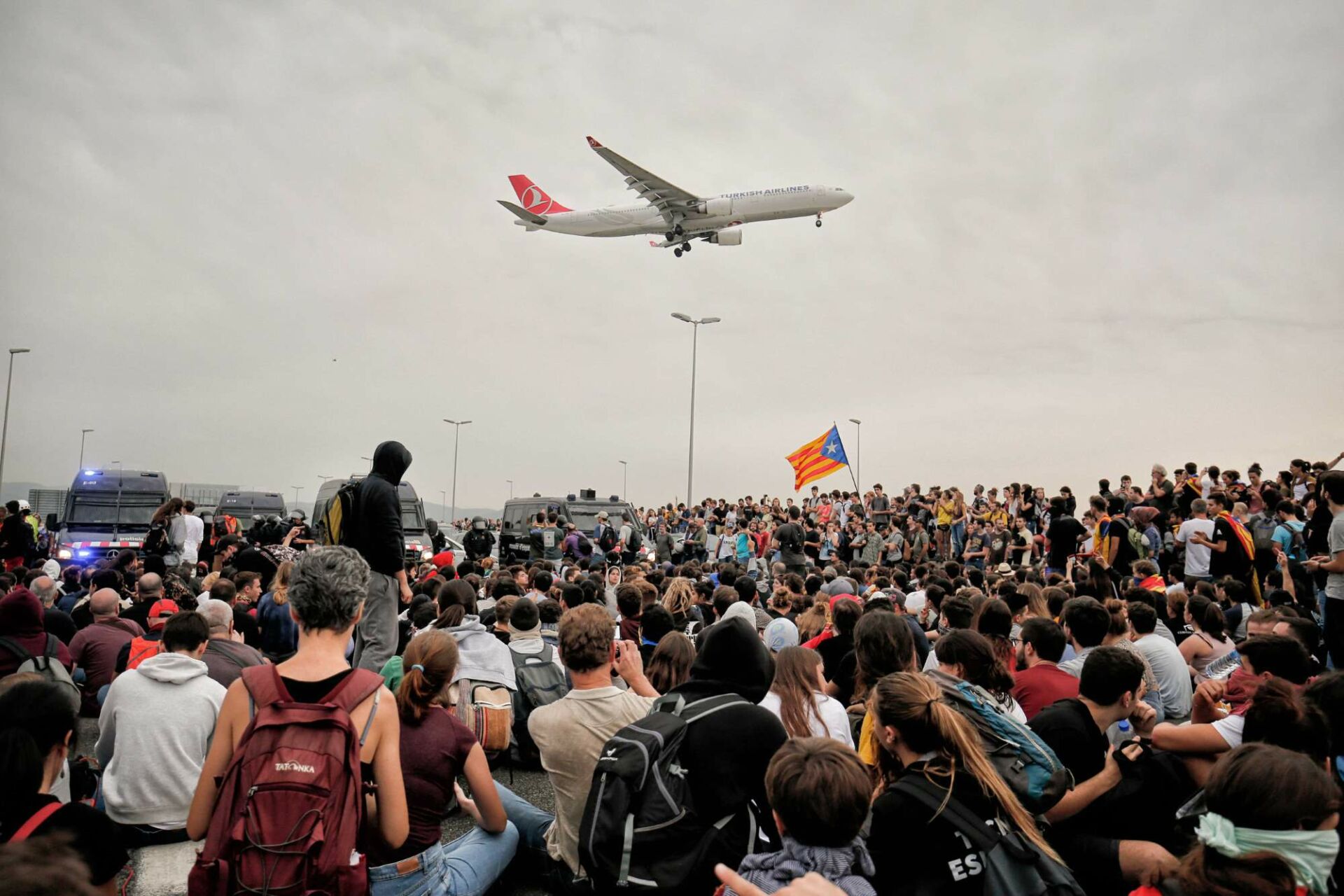
The image of the two young separatists playing chess, with the face covered while being photographed, reminds the participants in the violent acts during the whole week: young men with their faces covered. They have attended almost every protest event of the week and say the police have beaten them up.
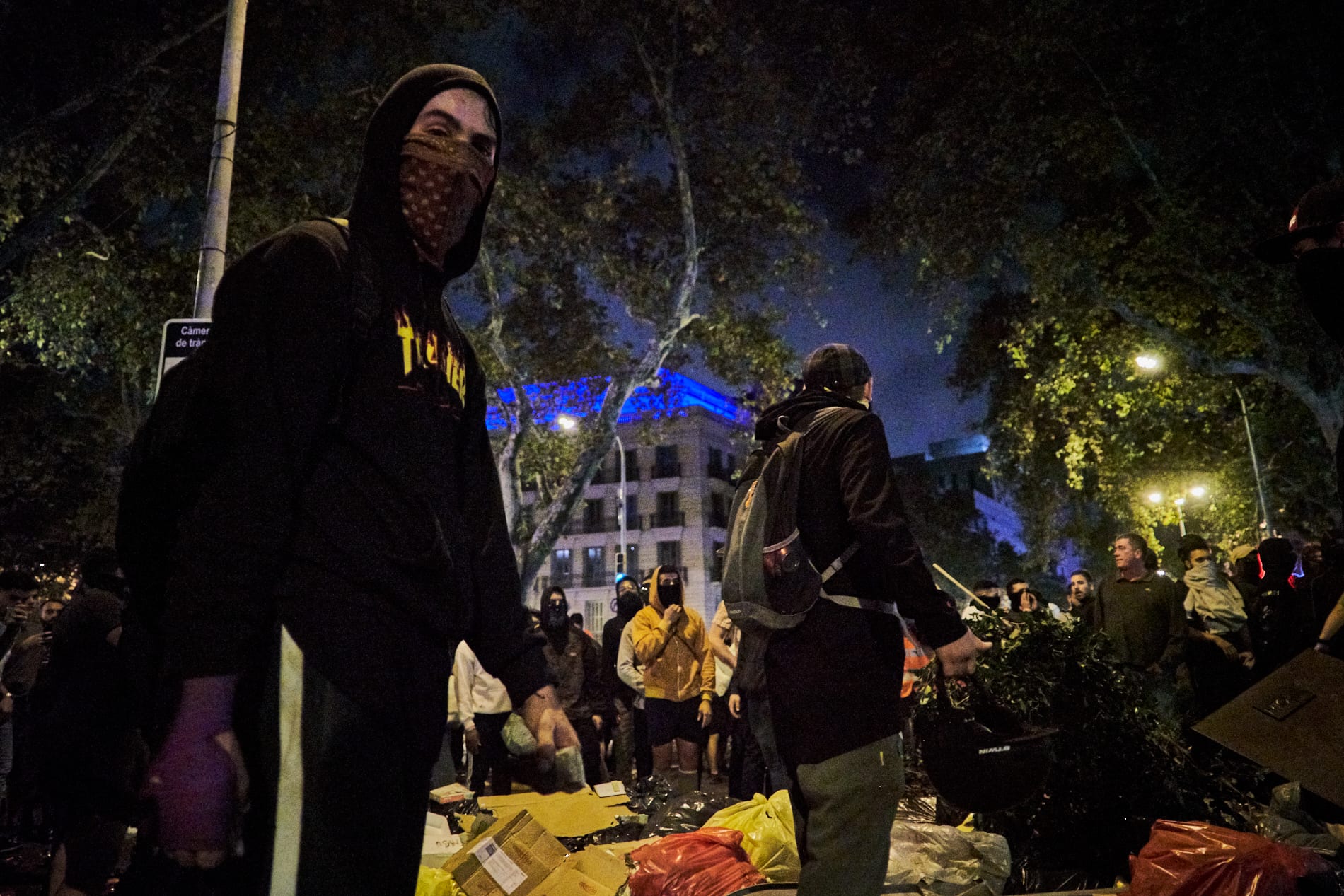
„There has been violence, and self-defence and the violence has also been reactive to disproportionality and police abuse. Some people make barricades to defend themselves, and others destroy by destroying,” says one of the young people, disassociating themselves from the looting of shops, who says he sees that as an attack on an innocent civilian population.
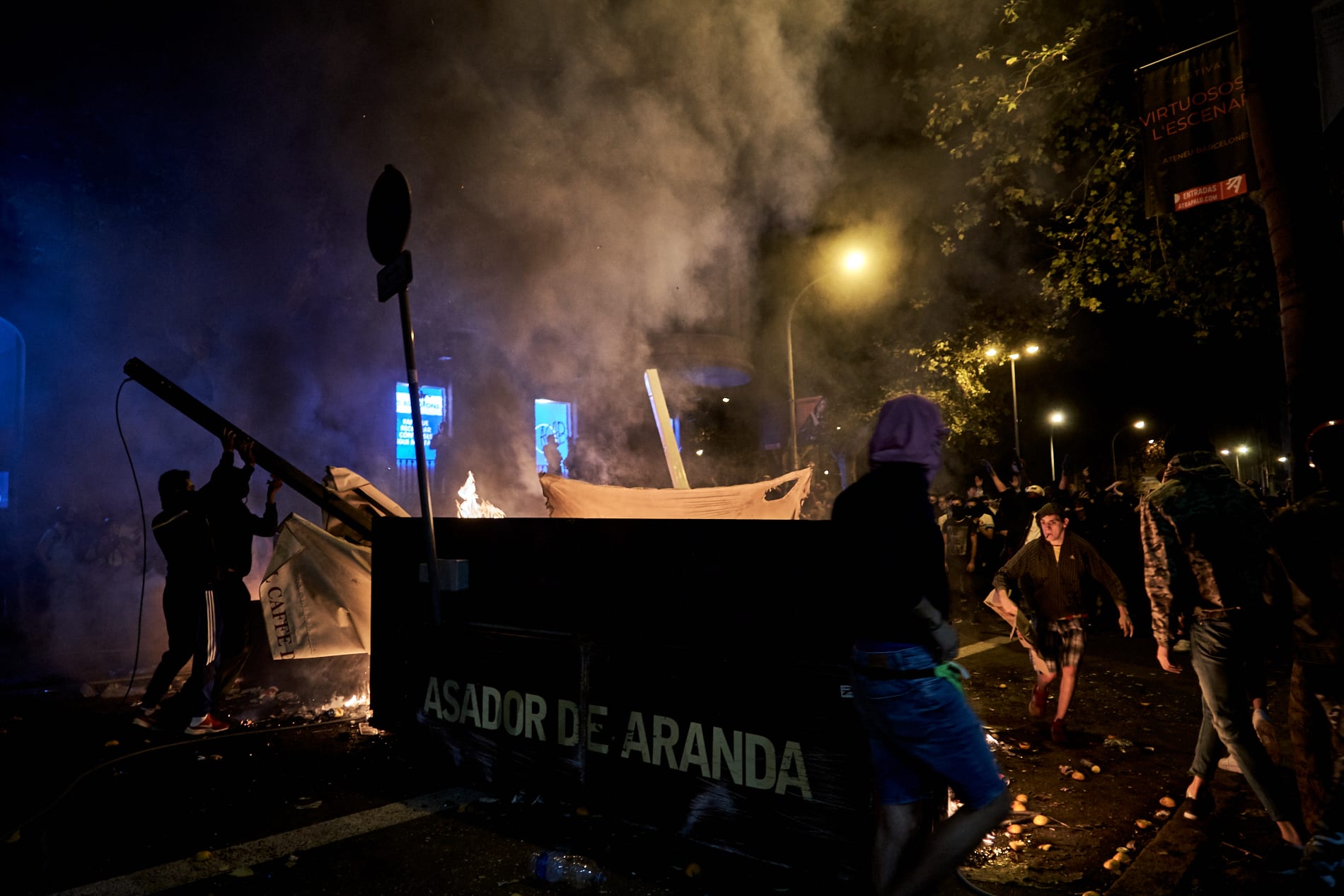
The Looting
After 2 am, demonstrators started to go home.
A group of young people were passing the Media Markt store when the first stone hit the shopping window. More stones followed as a sudden revolt against corporations.
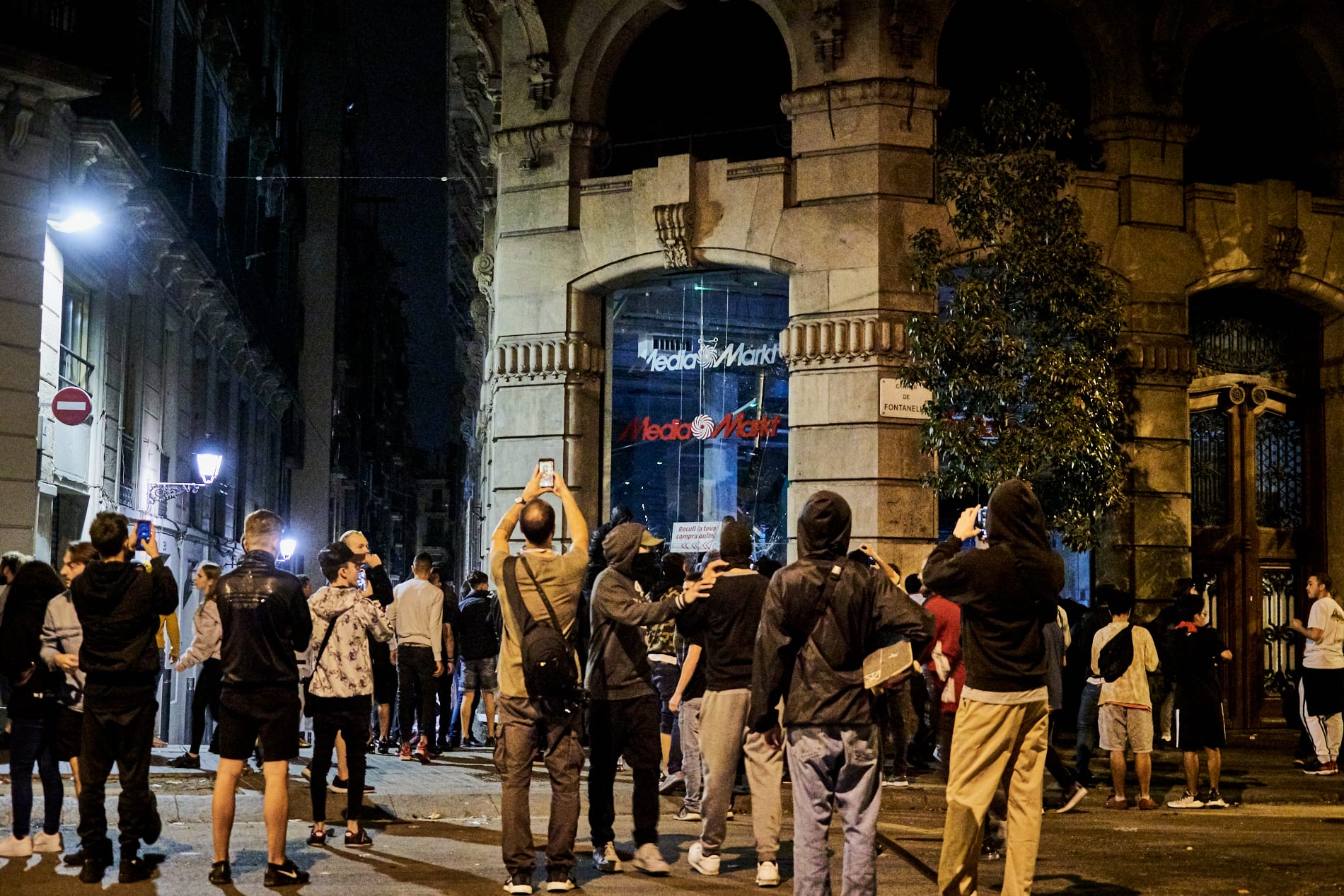
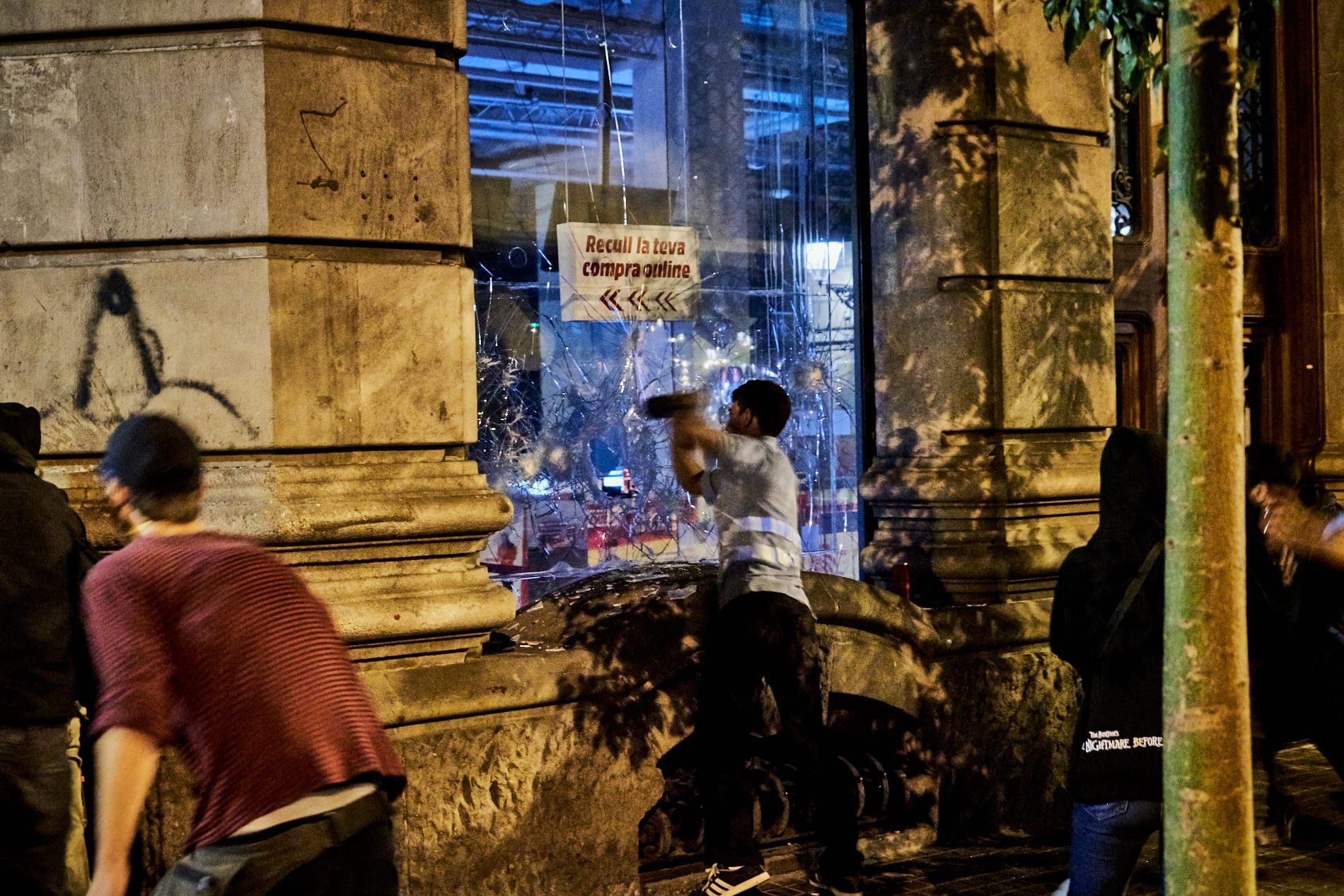
After a while, however, the destruction began.
As the reinforced glass was smashed, someone jumped inside, much to the delight of those gathered outside.
More people followed him;
some were already popping out with some stolen equipment.
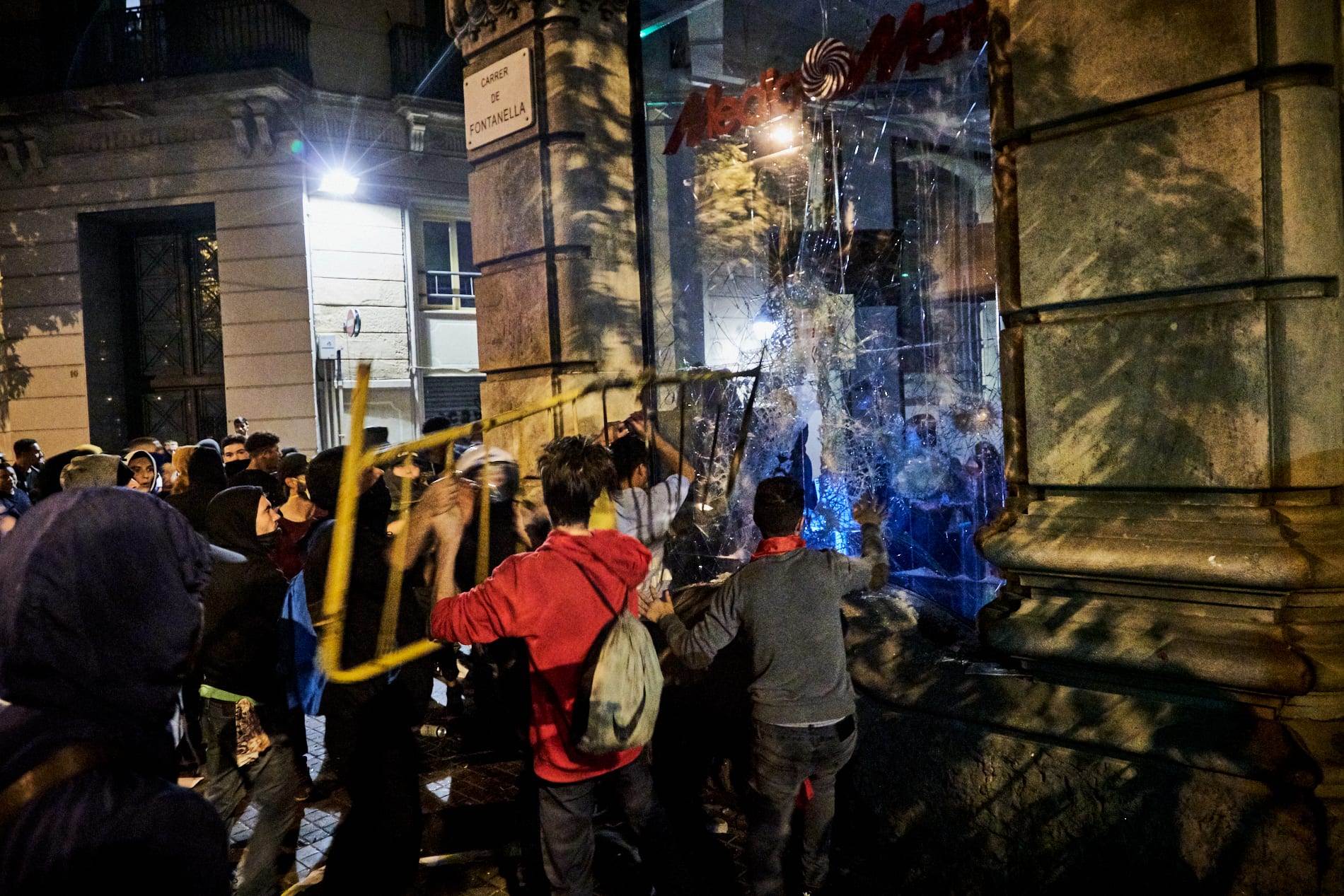
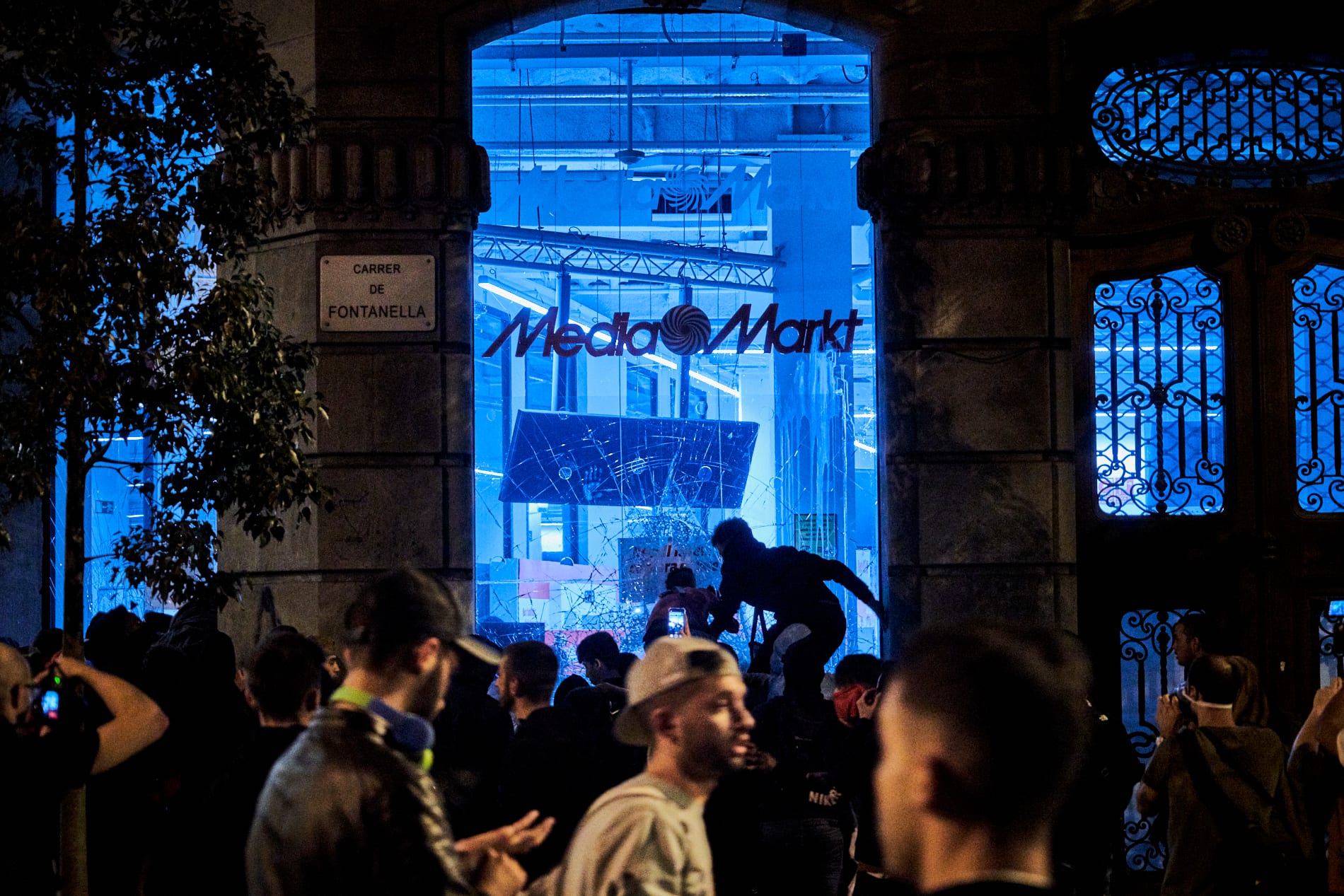
In the beginning, Bluetooth headphones and speakers were being stolen,
then – the electric scooters.
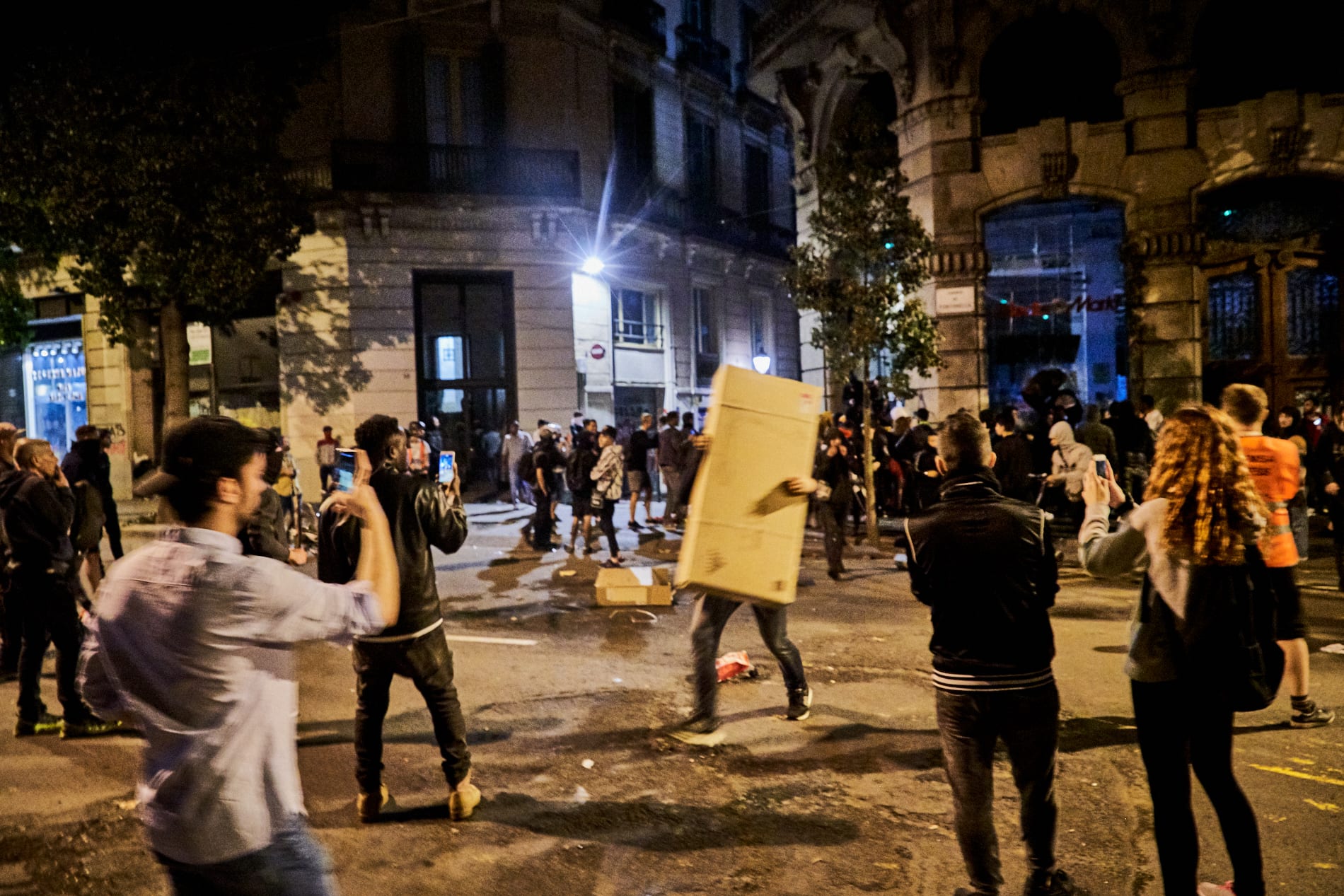
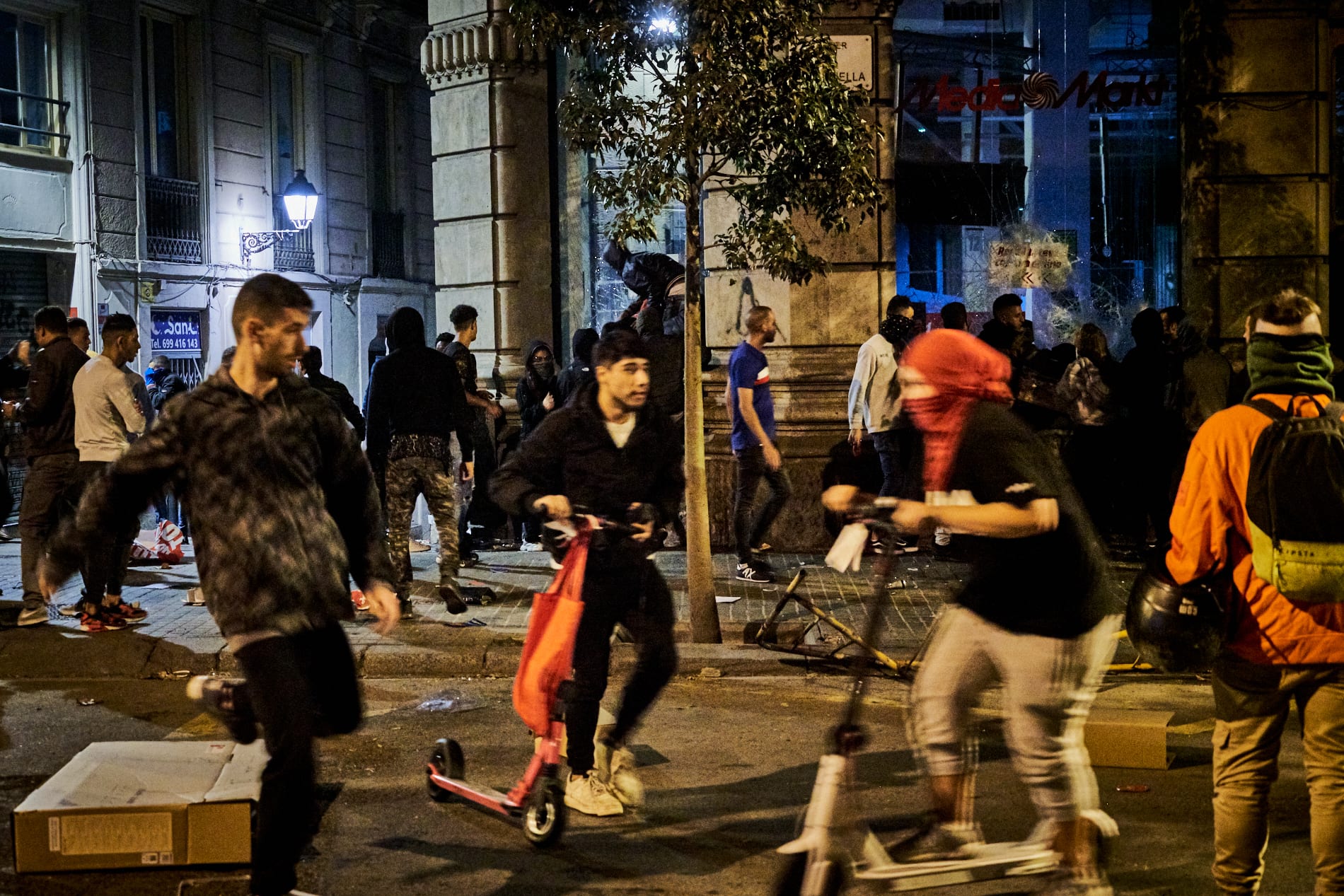
It did not last long.
Other demonstrators begin to oppose the looting.
They argue and try to stop the perpetrators.
They even call the police in front of which
they recently stood and demonstrated.
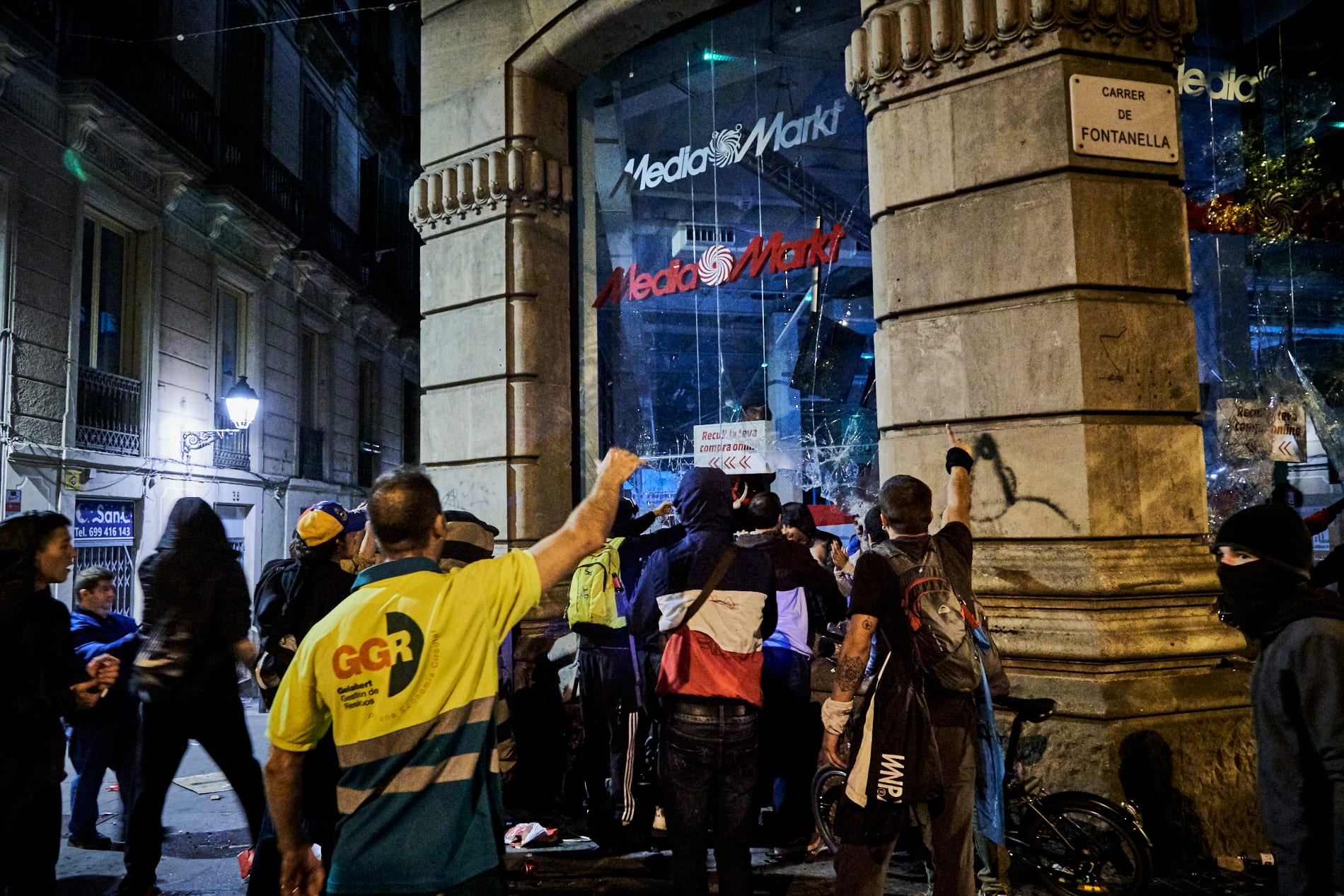
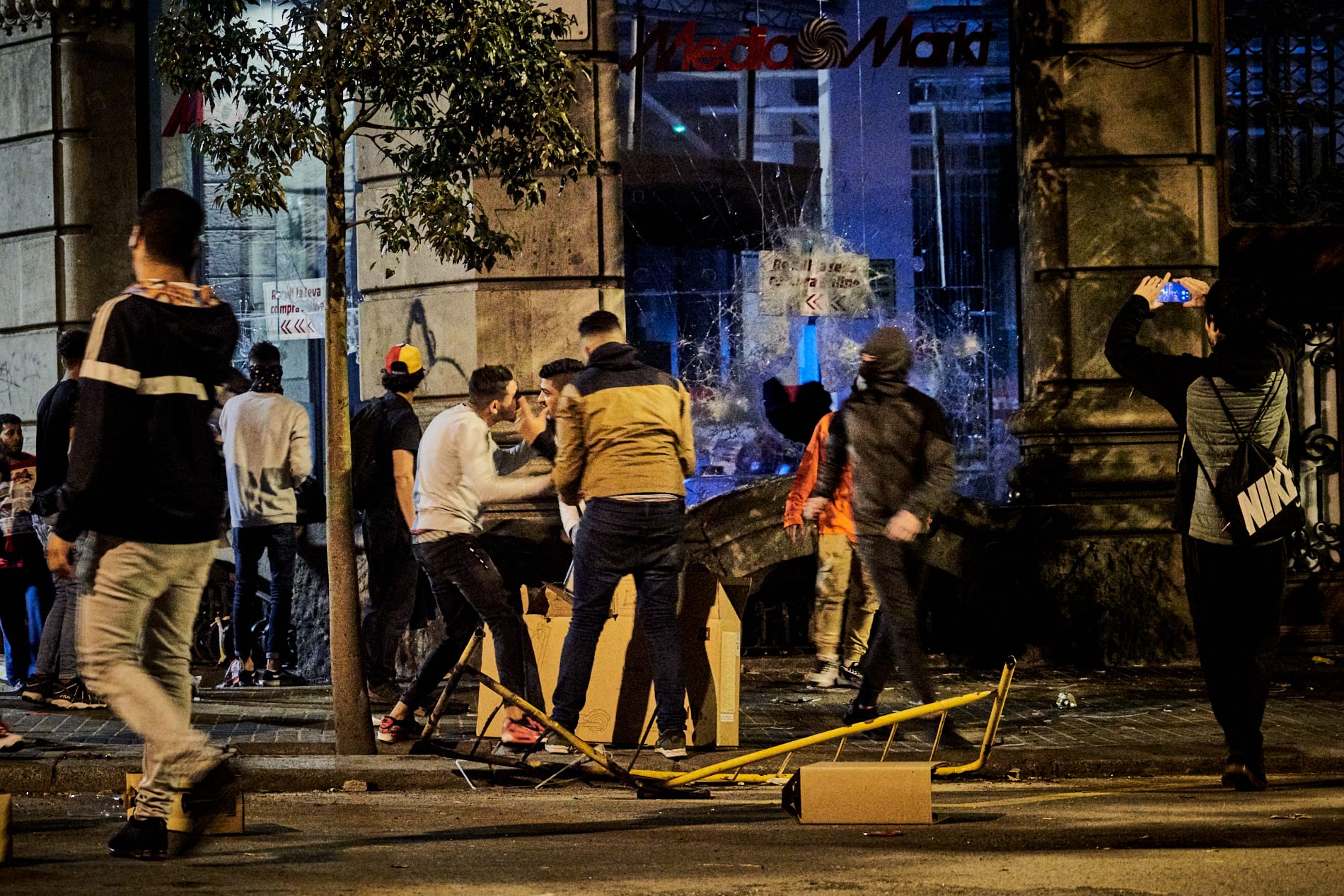
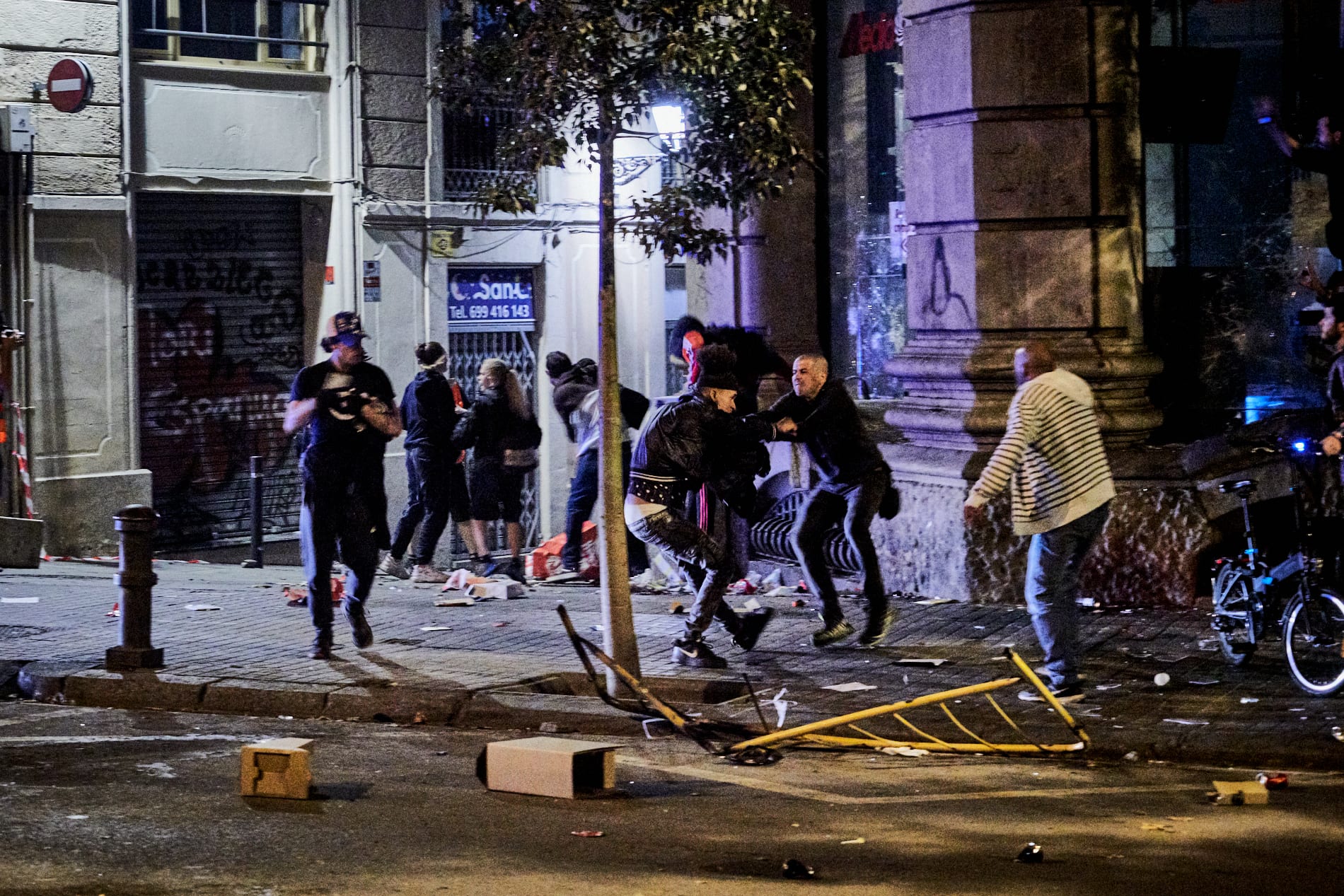
After a while, cars of Mossos d'Esquadra pull up, and it gets empty.
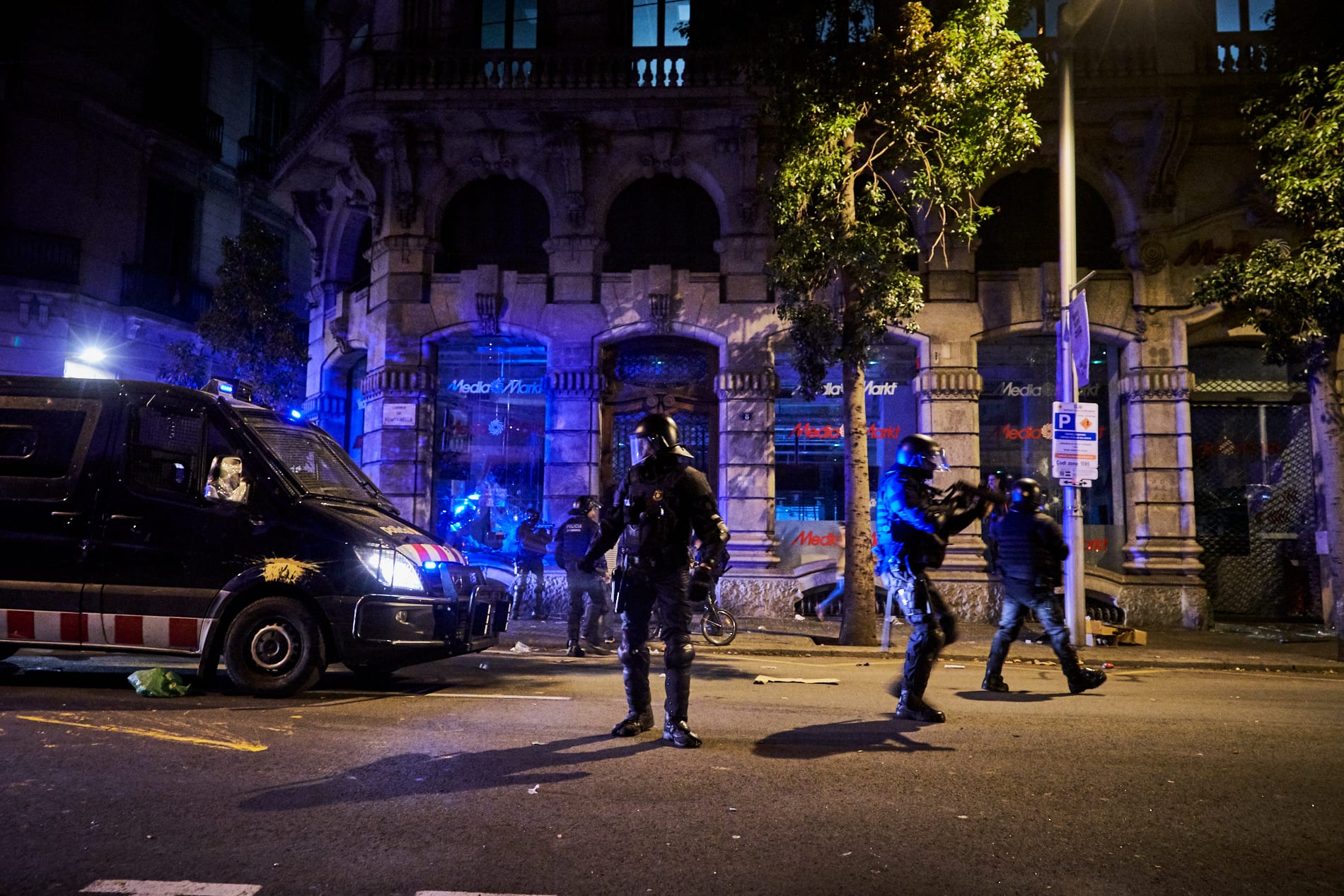
„Every time a stone is thrown, the police have to protect themselves and cannot carry it.
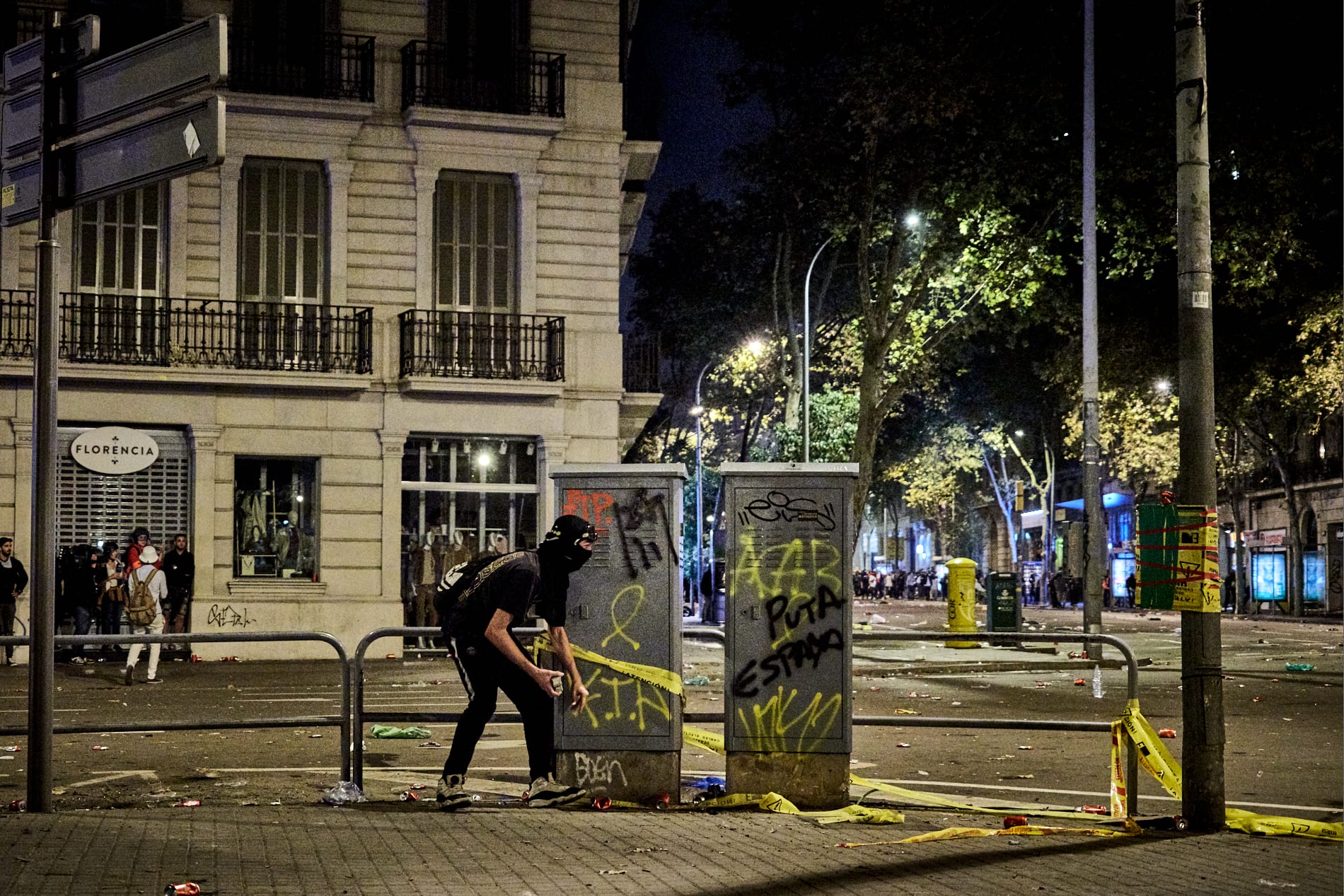
Every time a barricade is lit and the police have to stop to remove it; the police cannot run over people. If there is a rain of stones, the police cannot attack. It is the difference between gratuitous violence and violence in response to disproportionate attacks by the police,” defends the other.
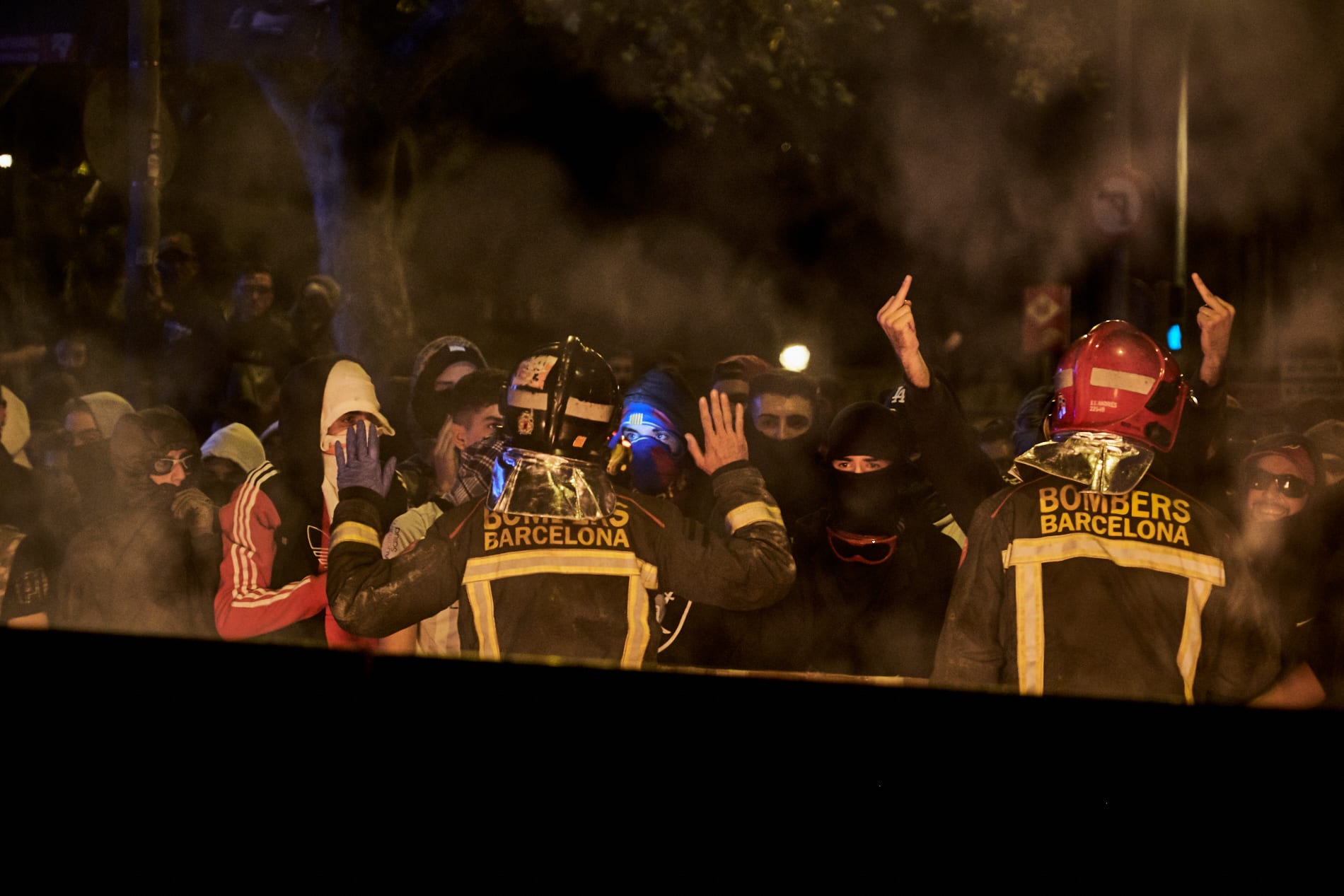
And although violence has marked the media agenda, the riots have covered up massive demonstrations against the sentencing of separatist leaders. The violence that some consider as delegitimizing the independence movement but without which it would not have been able to attract the focus of the international press.
Young people do not have a solution to the Catalan situation. Still, they do believe that it is not the one used so far by the government: the temporary suspension of Catalonia’s autonomy after the declaration of independence in 2017, criminalisation and sentences such as the one that caused these protests?
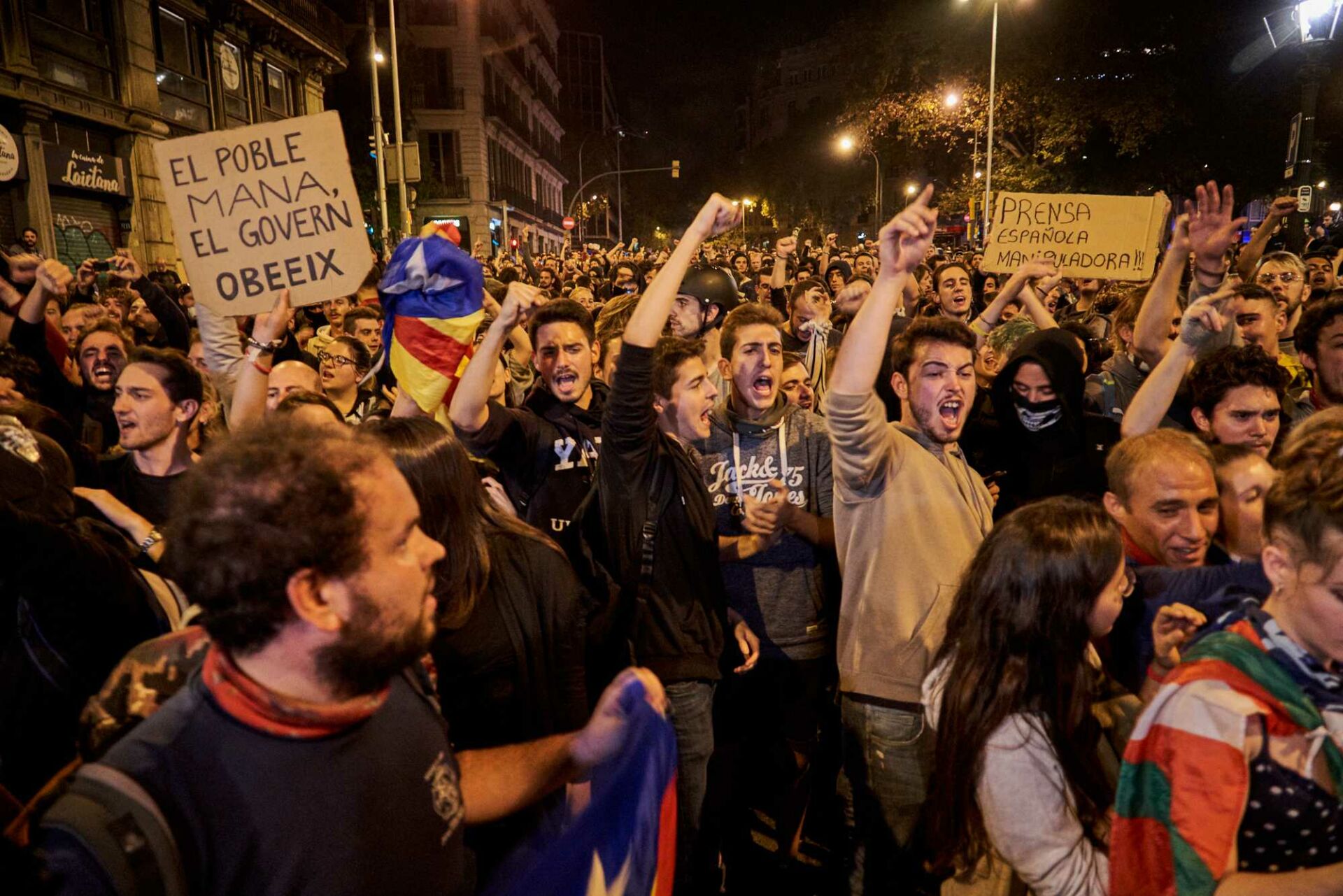
Ainoa is 20 years old, studies Tourism and also works as an event hostess. This young woman has gone with other friends to the Picnic for the Republic „to get the condemned out of prison” since the sentence is „unfair” because it goes against the only politicians who have fulfilled what they promised: a referendum of independence. „Just because you burn containers you can’t criminalise youth,” she said. „What have we achieved by making silent demonstrations?
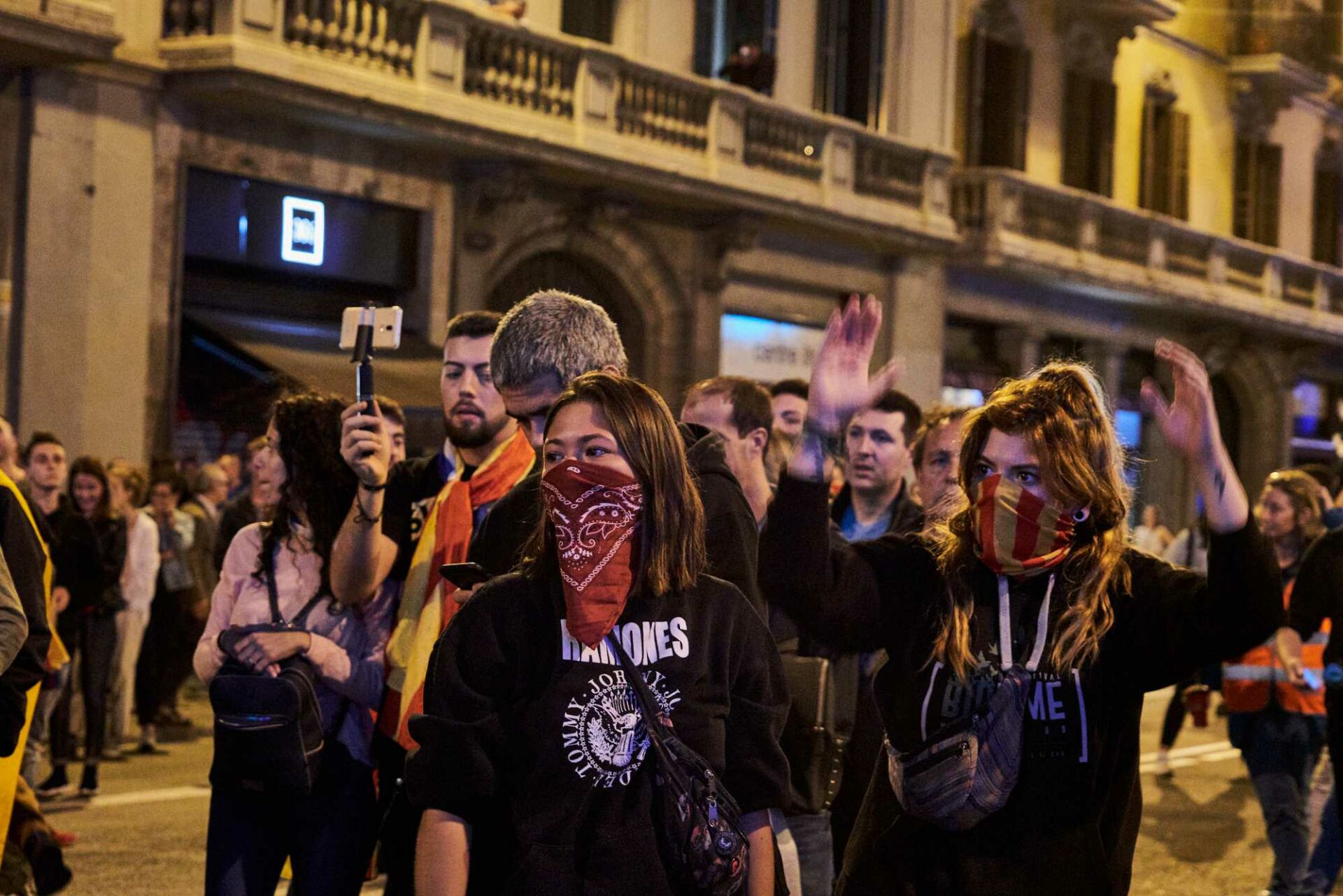
Her vision of the future is pessimistic. She believes that the state of emergency will be applied in Catalonia and that the release of what she considers political prisoners will not be achieved. She criticises both the Catalan and Spanish governments.
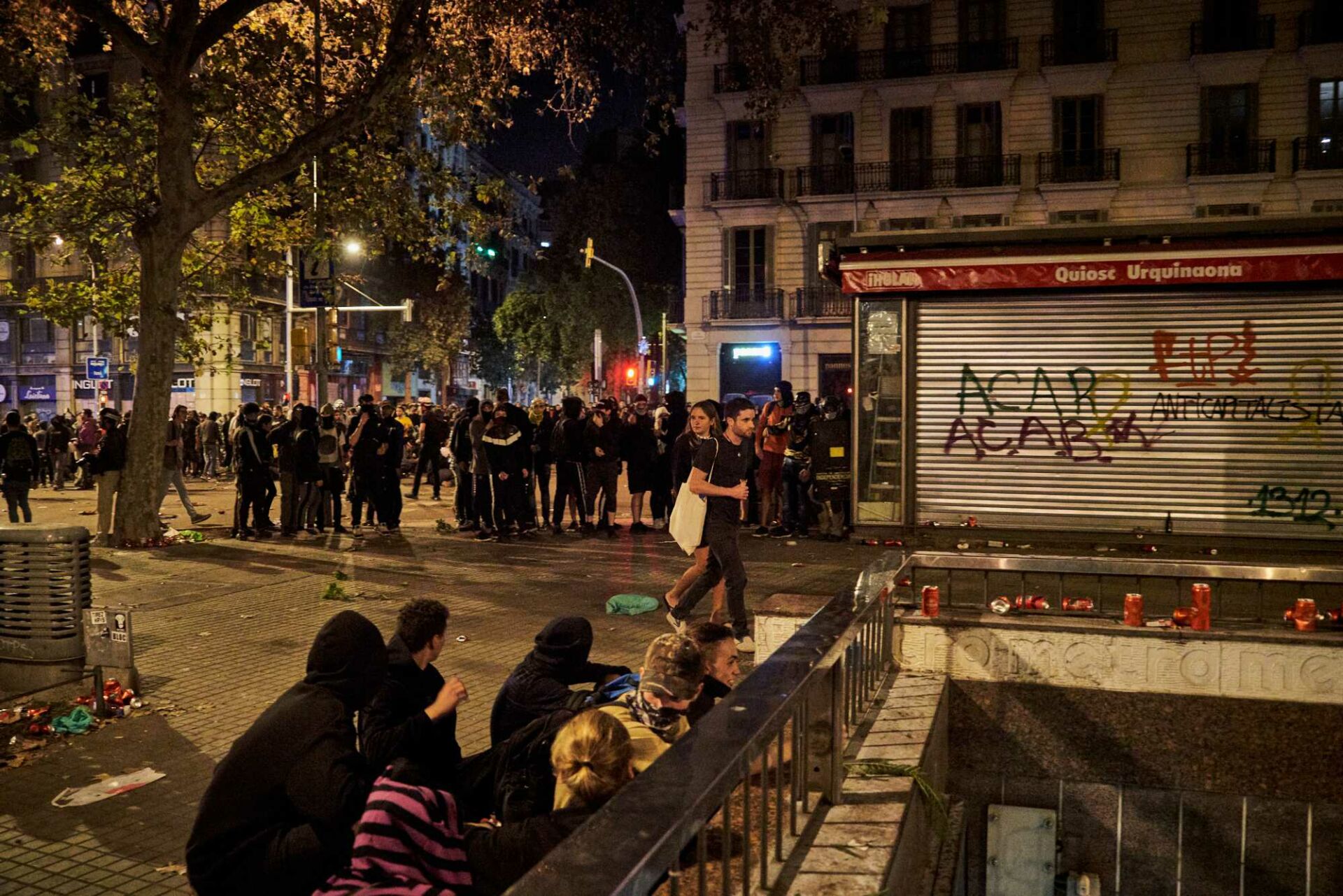
„If you support independence you cannot criminalise those who burn containers,” she says, in a clear allusion to the independence politicians who have condemned the violence in the streets. „I prefer to build a barricade if I am going to be beaten by a policeman for demonstrating because my safety is a priority in front of a container. Lampposts or containers do not make Barcelona, but by people,” Ainhoa said.
Protesters versus violence
Stones fly towards the police and shots are heard in response – the rubber bullets hit the walls and road signs, causing a metallic bang.
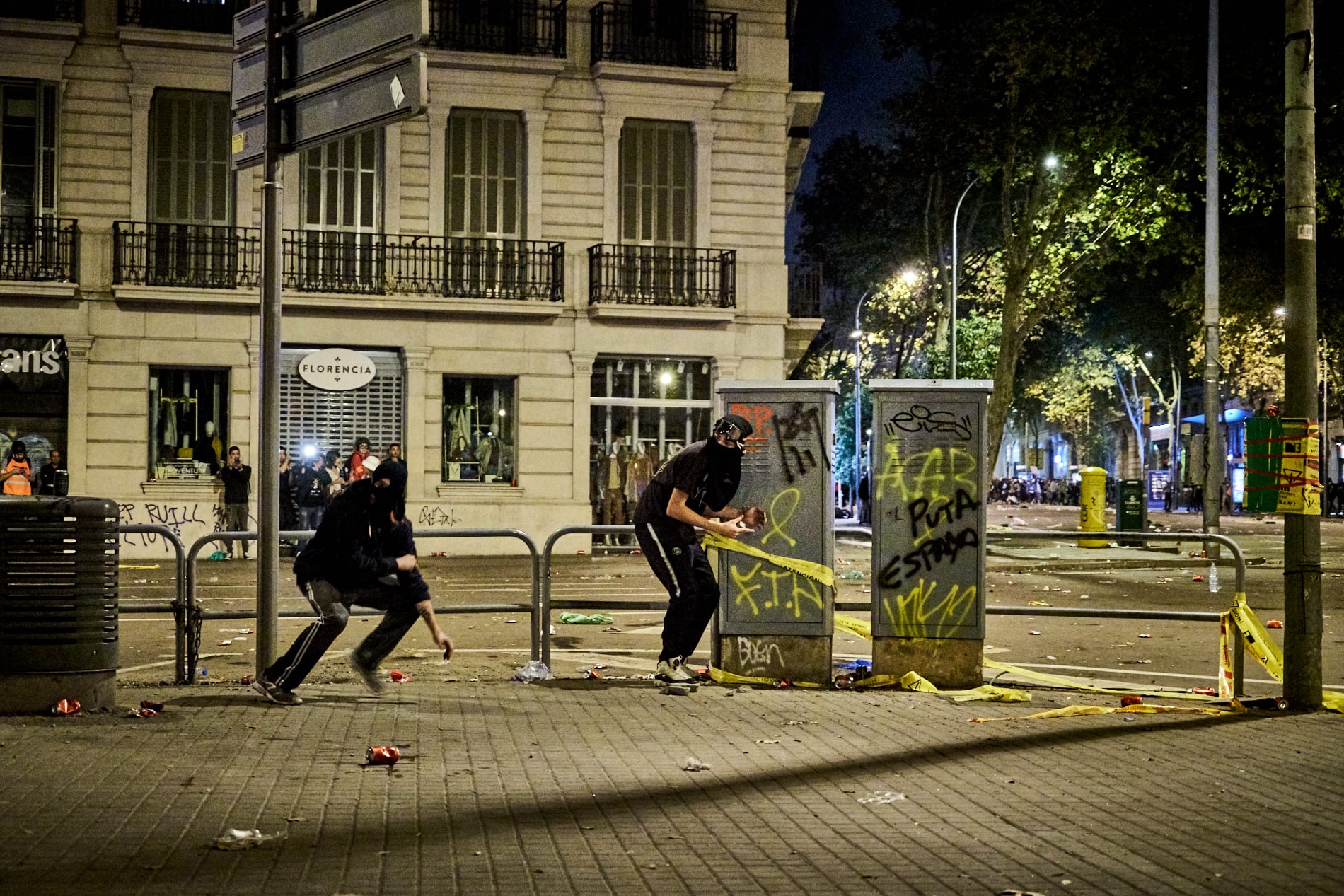
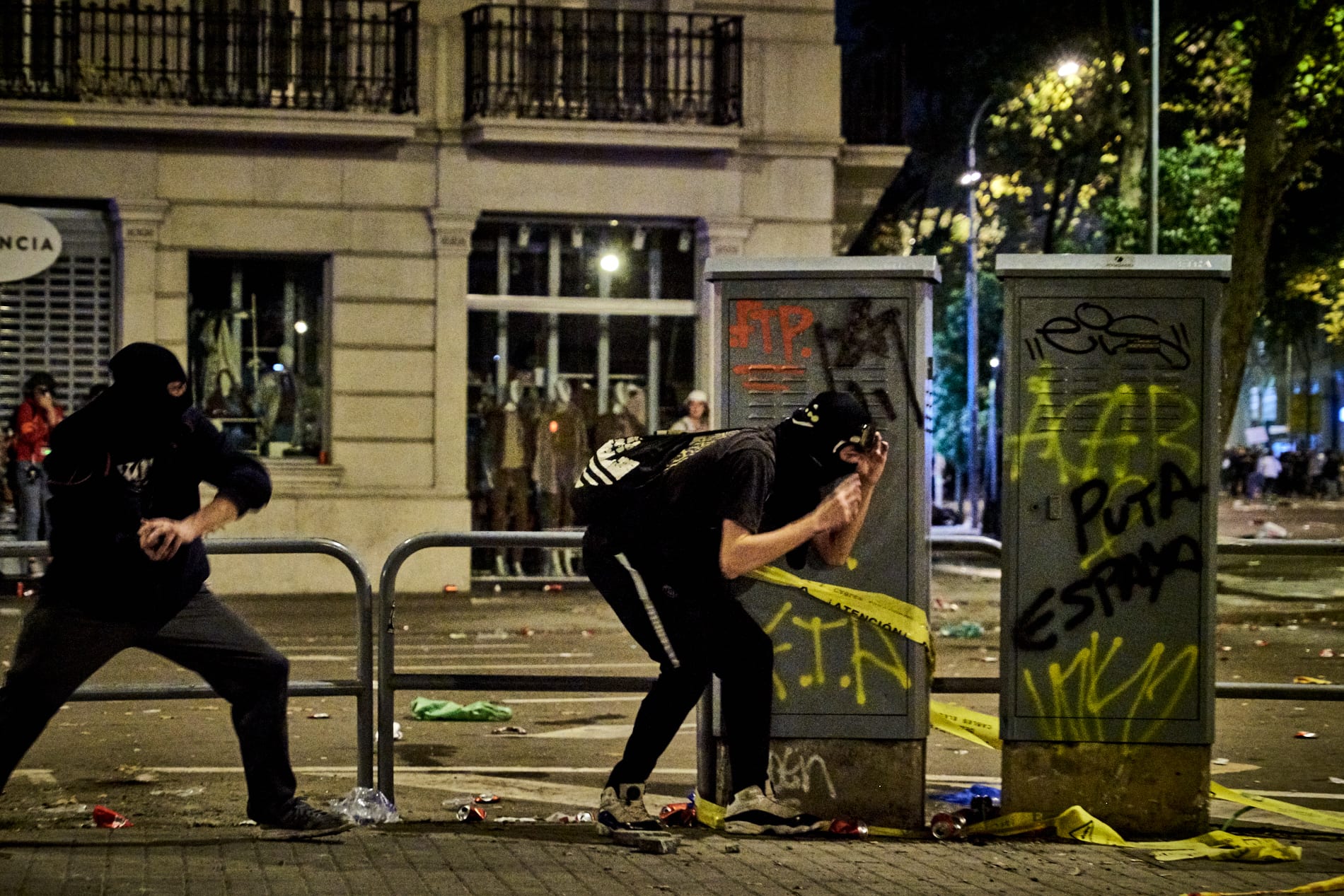
Suddenly a woman pushes a young man, who was throwing stones and starts an argument with him.
She is joined by more protesters who want to stop the riots and demand peaceful protests.
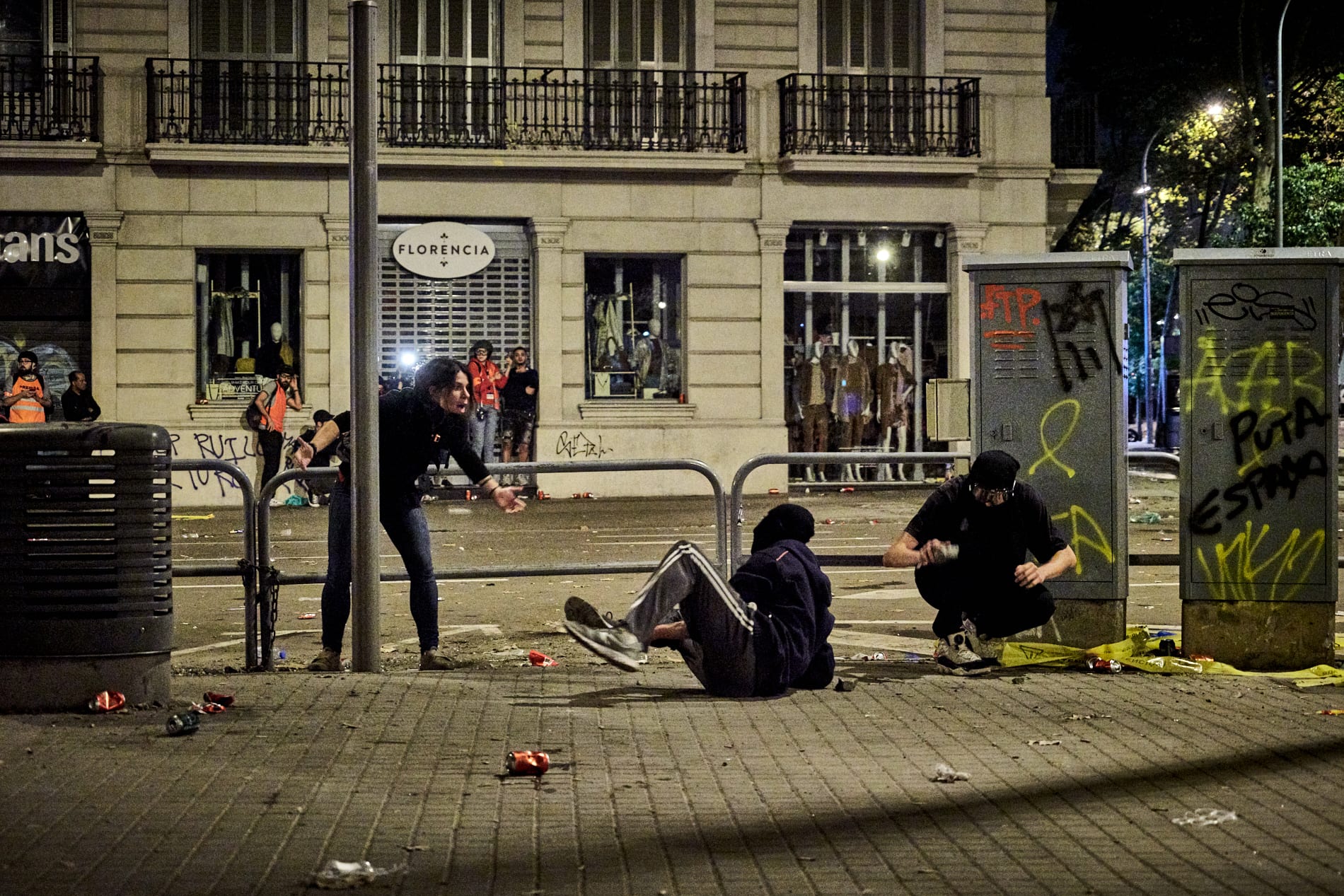
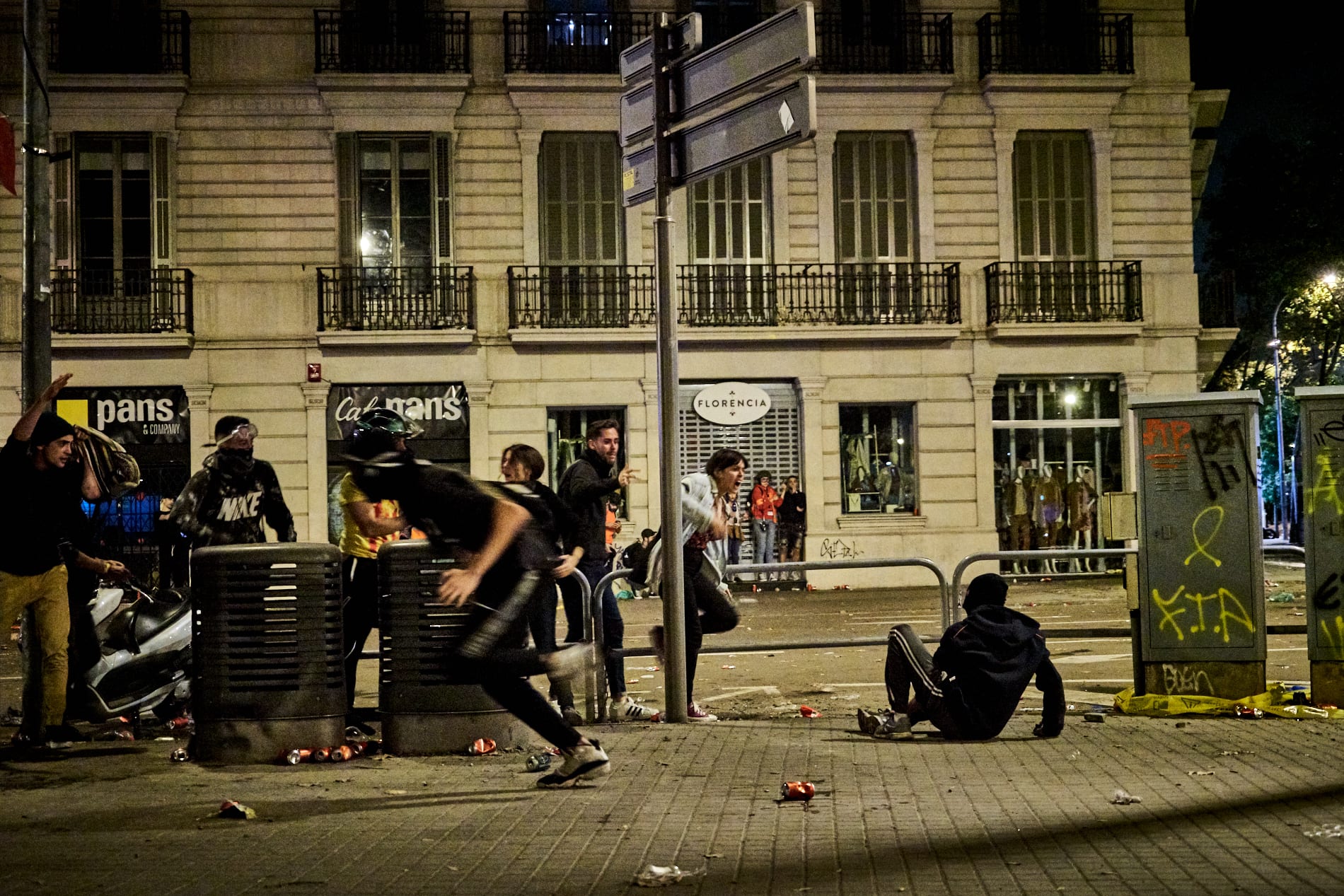
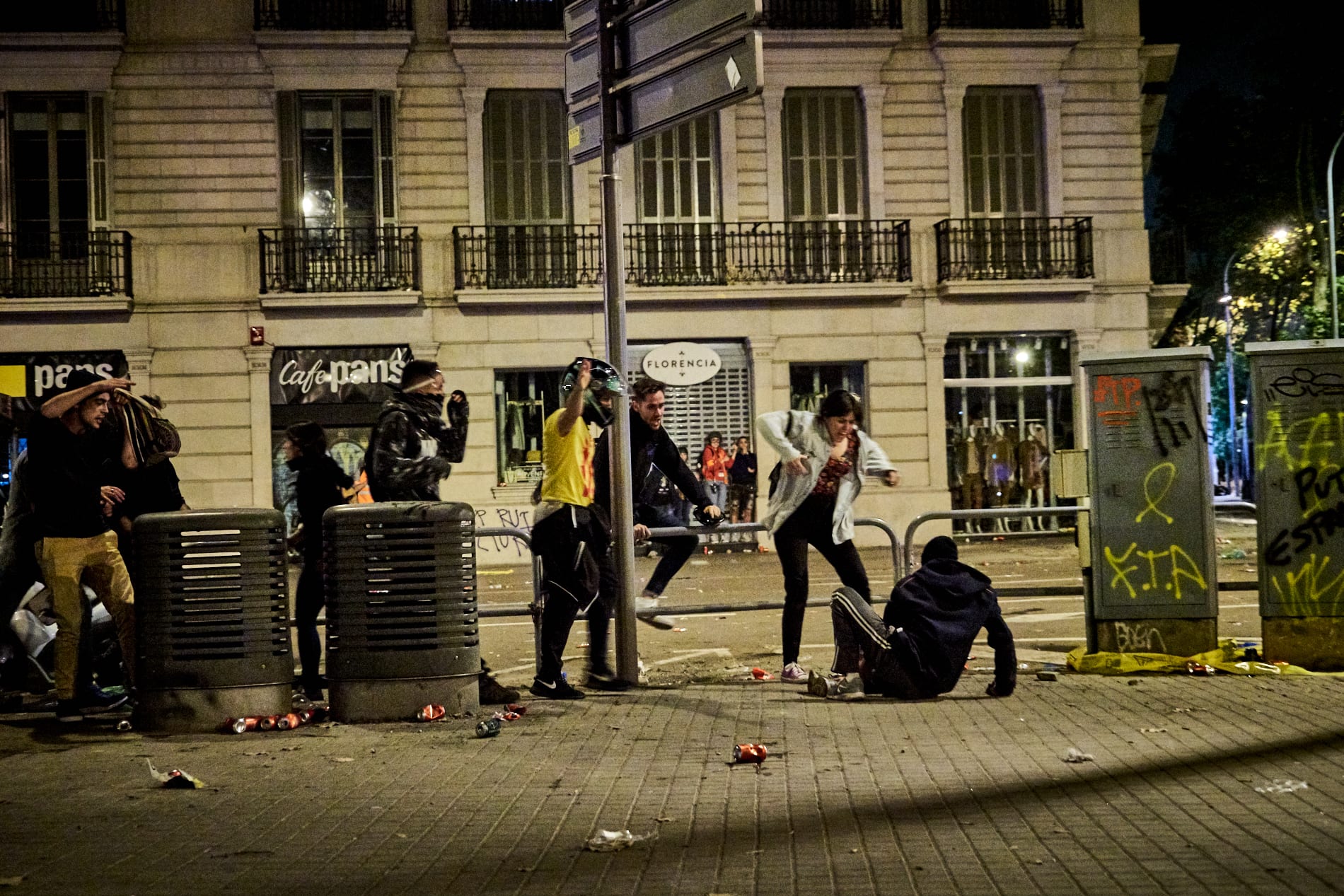
A quarrel begins and becomes more
and more intensive, but it does not last long.
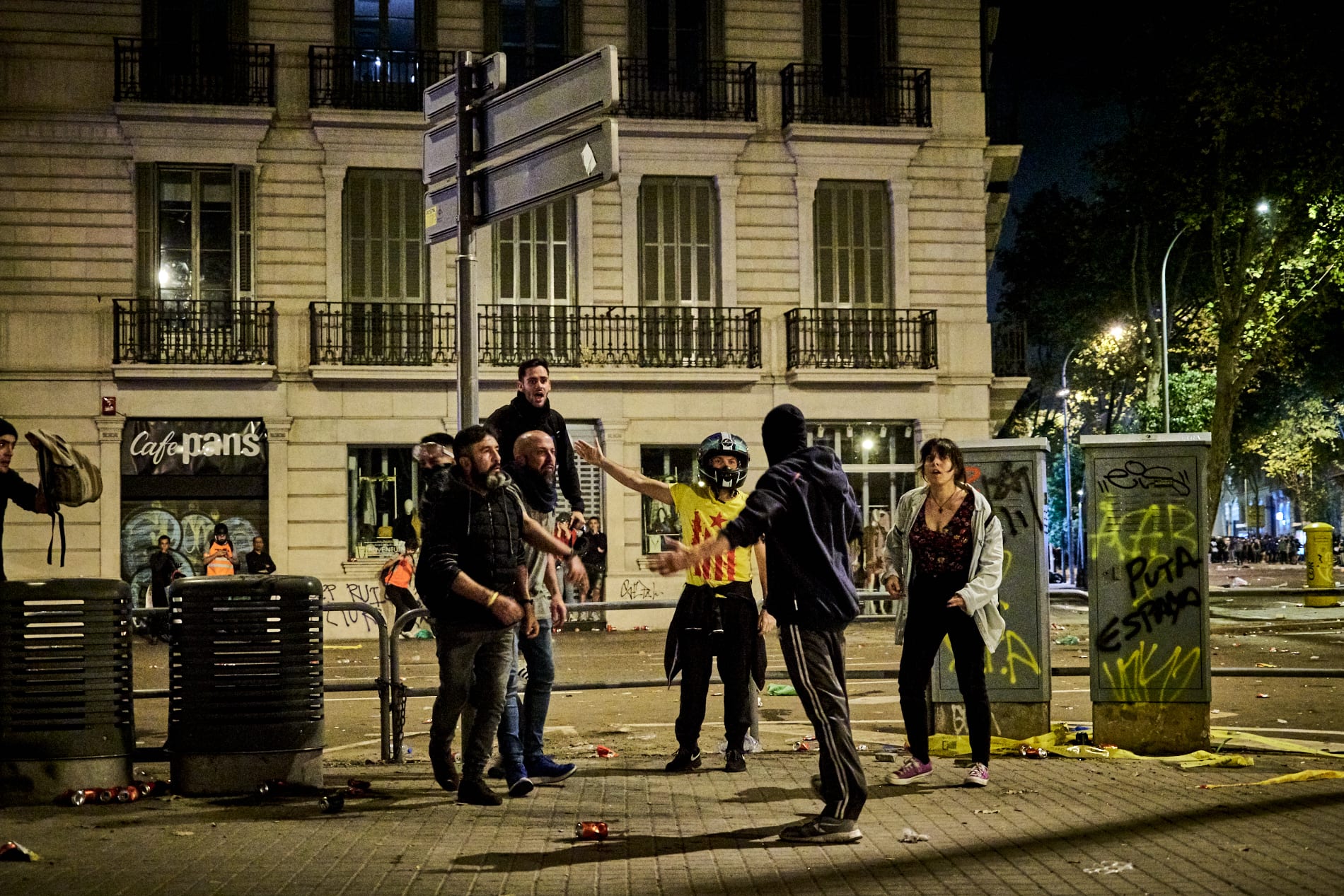
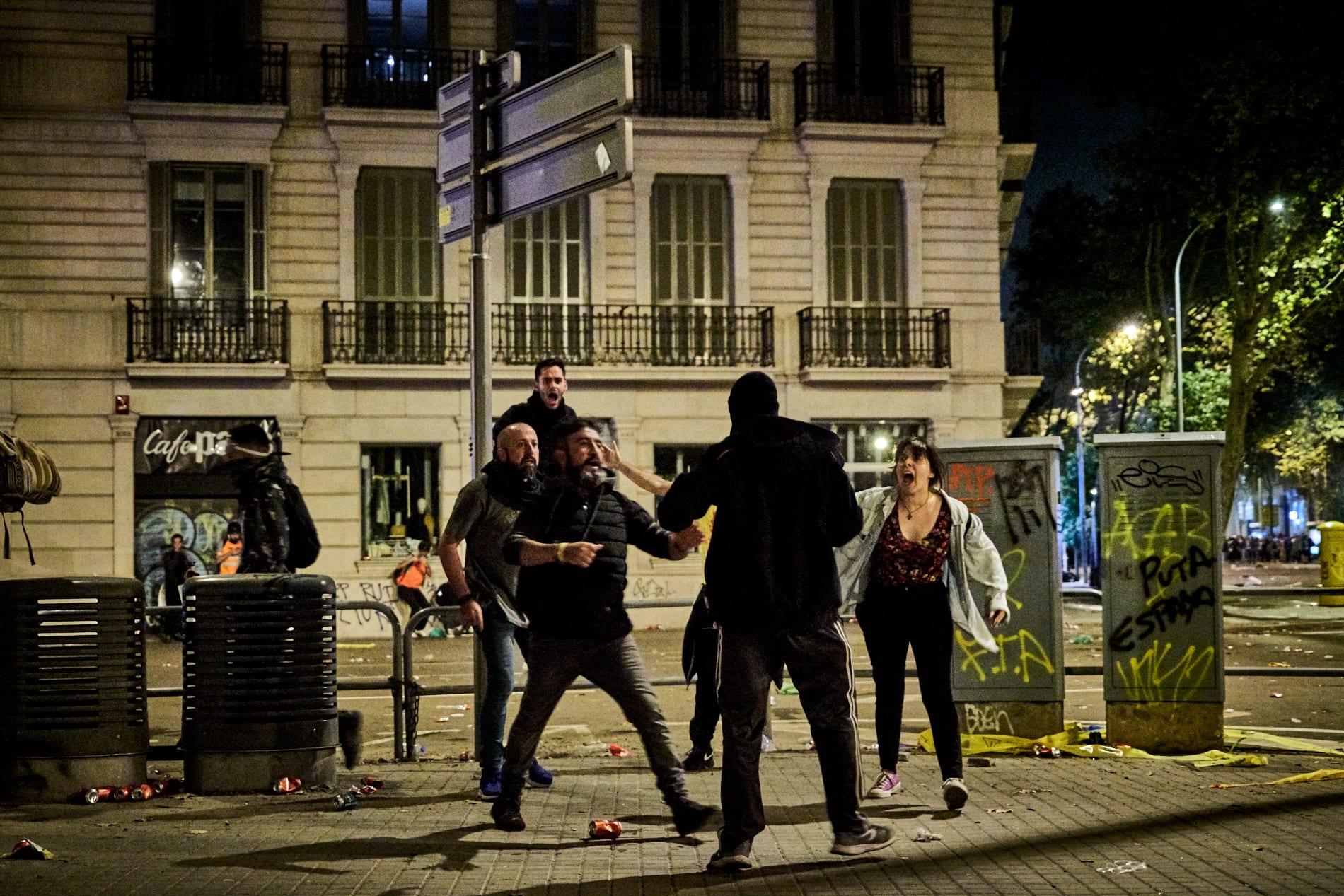
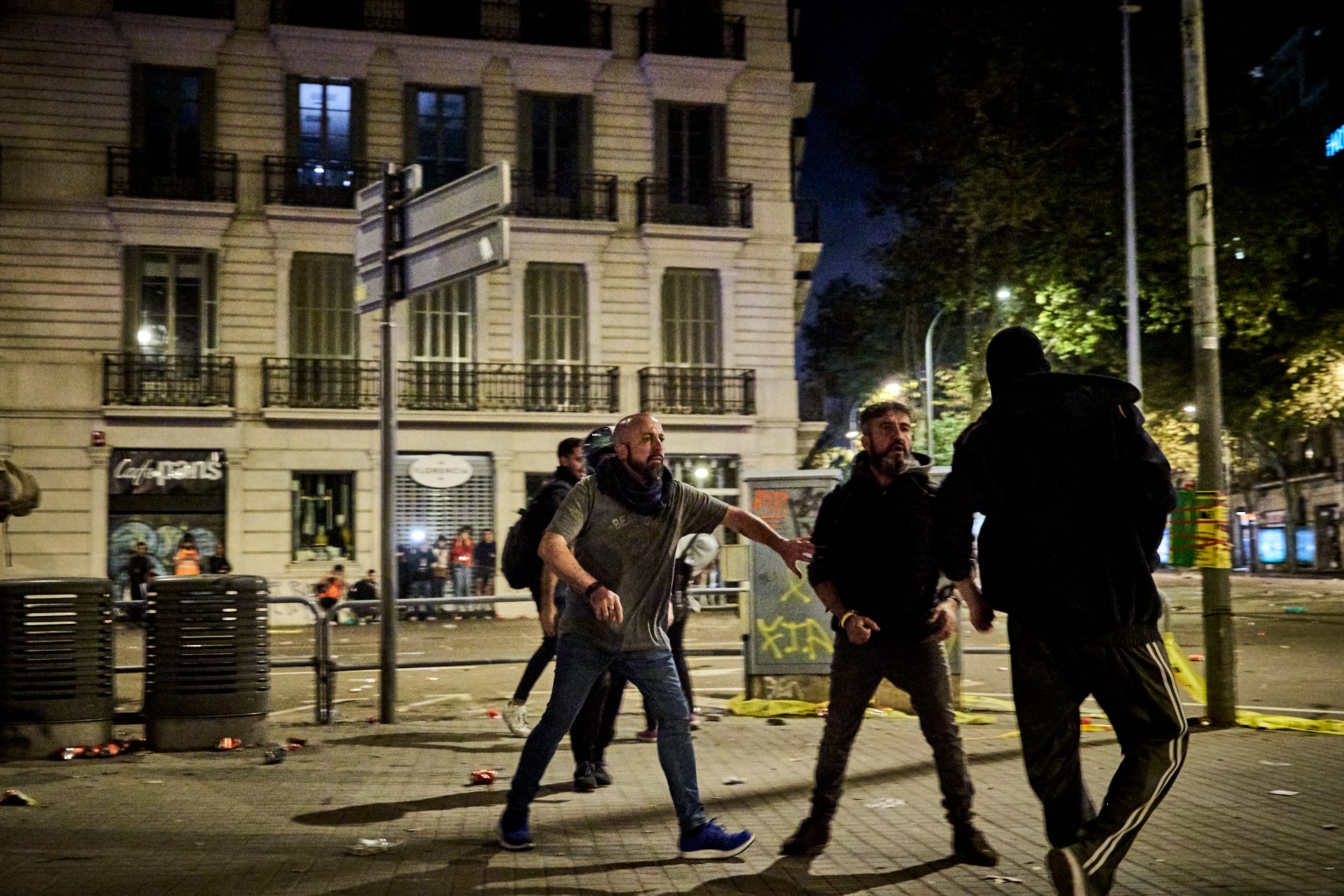
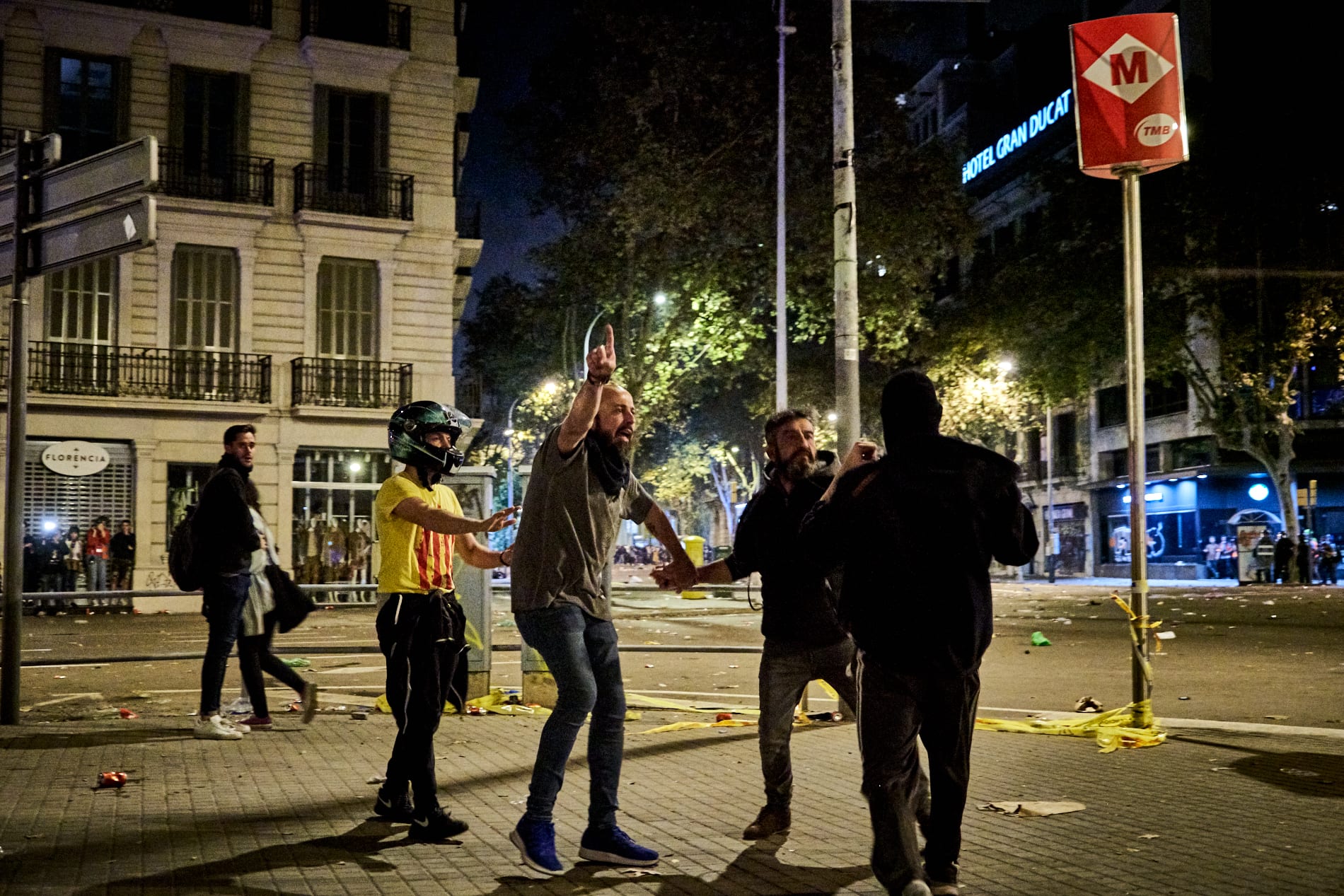
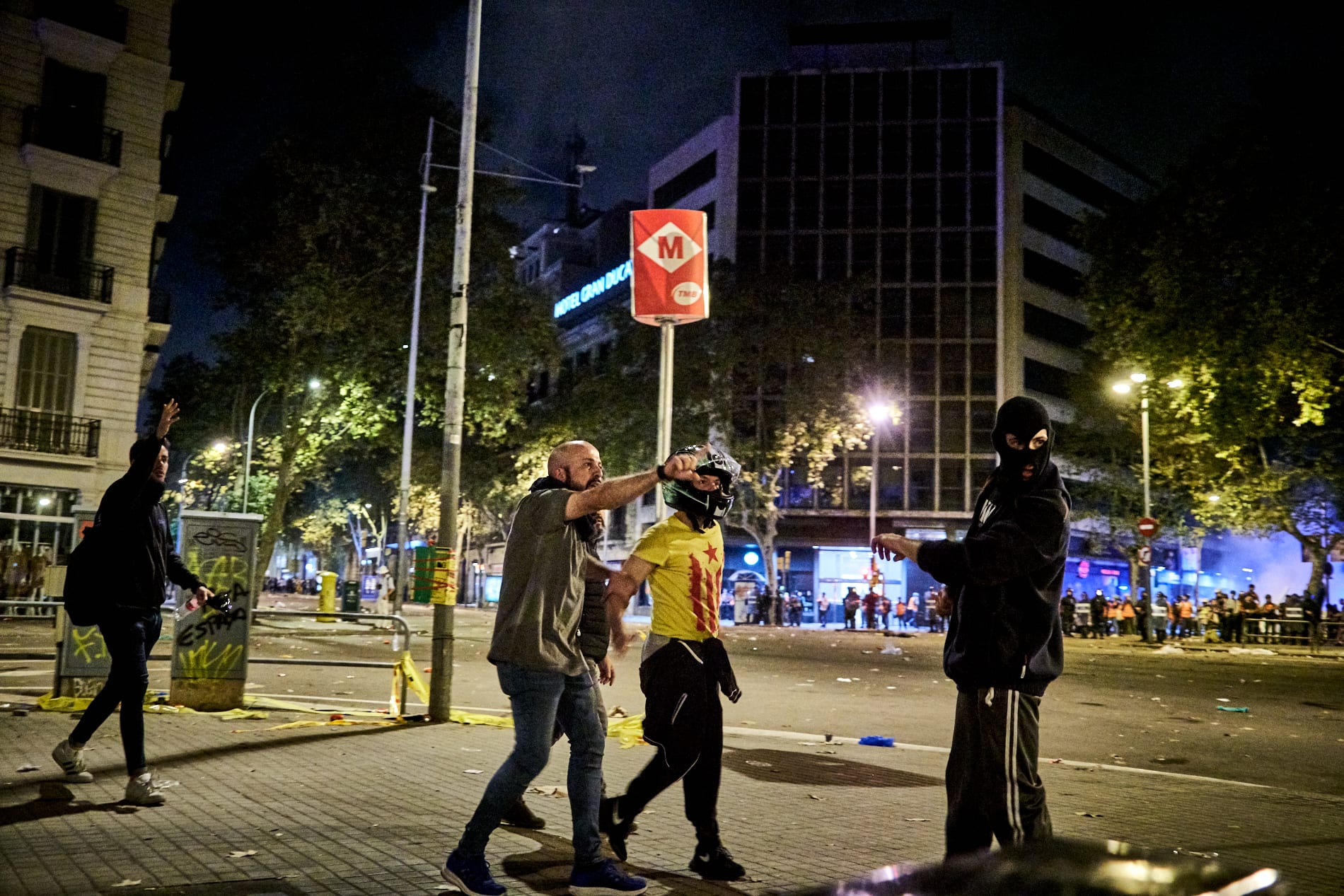
There is another Catalonia that did not appear in international media those days. The Catalonia that did not take the streets to protest nor has broken the normality. A Catalonia that also feels as Spanish and that represents approximately half of the population. 46.2% of Catalans want Catalonia to remain part of Spain, compared to 46.1% of those who wish it to be an independent state, according to a 2018 survey. Compared to these two blocks, 7.7% who do not know or do not have an opinion.
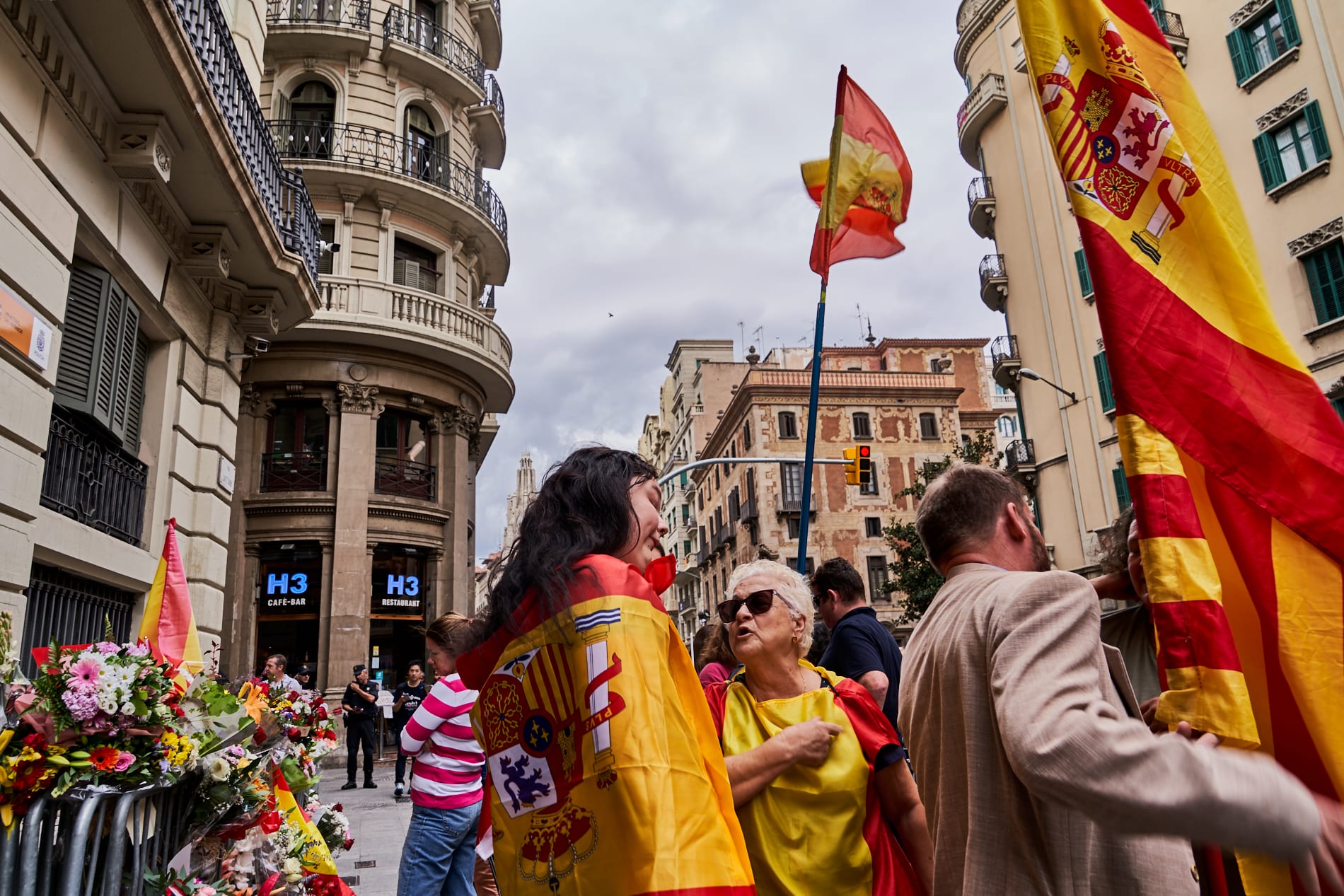
Although this survey shows a Catalan population divided into two opposite poles, since at least 2012 there is a clear majority in the Catalan Parliament in favour of the so-called right to decide and since 2015 a pro-independence majority that, in 2017, called for an independence referendum and declared Catalonia as an independent state.
After the serious riot during the general strike on October 18, 2019, in which a policeman was seriously wounded, a group of people went to the headquarters of the Spanish police in Barcelona on the morning of Sunday, October 20, 2019, to congratulate and support the security forces.
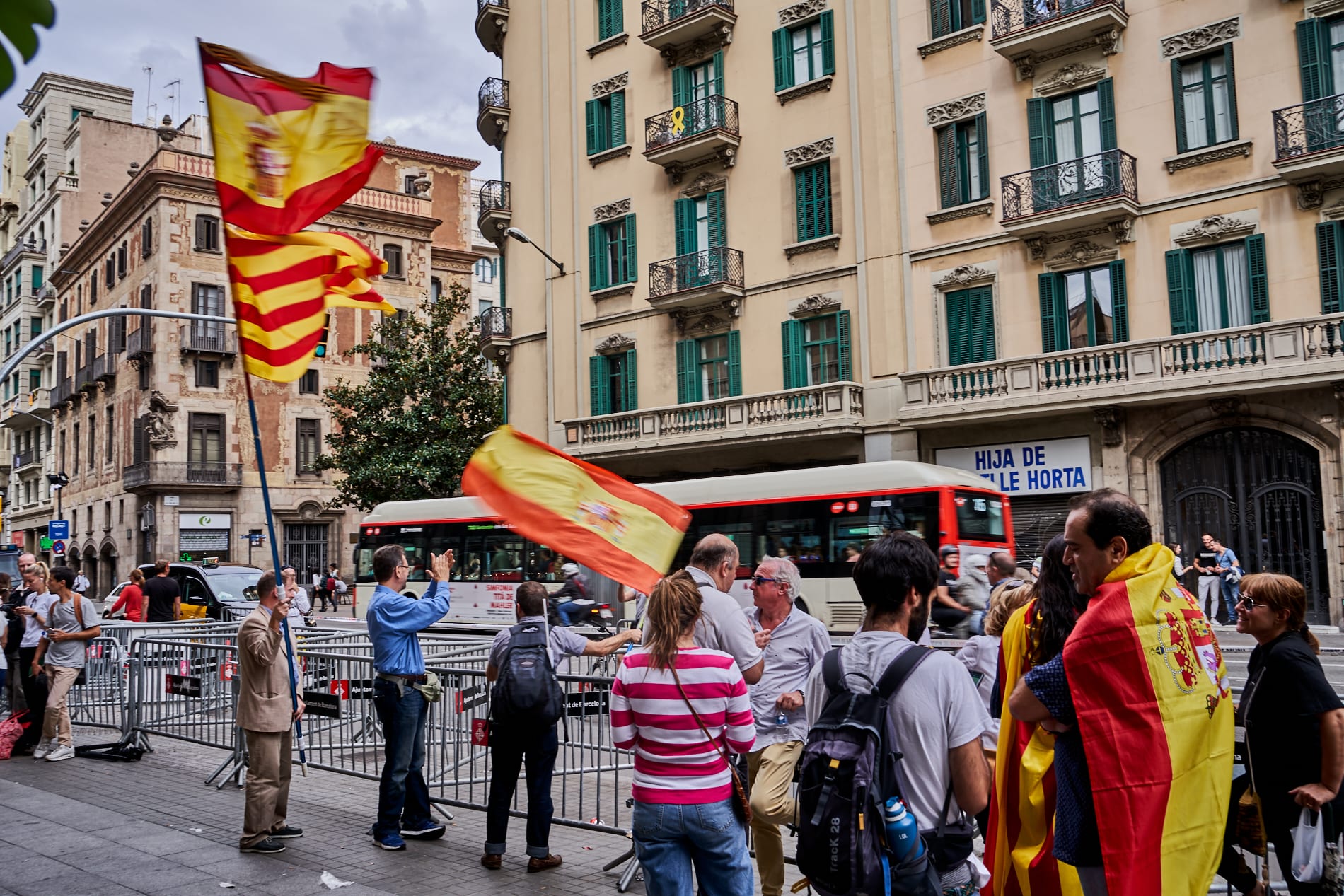
Dressed with the Spanish flag, they were given bunches of flowers and pizzas. Some of the cars that pass in front whistle to support the Spanish police. Some separatists criticise them from the other side of the street.
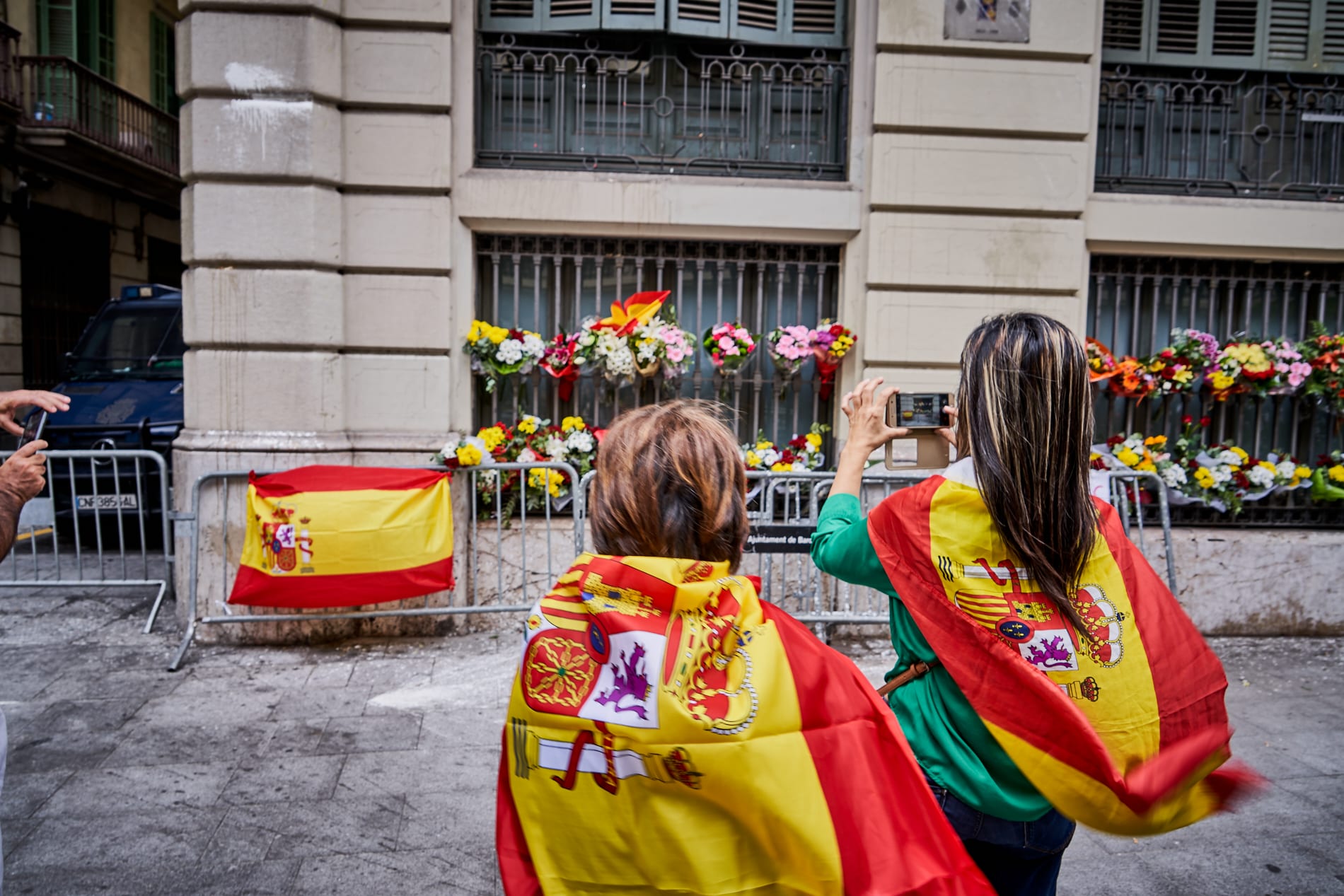
As in the protest for the Catalan republic, many do not want to give their name or be photographed for fear of reprisals by the pro-independence activists. The one who does show his face is Félix García, a middle-aged neighbour from Barcelona, who came to support policemen „who are risking their lives”, to whom he has given a bouquet. His assessment of the Spanish Supreme Court’s sentence is that it should have been tougher on subsequent events because „the cause of these riots are those who are in jail”. Garcia calls for action from the Spanish government and wants the law to be enforced and „to do what has to be done to stop all this”.
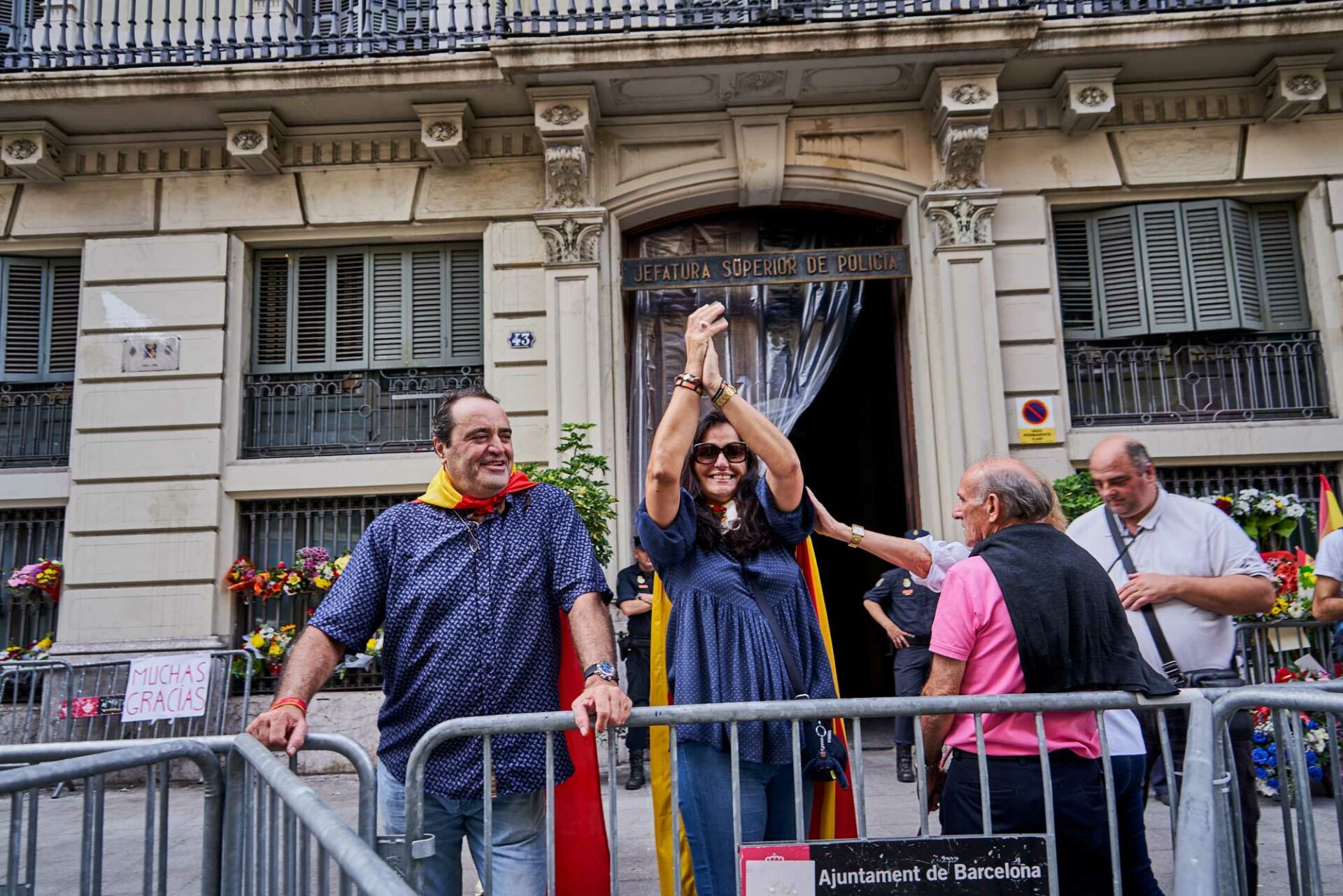
„We have to stop the Catalan government”, asks Félix García, who believes that the pro-independence people are „very violent” and make afraid those who feel Spanish in Catalonia in a „fascist” way. Nevertheless, García believes that support for independence is beginning to decline after years on the rise.
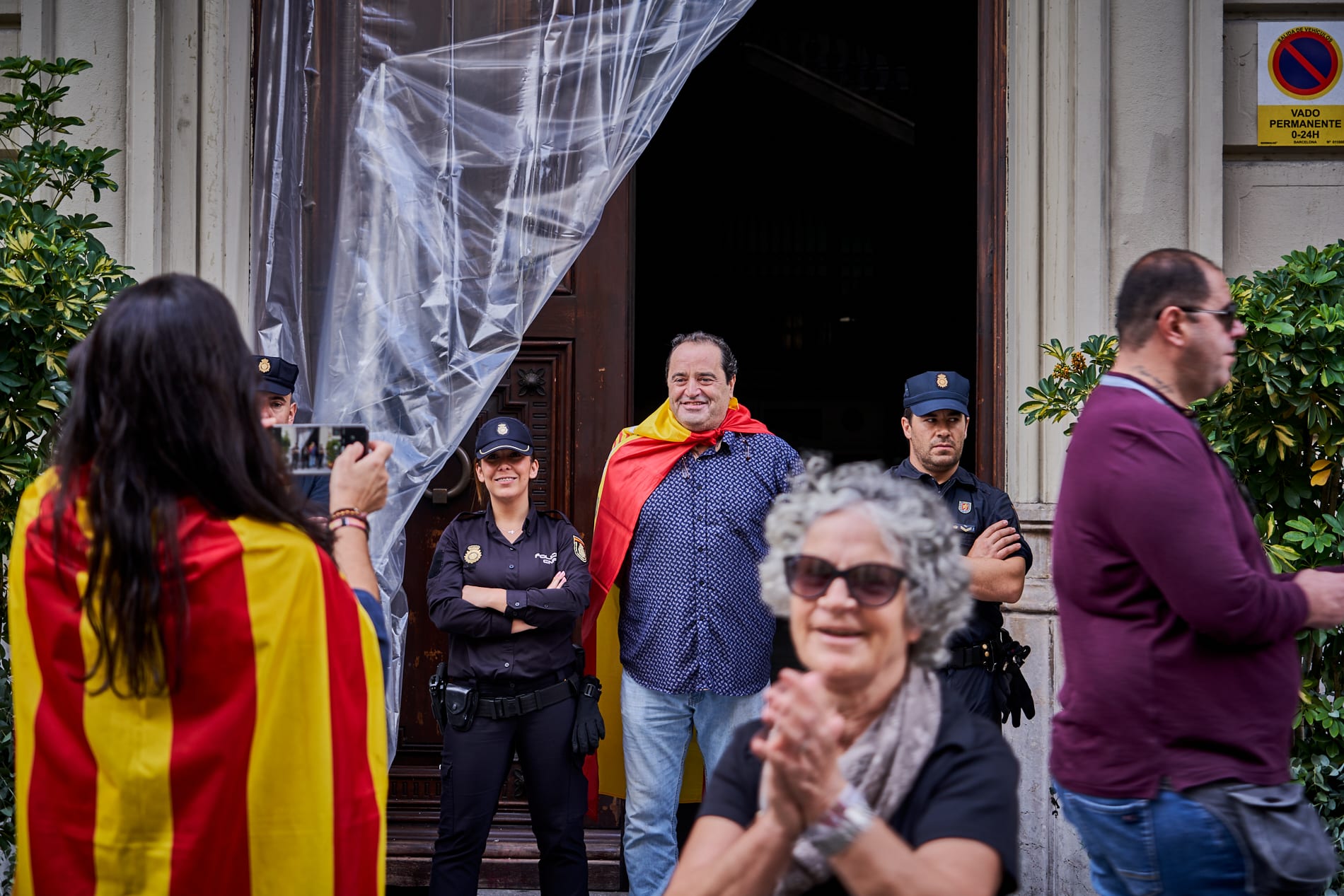
For the Spanish nationalists interviewed in front of the headquarters of the Spanish police, a hypothetical and for them impossible independence would mean the ruin of Catalonia and the flee of the big companies that continue to operate in the region.
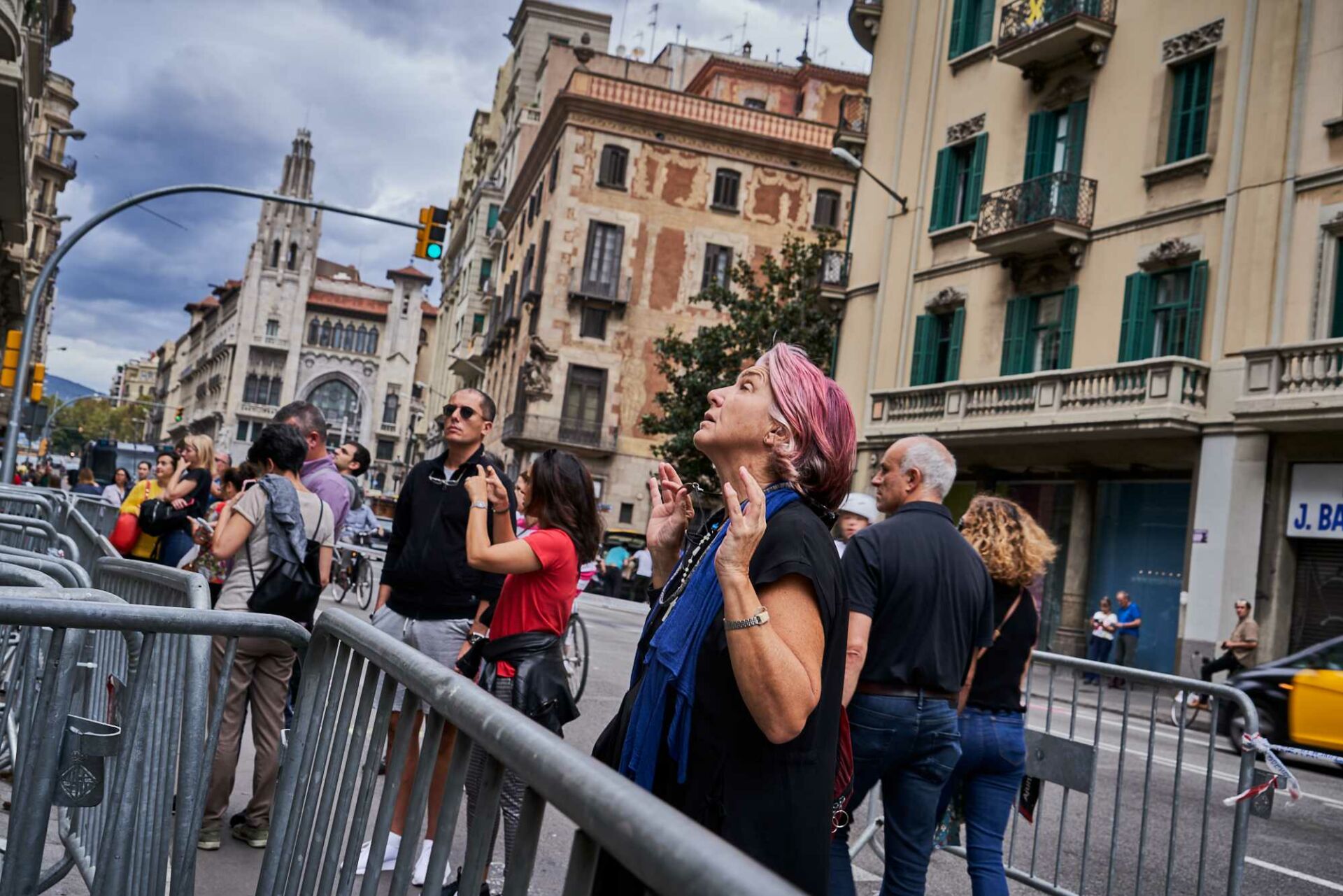
Mari Carmen Lorenzo Fernández, a woman in her 60s from Barcelona who runs a business with her husband, blue hair, eyelashes and eyes painted in the same colour, came to show her support for police officers who „have their hands tied by the Spanish government.”
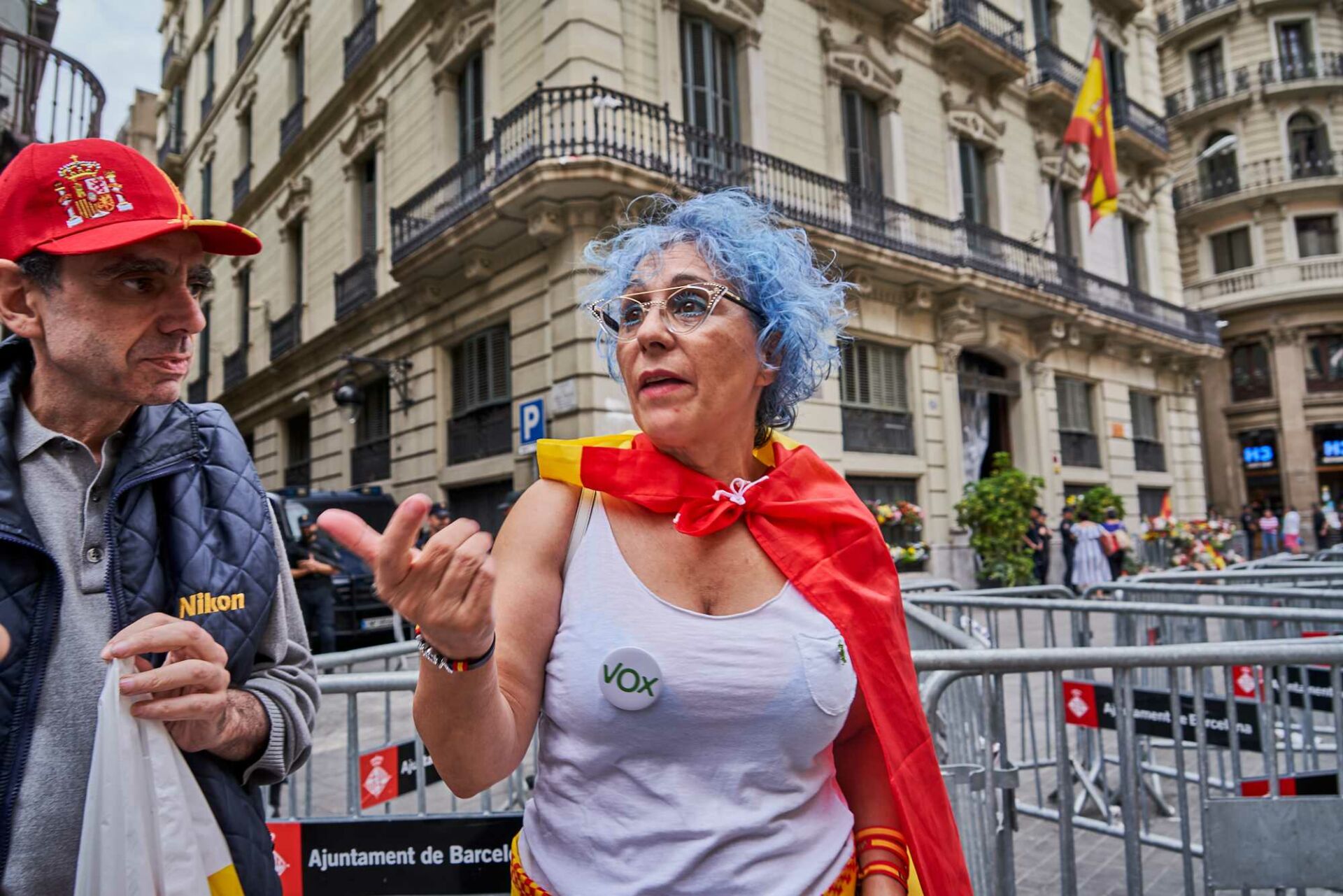
This voter, affiliate and candidate of the far-right party Vox, is frustrated by not being able to do anything in the face of violence that made her cry the whole week. The elimination of autonomies, not only in Catalonia but throughout Spain, is the solution to the conflict for Mari Carmen Lorenzo, who is also a former Spanish taekwondo champion.
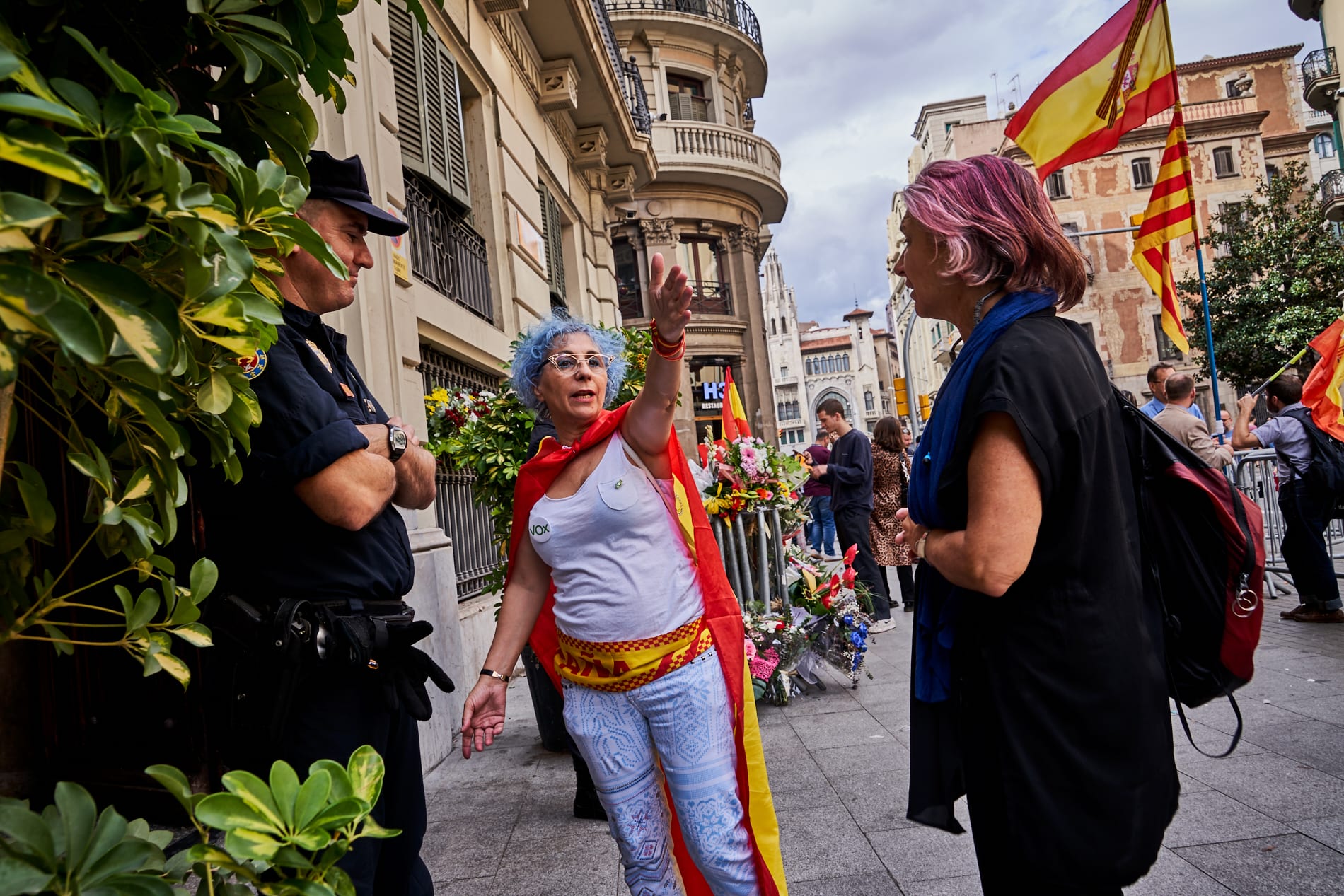
Inhabitants versus riots
A sudden noise on the other side of the square draws the attention of demonstrators standing nearby.
A masked group of people carries garbage bags, buckets, pots and builds a barricade. They are about to set it on fire.
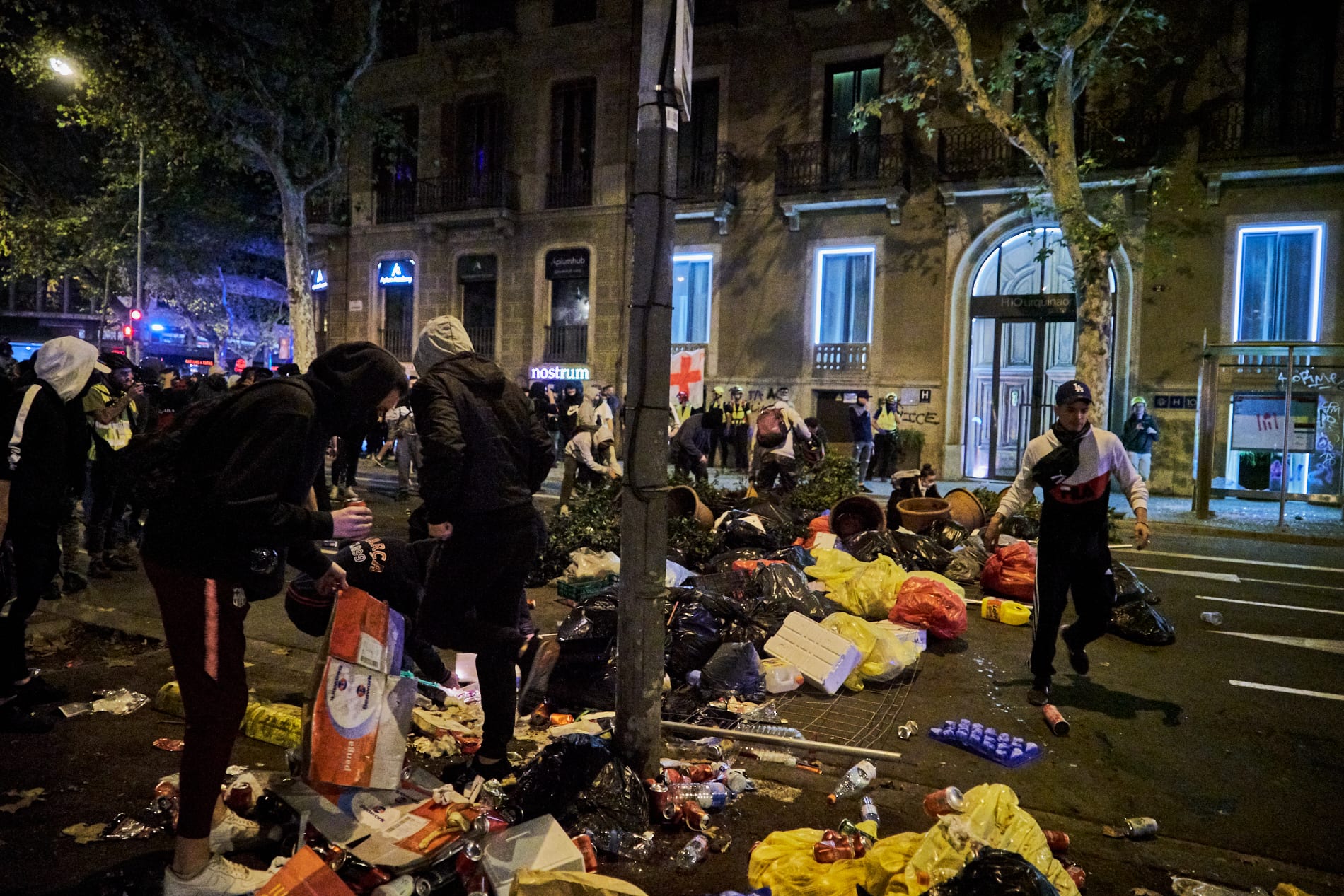
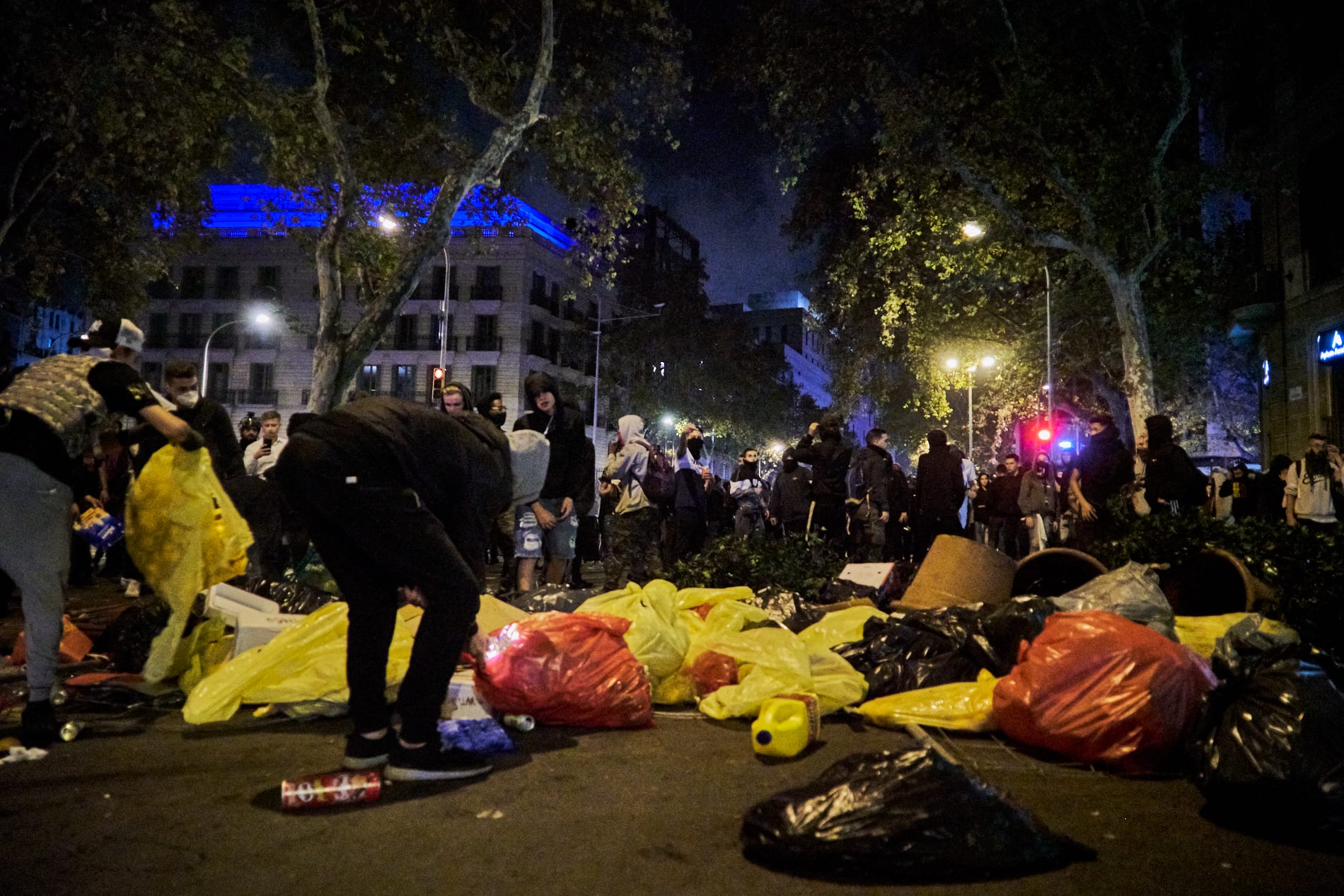
Suddenly, a woman living in the neighbouring building appears, starts arguing and protesting against the barricade being erected.
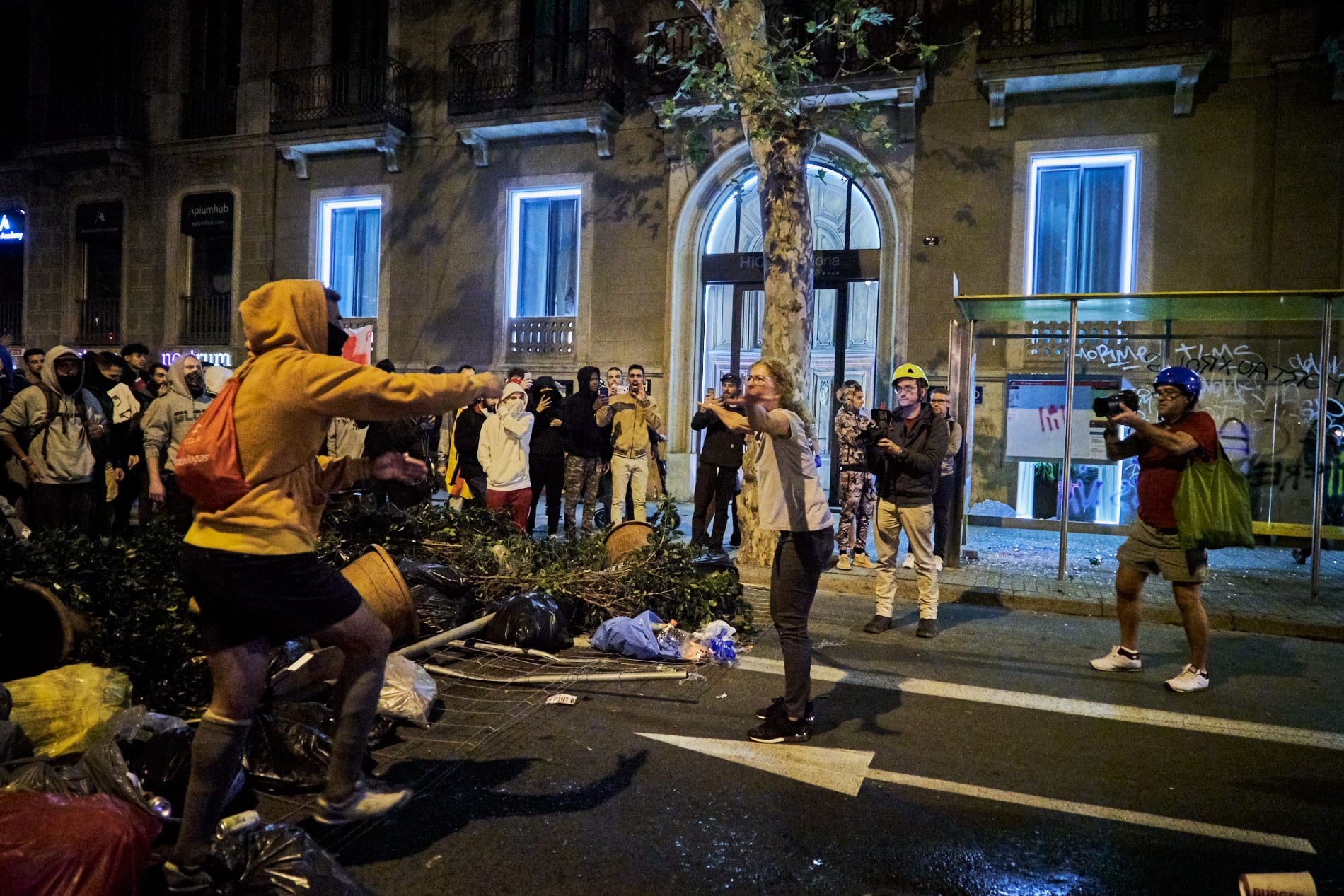
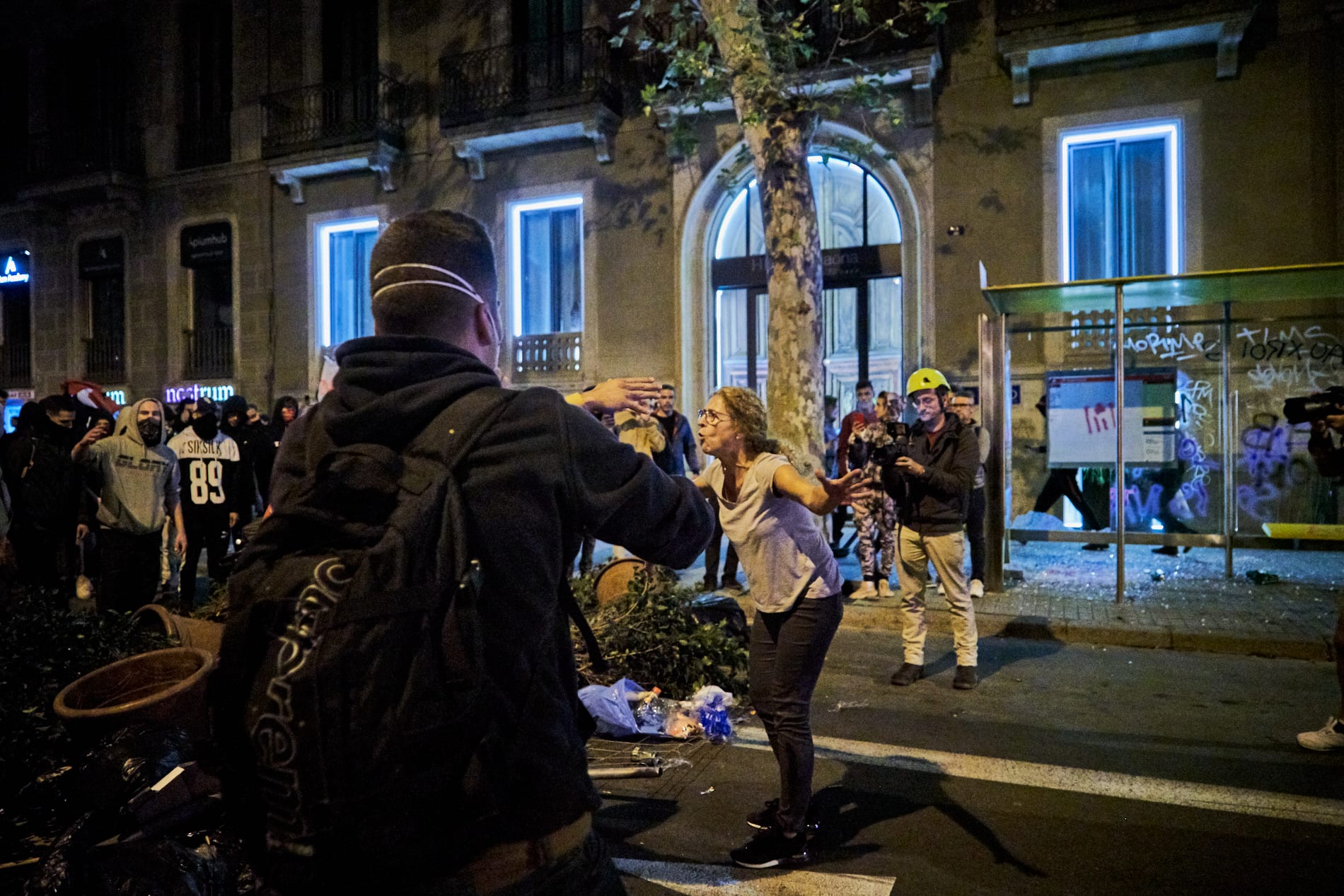
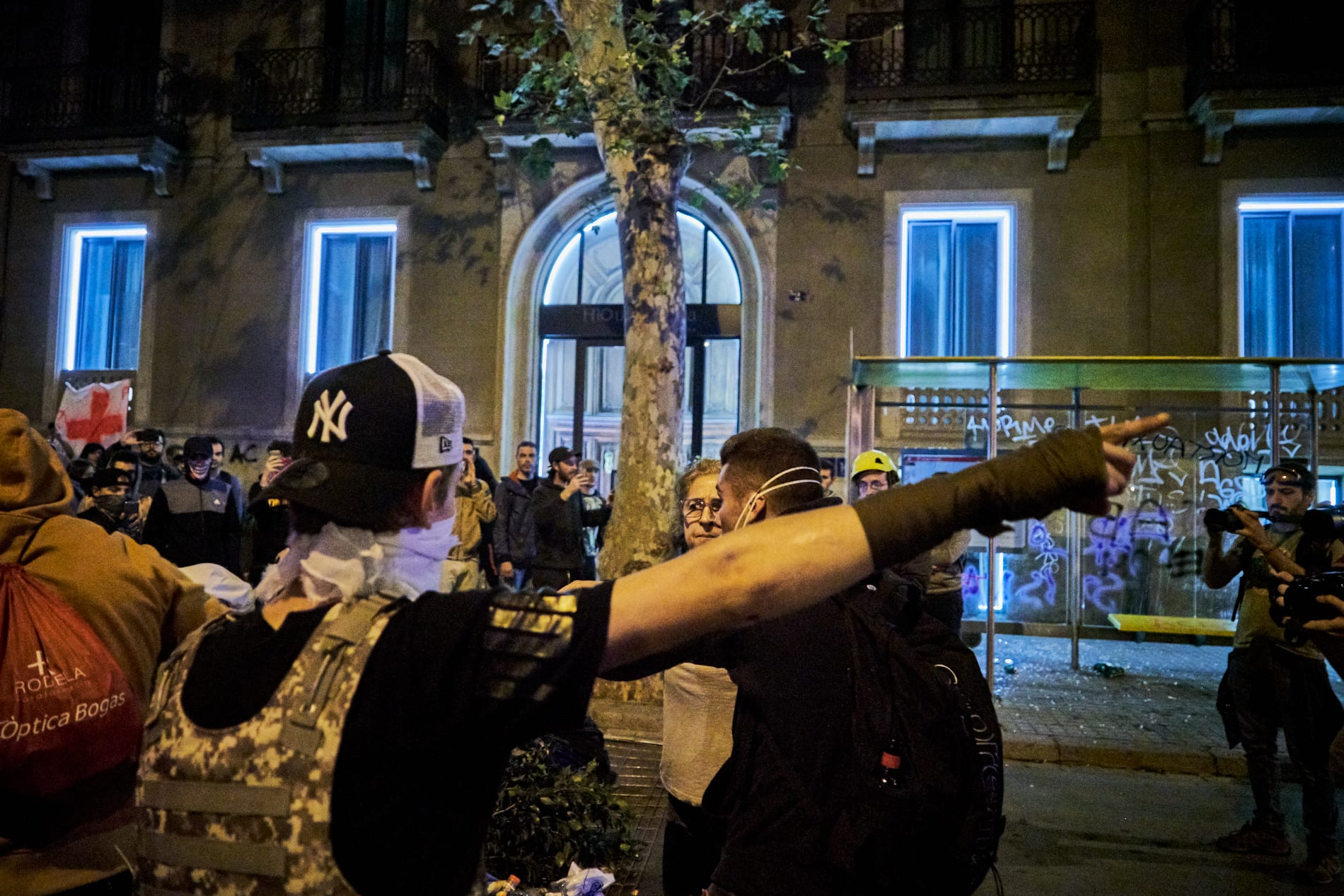
They argue and discuss.
More and more demonstrators come around.
After a while, the masked group is convinced and removes the barricade.
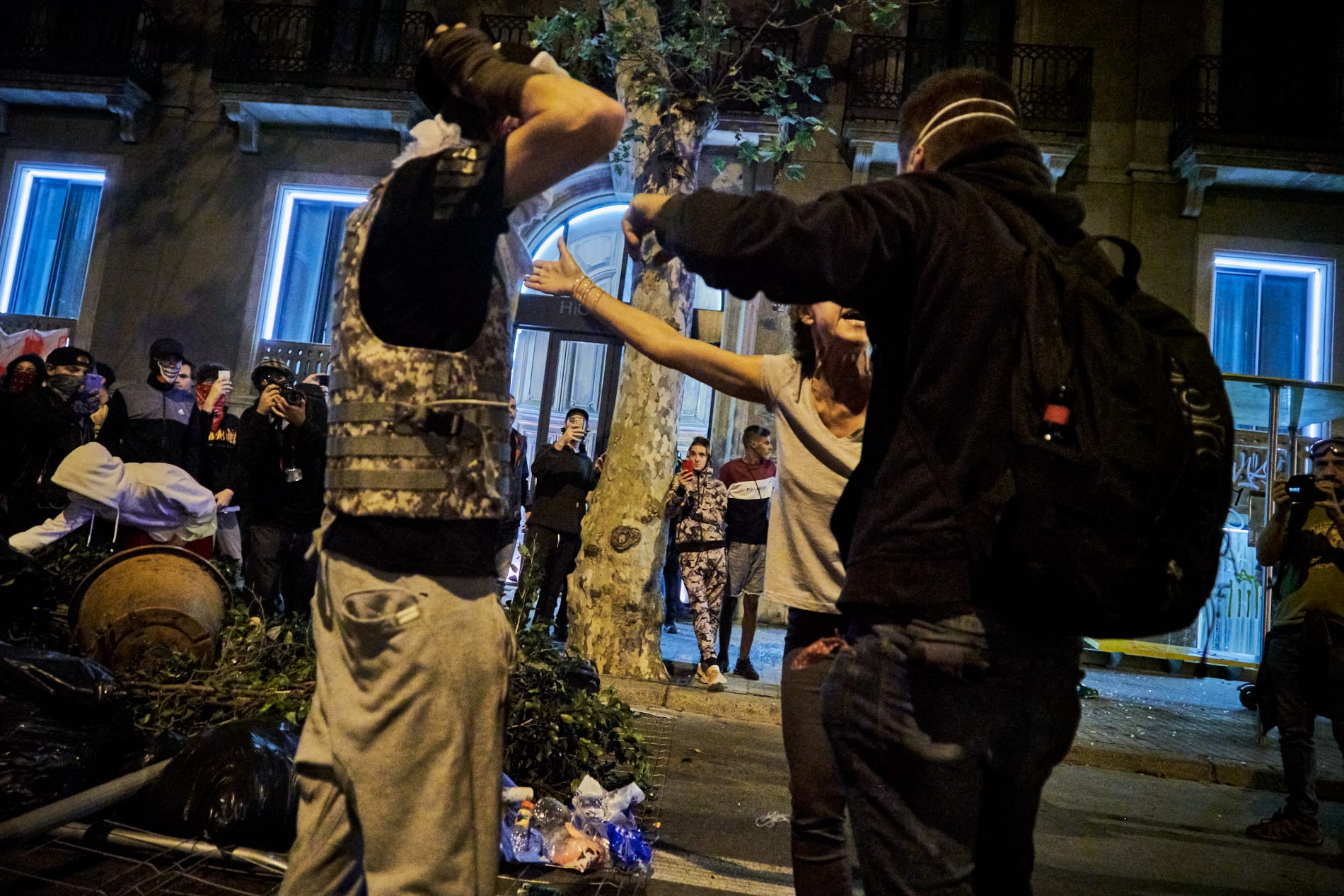
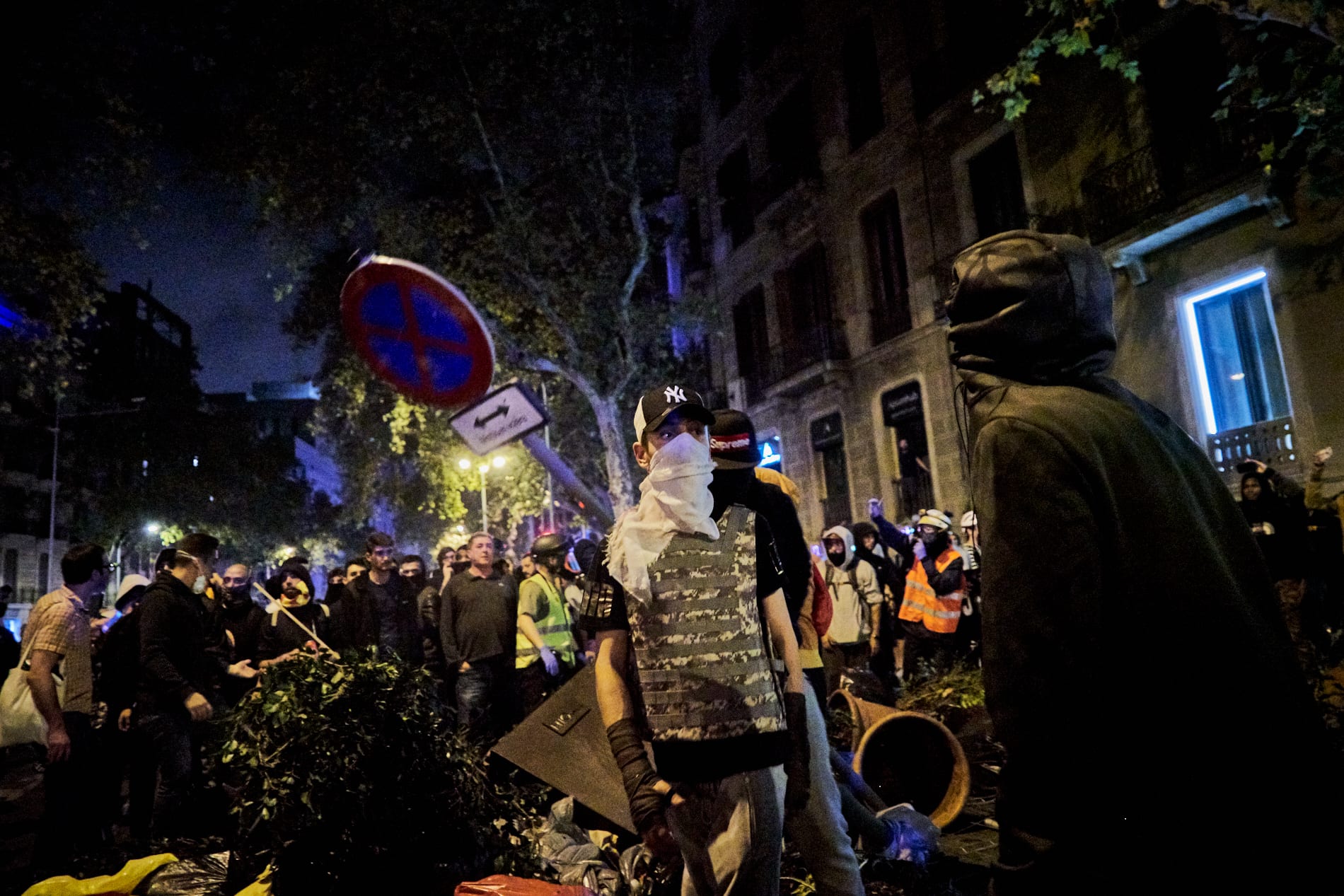
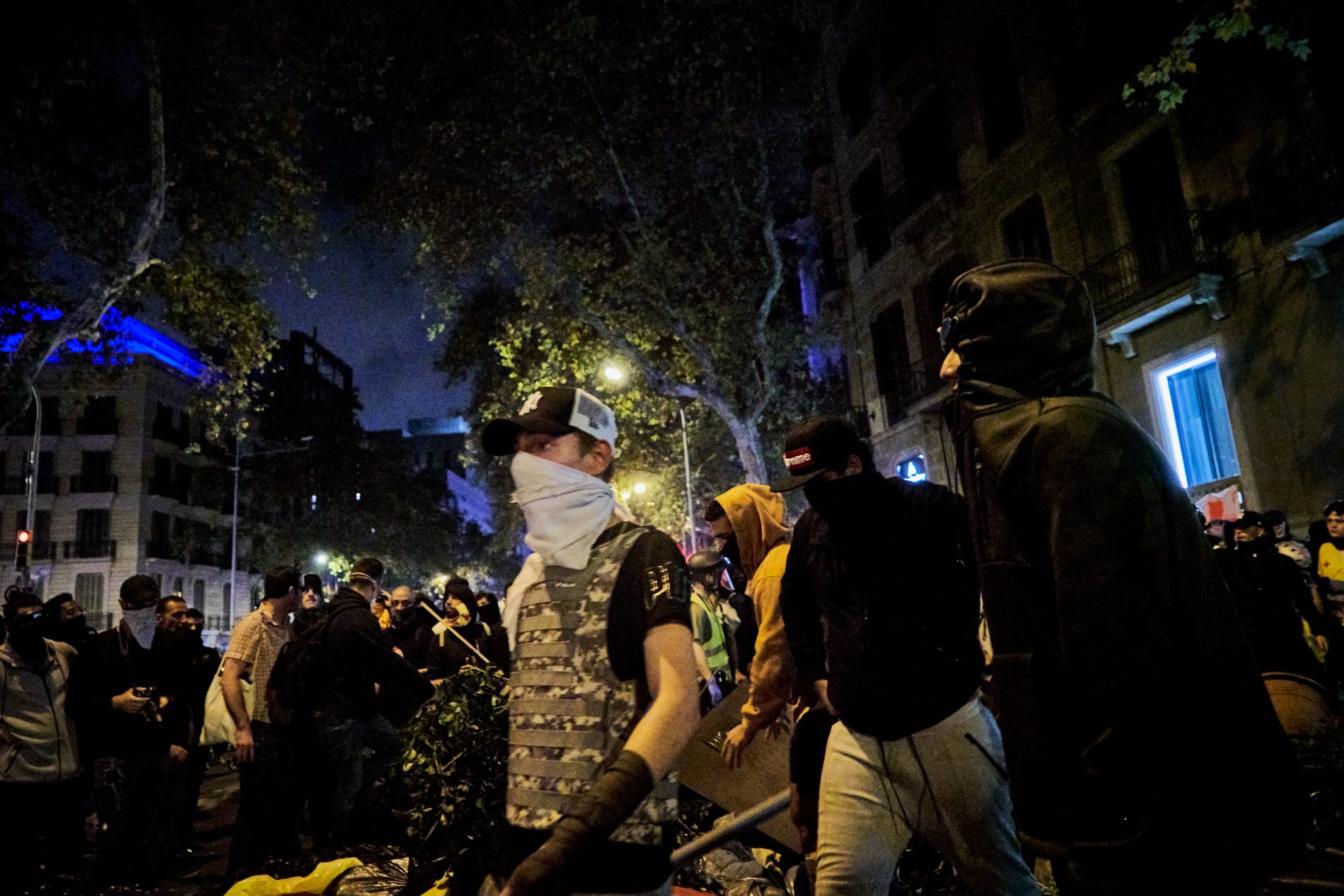
Ten minutes later and 60 meters away,
a new barricade is in flames,
just around the corner.
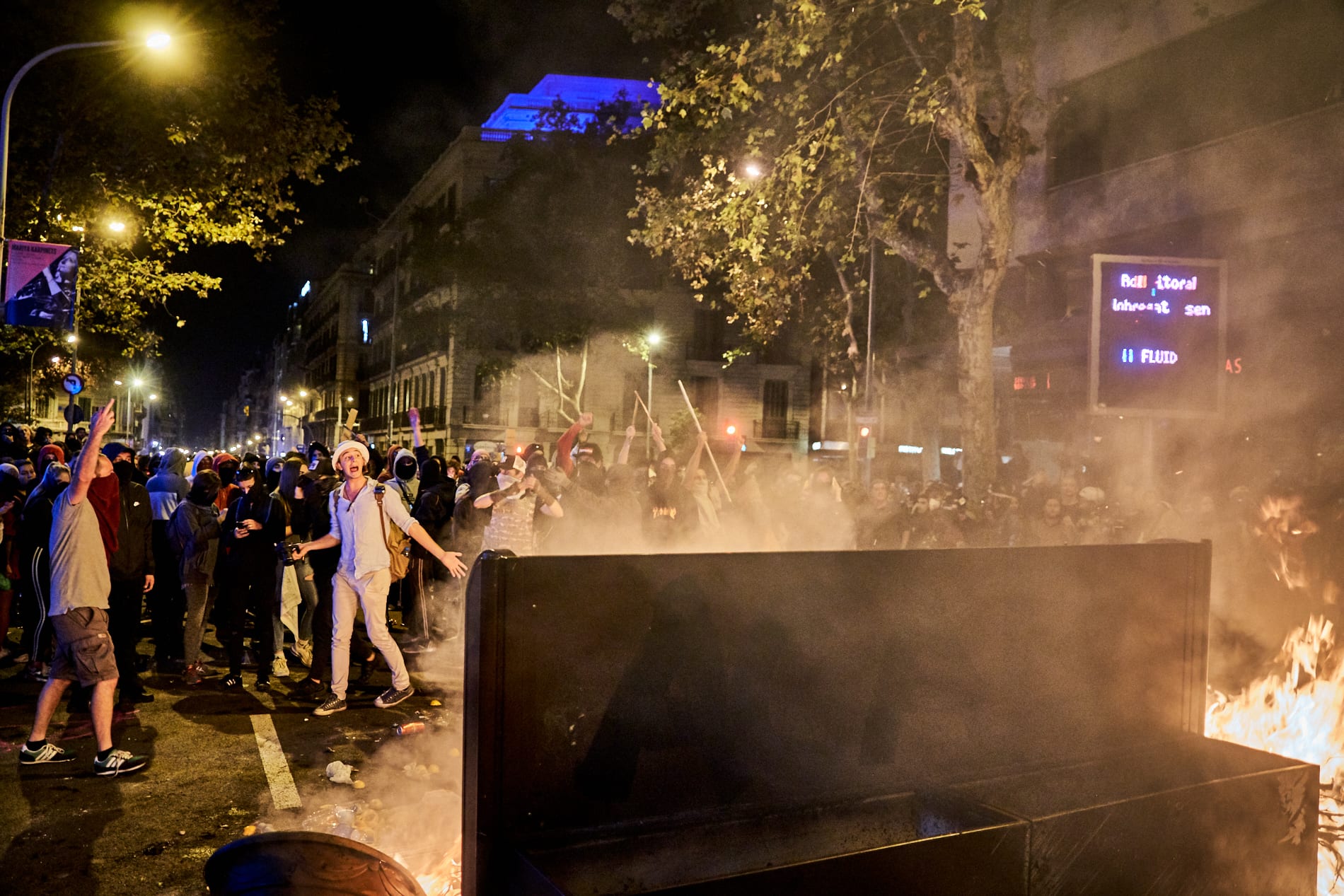
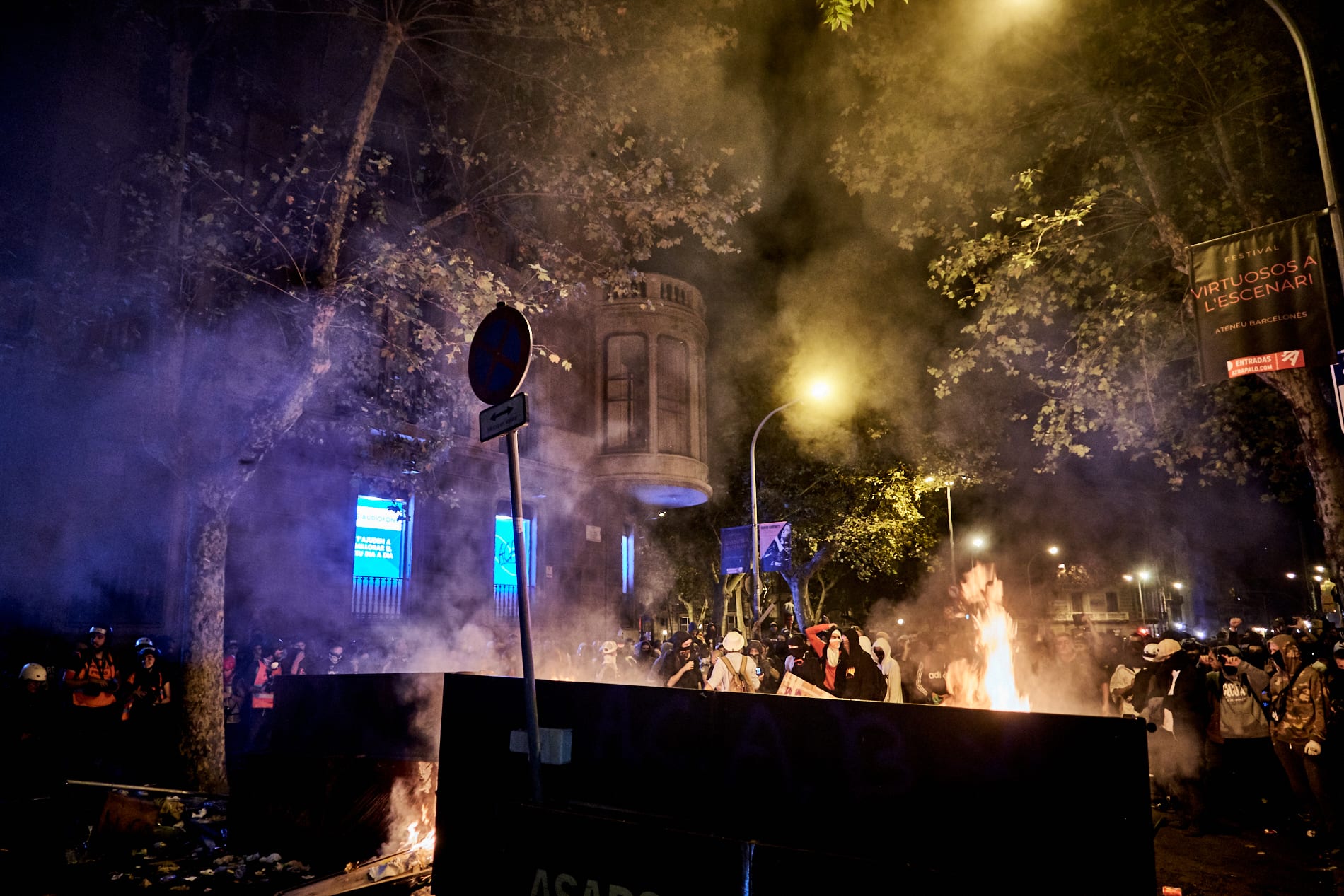
In that week of October in Catalonia, there were: 205 detainees, 31 people in provisional prison and 593 injured, of which 289 were police officers, according to official data. Four people lost an eye due to the rubber bullets used by the Spanish police. On an economic level, the damages of only that week of protests in the city of Barcelona amounted to 3.1 million euros. One thousand forty-four containers were burned, according to the city council.
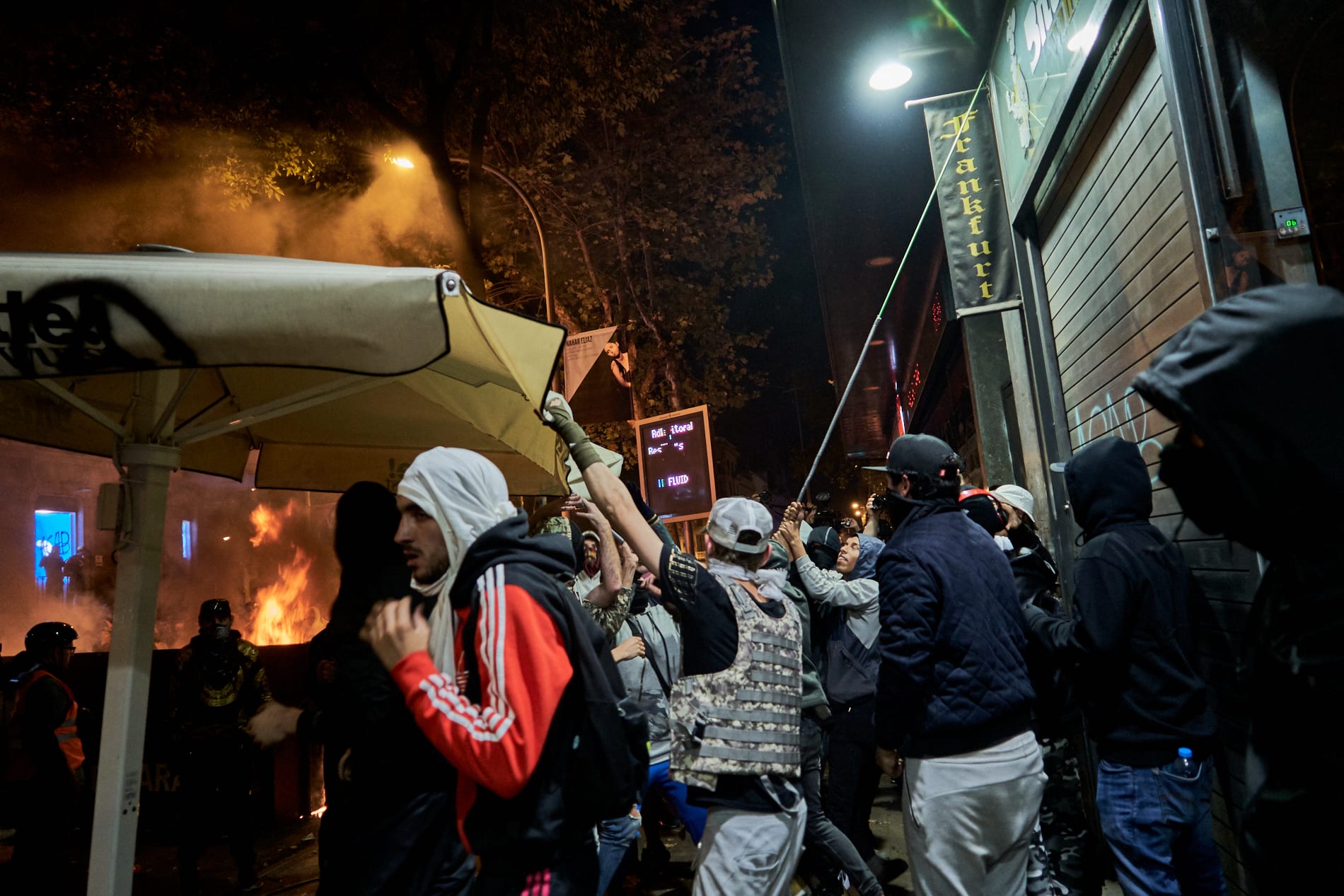
Besides from 14 to October 20, 2019, at least 65 journalists were attacked in Catalonia, 72% by the police, 8% by pro-independence demonstrators and 3% by the extreme right, which also staged small but violent protests. The remaining 17% is of unknown origin, according to the self-styled critical media observatory media.cat.
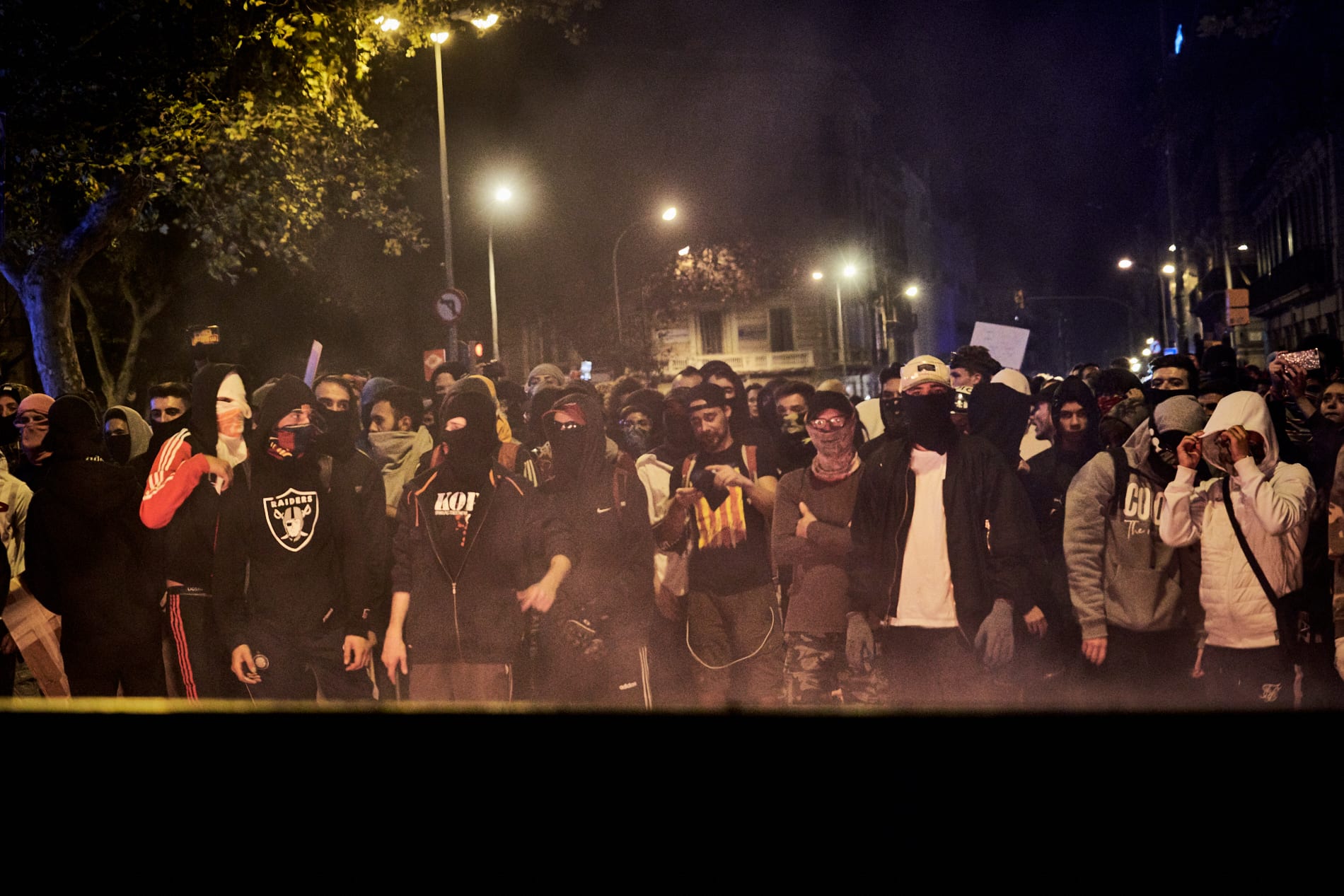
Marius Pallarés knows well the effects of police charges and riots on people. He is the founder and president of Medical Staff for the Republic, a group of volunteers equipped with helmets, protective goggles and medical equipment which take care of people who are injured or need medical help during independence demonstrations.
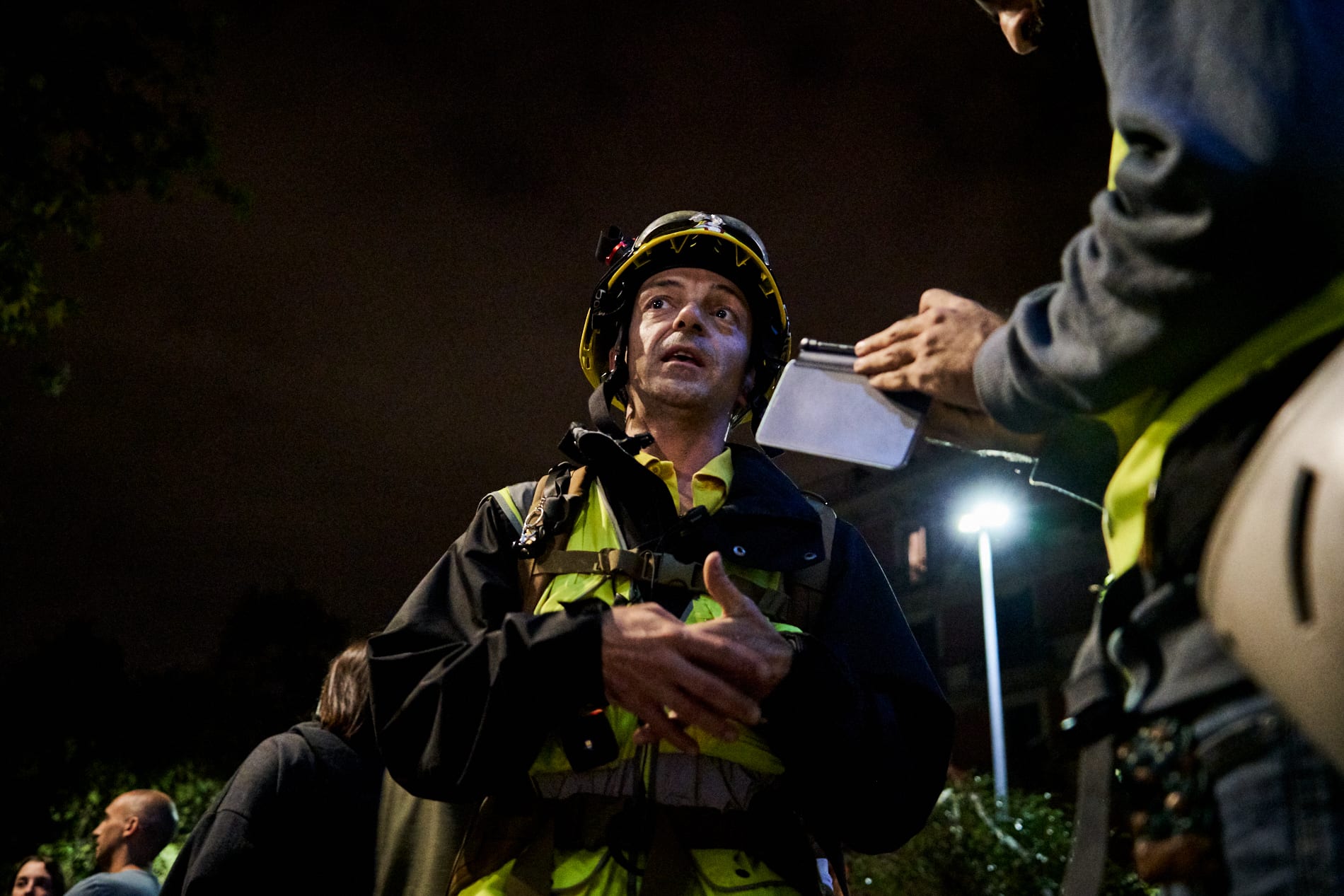
Formed by some 400 active health professionals throughout Catalonia, Pallarés estimates that they have attended to some 1,300 people since its foundation in September 2018, 720 in that week of protests. The wounds they treat are mainly contusions, although this week they have begun to treat those wounded by rubber balls, a material that is forbidden to the Catalan police since 2014 but allowed to the Spanish police.
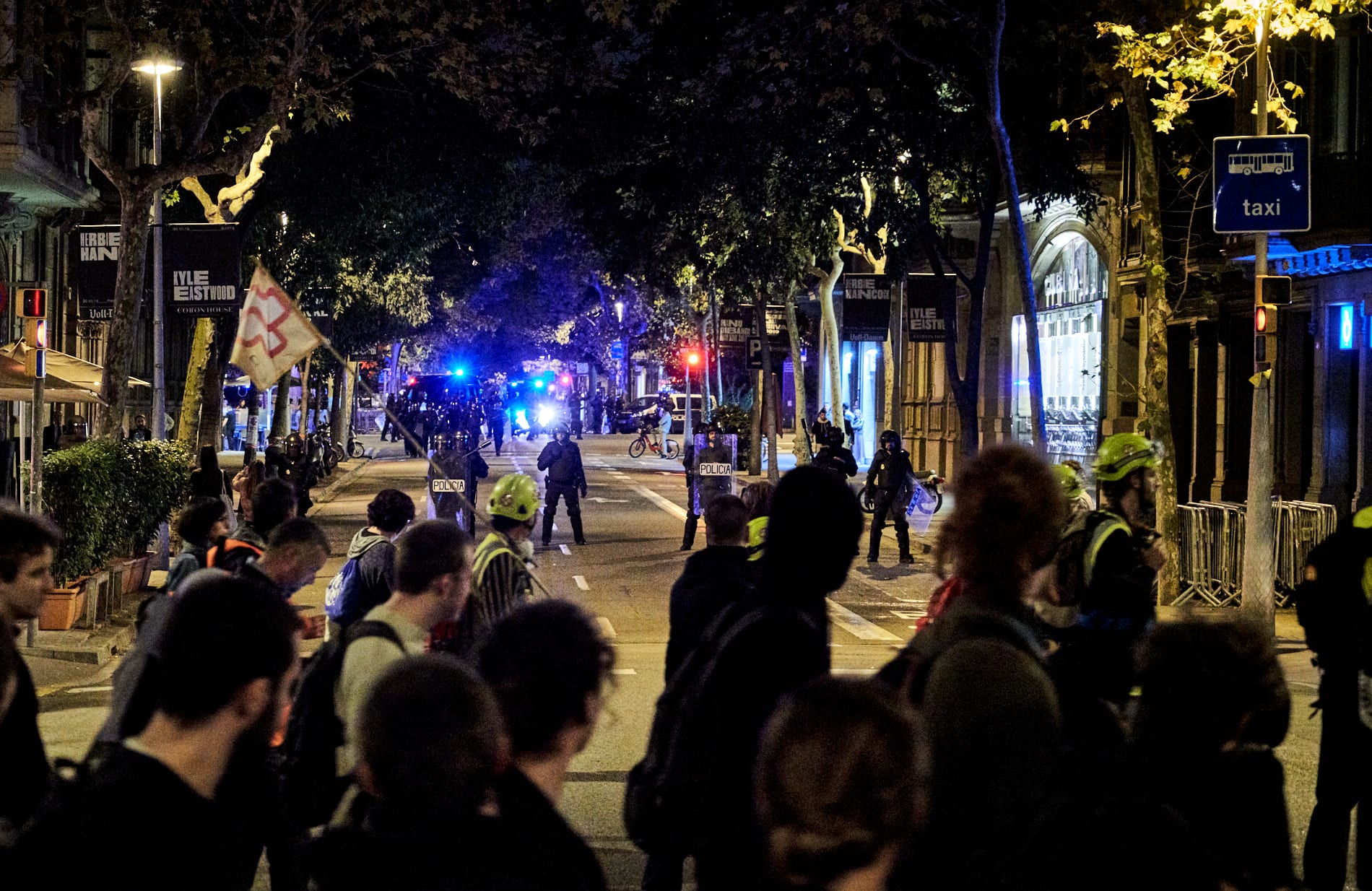
He attended to one of the four people who have lost their eye these troubled days. It happened on Monday, October 14 at Barcelona Airport, an infrastructure that the self-called Democratic Tsunami called to stop. They managed to cancel 110 of the 1066 flights scheduled. Pep Guardiola, the coach of the English football team Manchester United, read a statement in English in which he asked for support from the international community in the face of „an authoritarian drift” in Spain. It did so on behalf of the Democratic Tsunami and was broadcast on BBC, Agence France Presse and Catalan public television.

This action in response to the sentence was called by Democratic Tsunami, a new piece on the chessboard of independence. Through social networks and an app, this anonymous entity calls itself a citizen network that proposes „a chain of forceful and coordinated actions” throughout non-violence and civil disobedience to achieve self-determination in Catalonia.
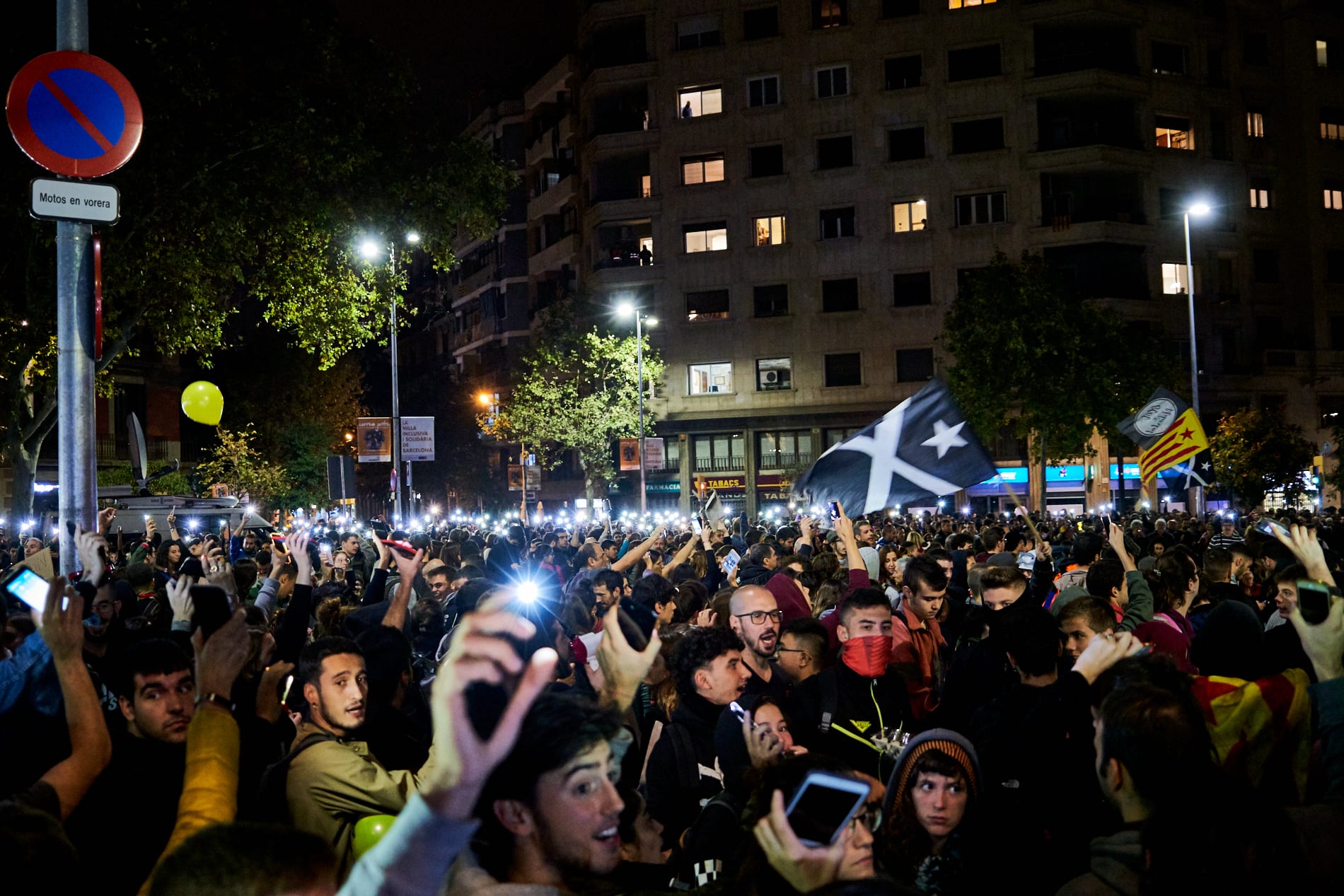
Months later, black and white chips are still trapped in a game that seems in a draw.
Two faces of protests
“And although violence has marked the media agenda, the riots have covered up massive demonstrations against the sentencing of separatist leaders.”
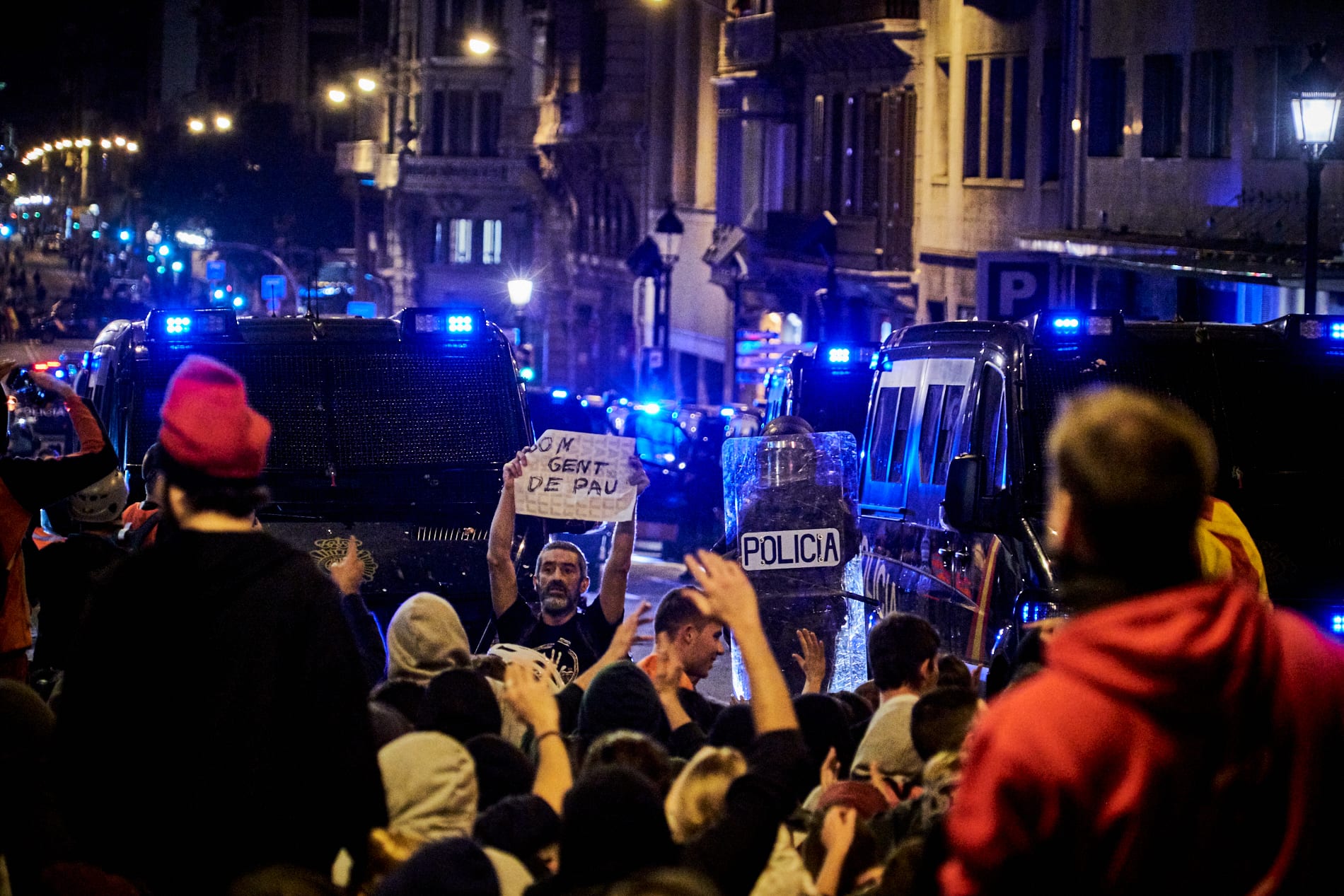
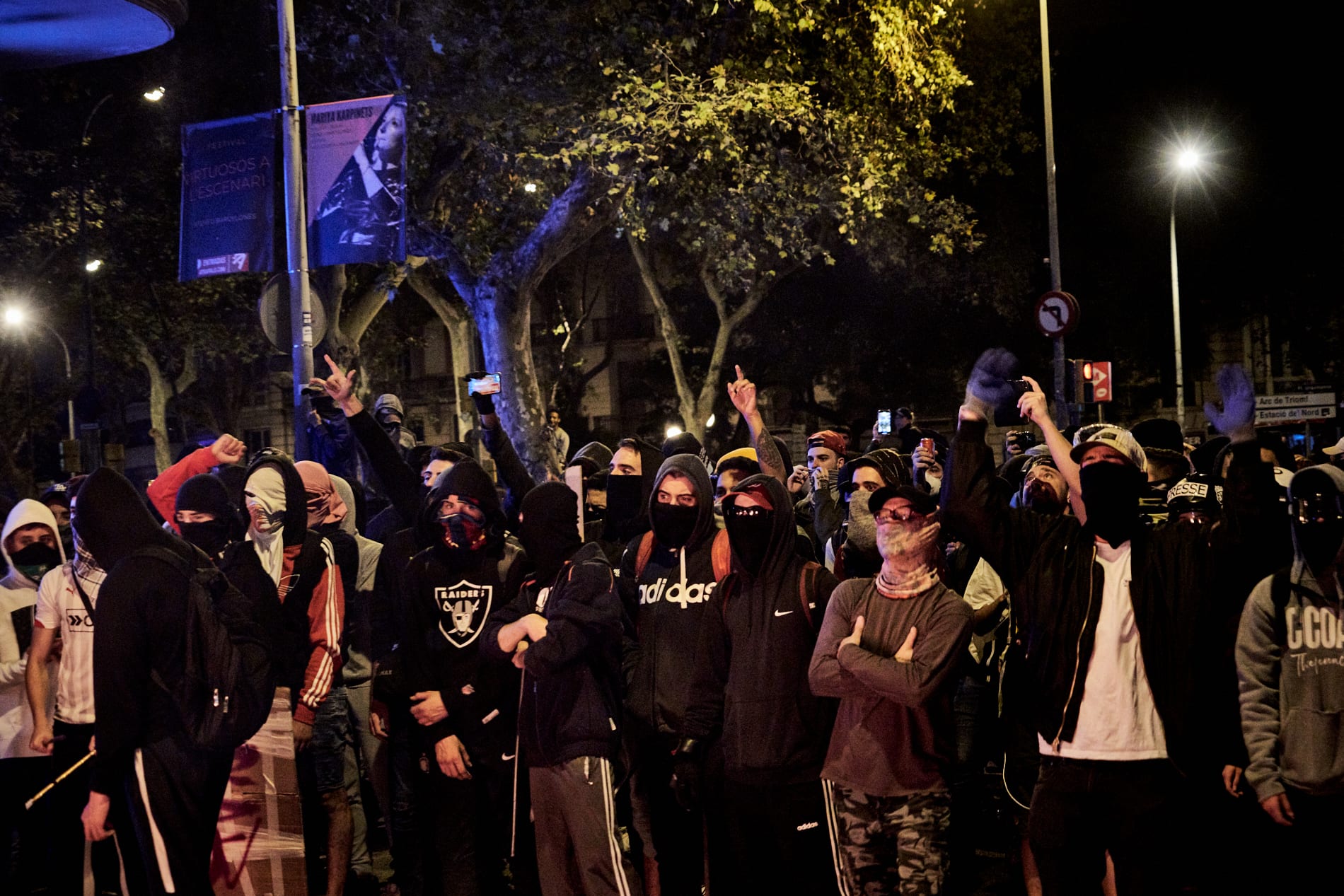
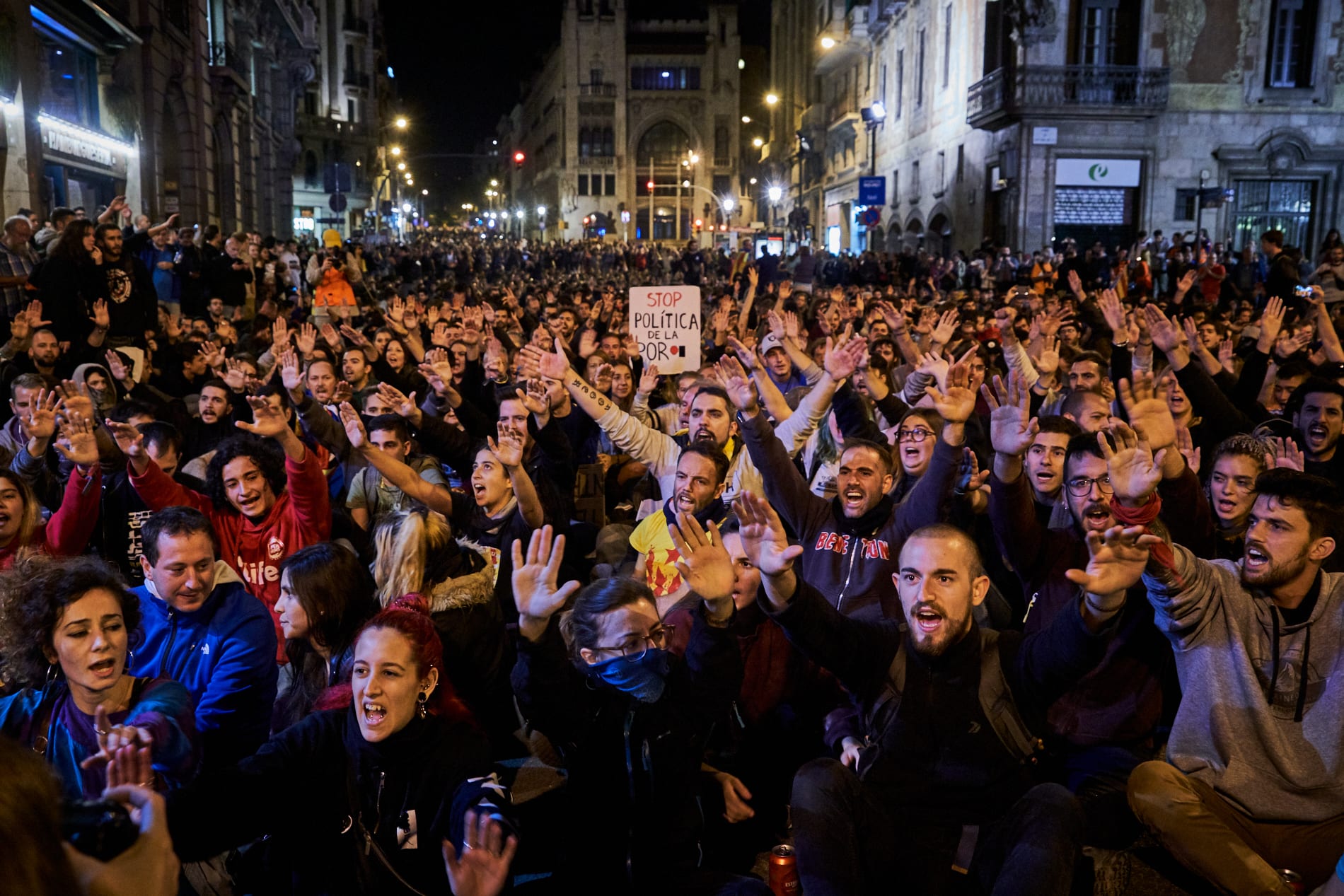
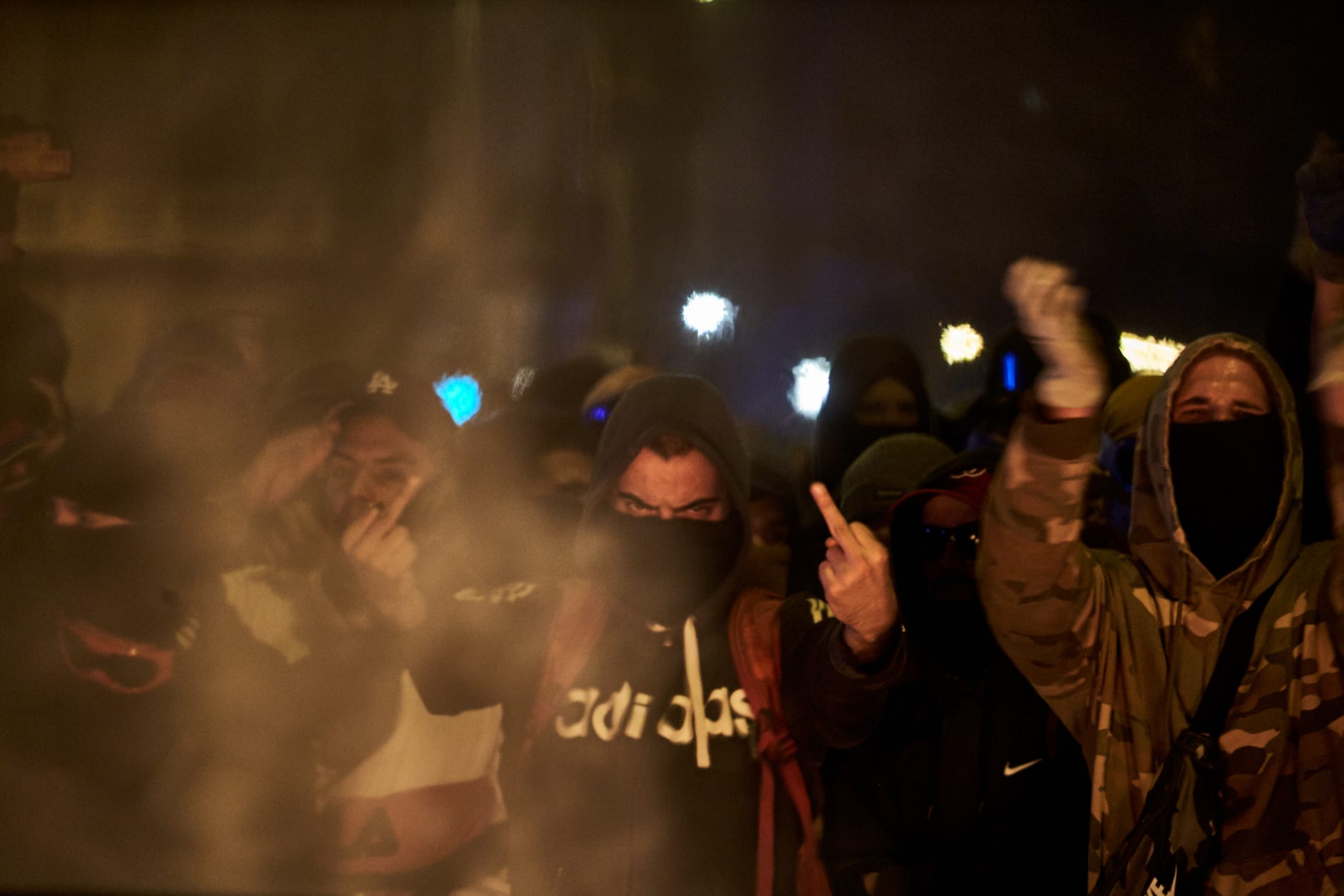
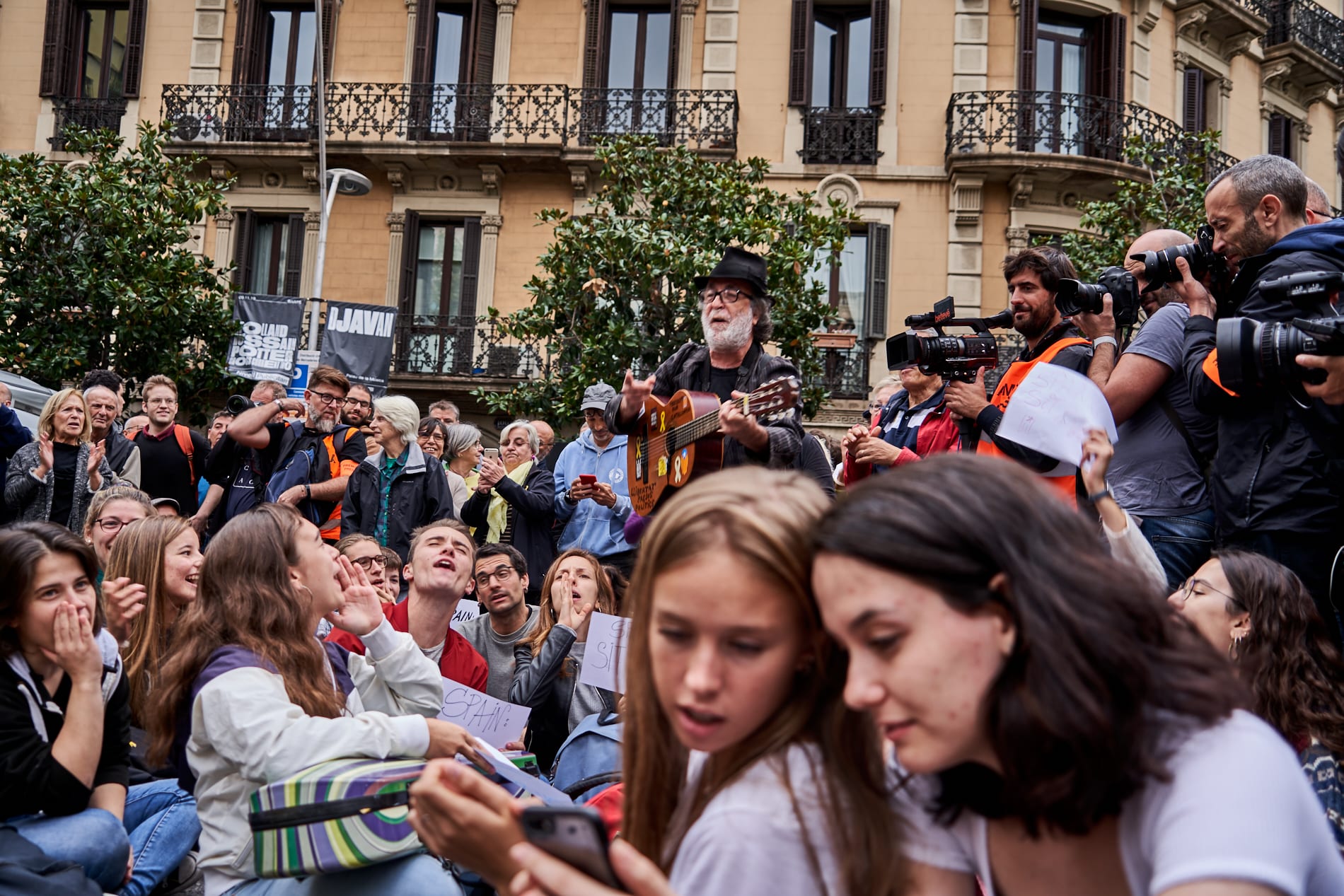
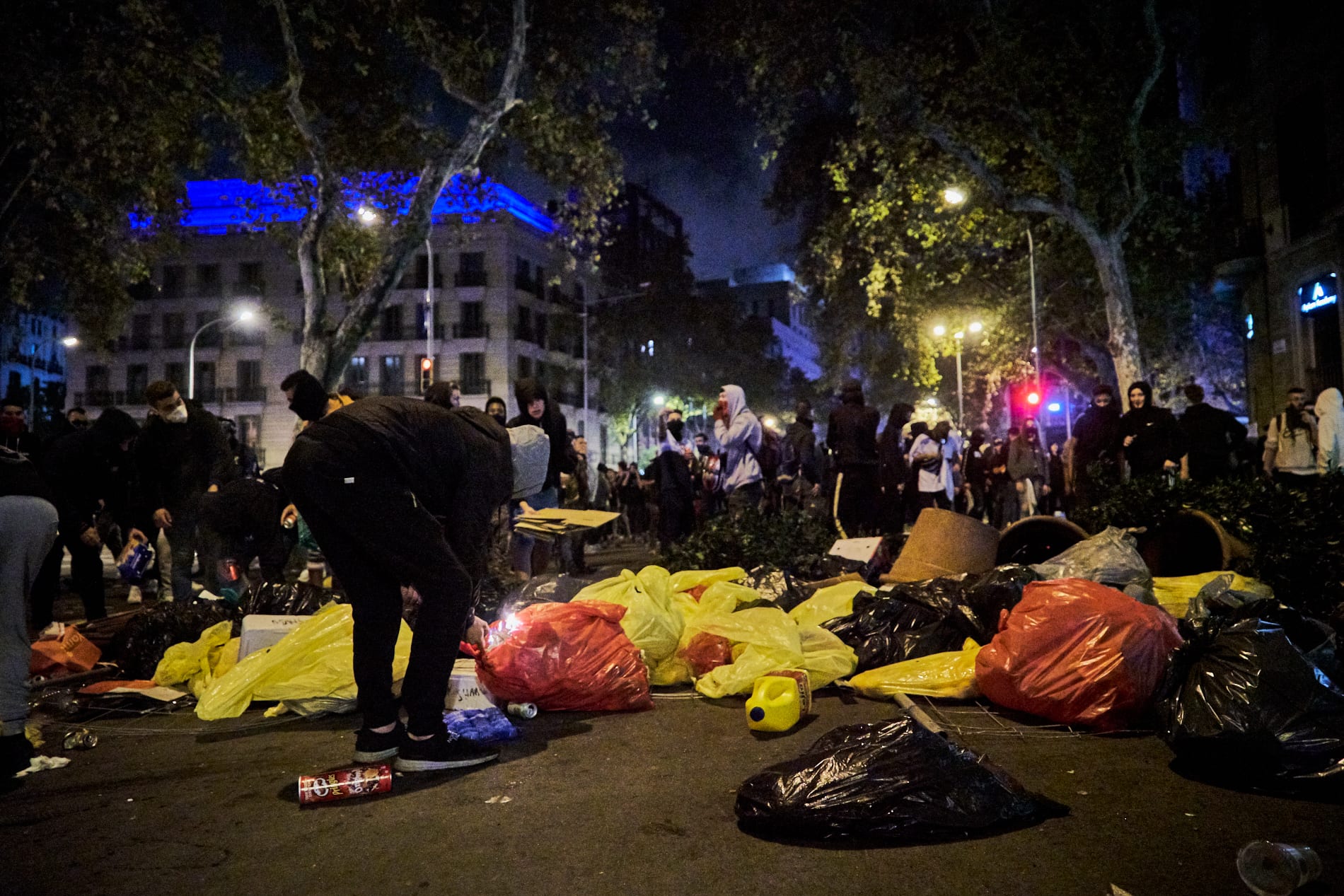
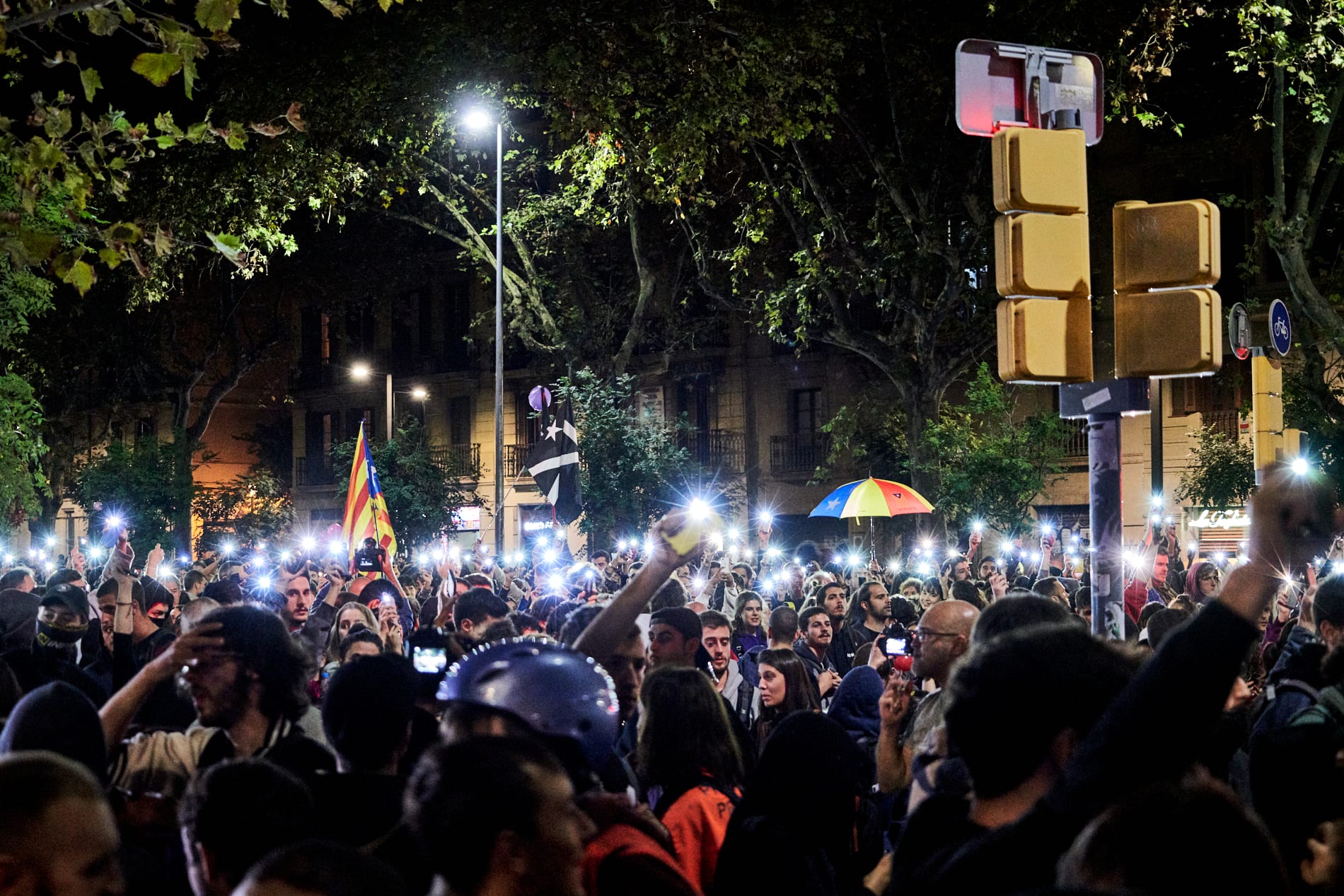
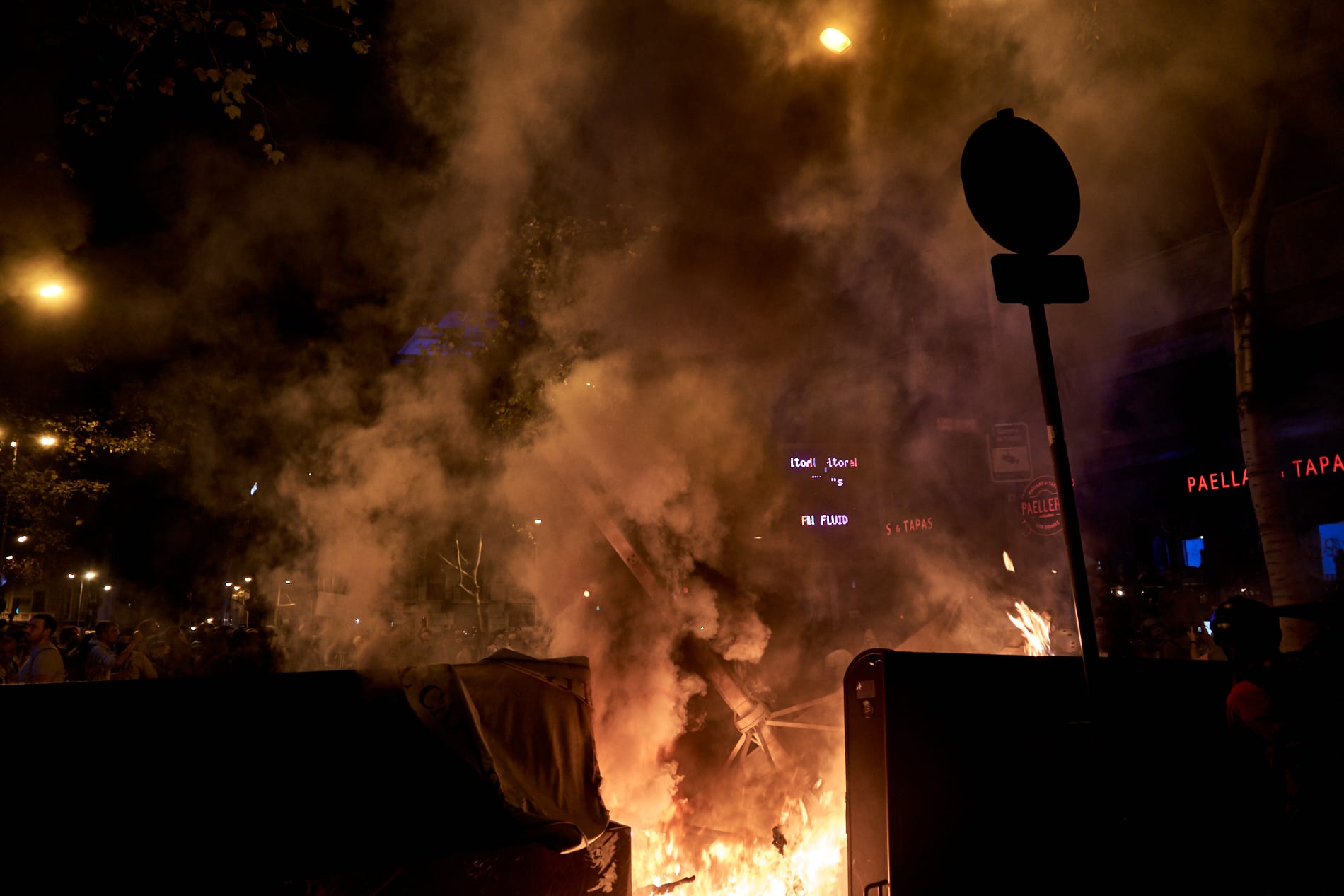
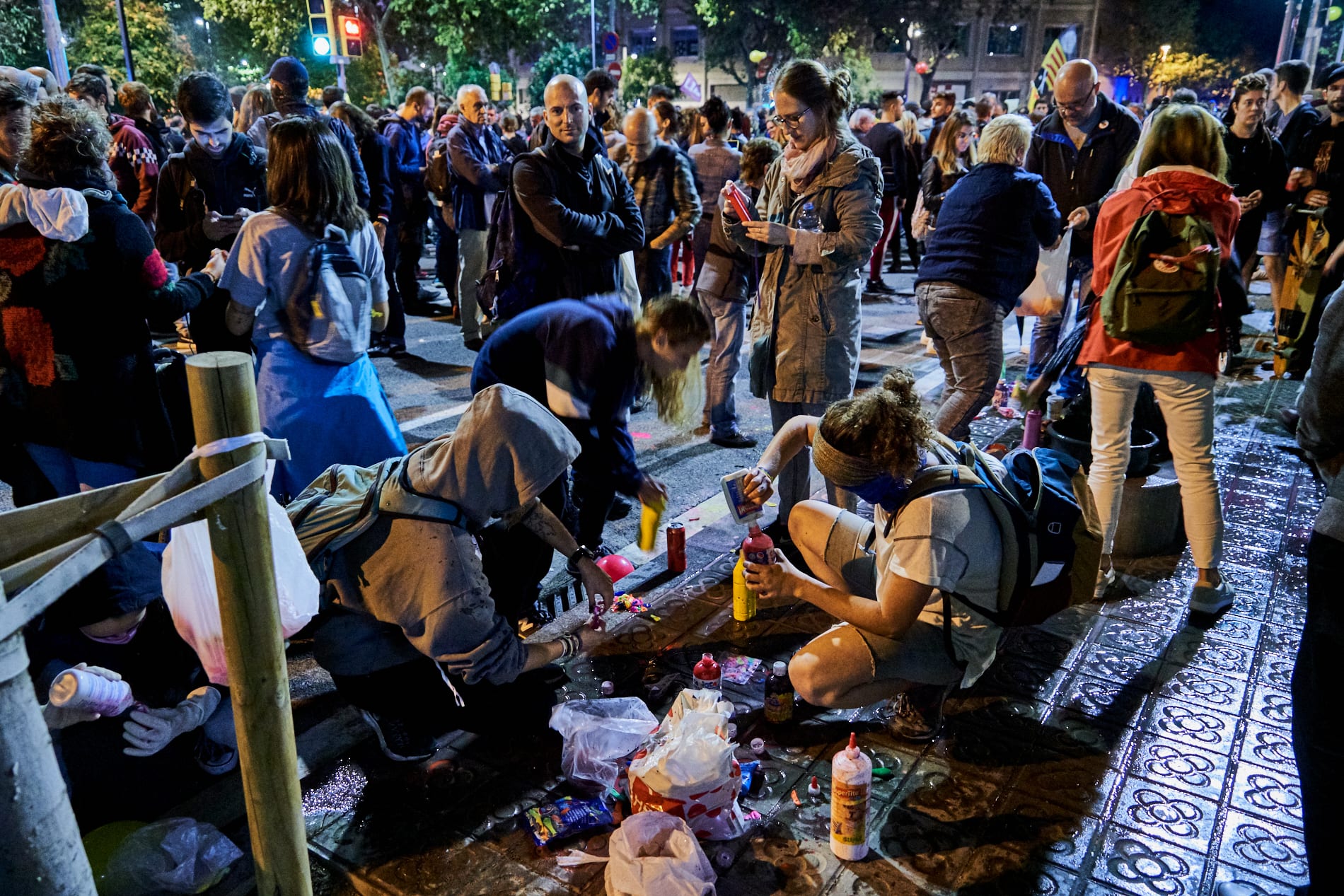
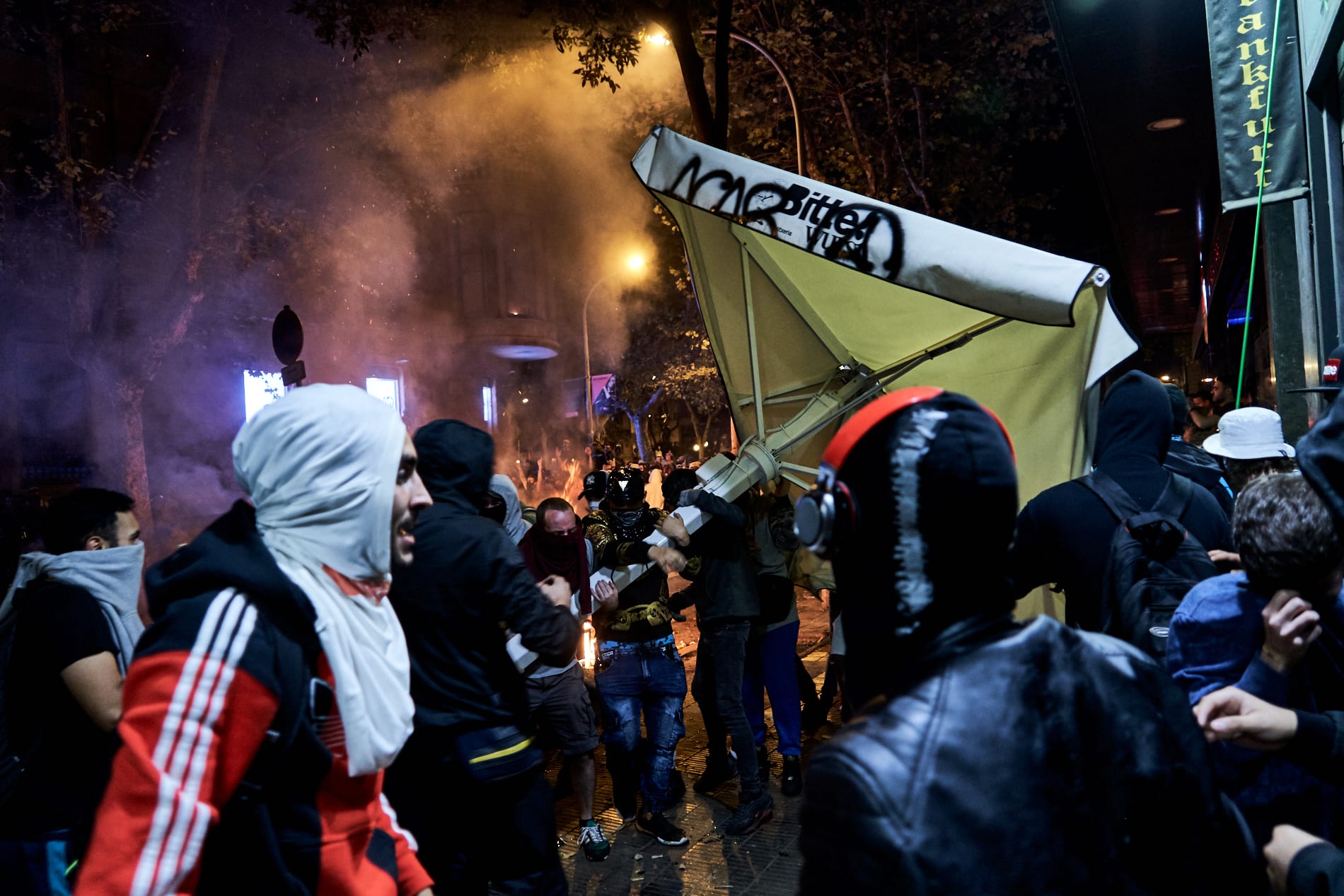
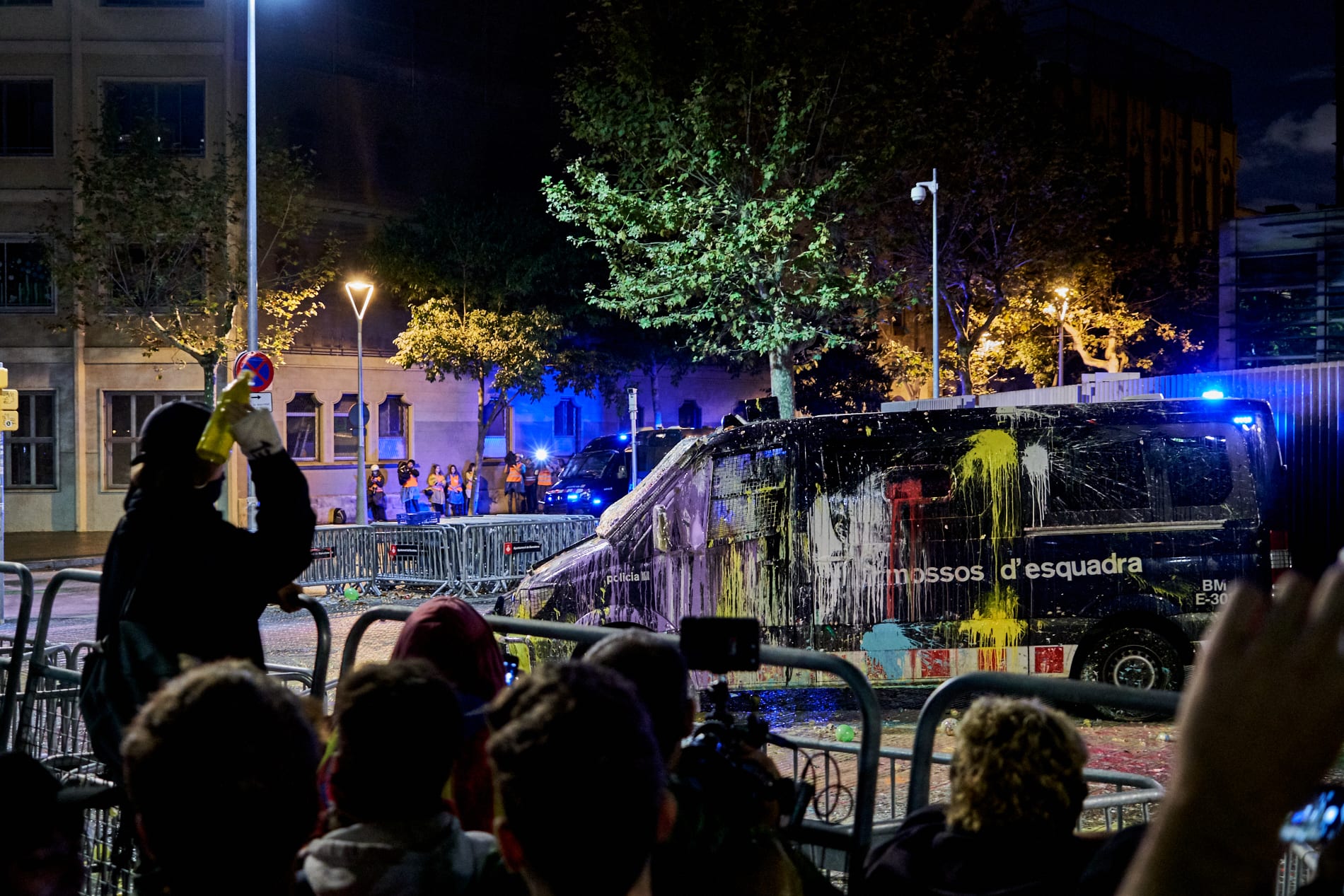
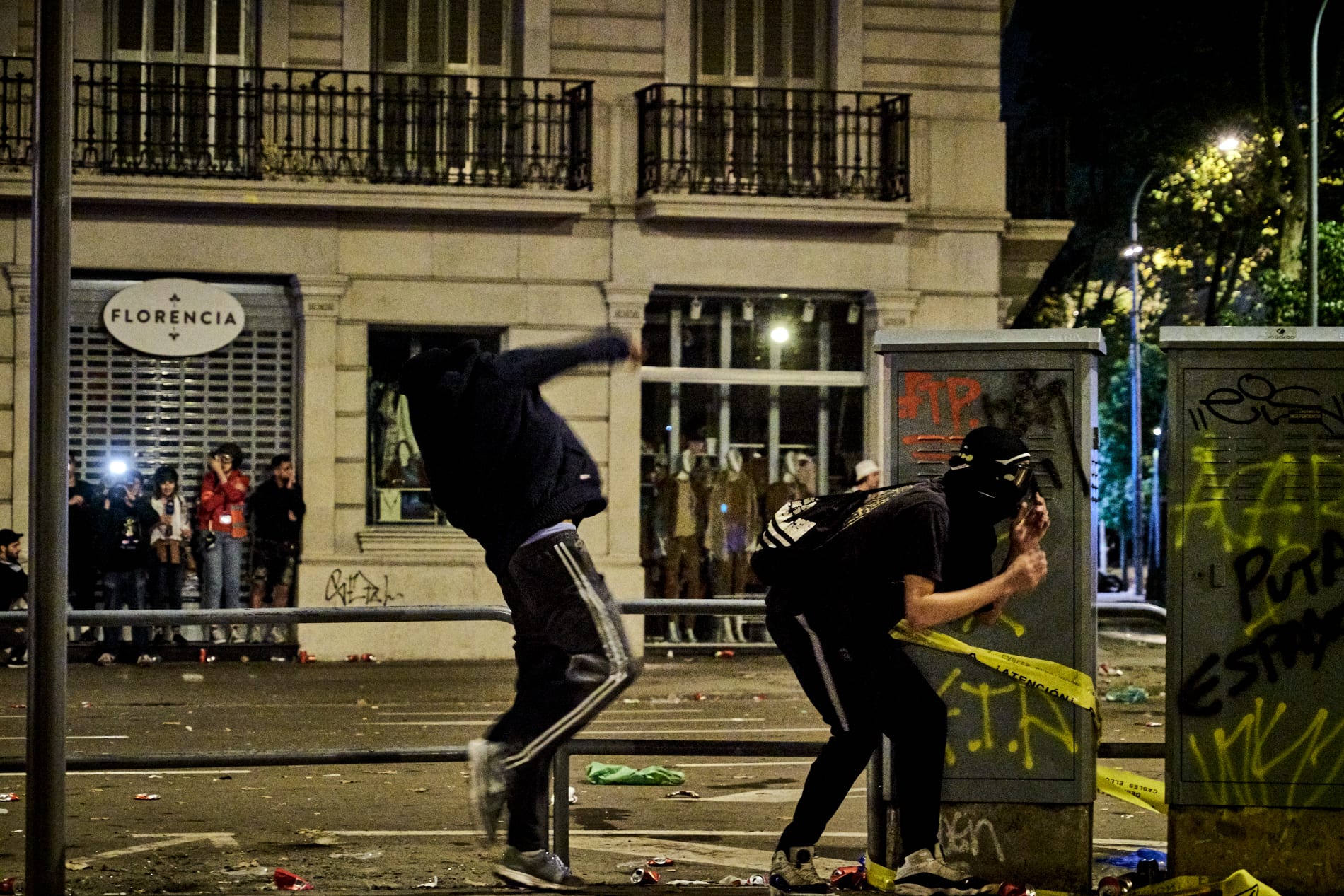
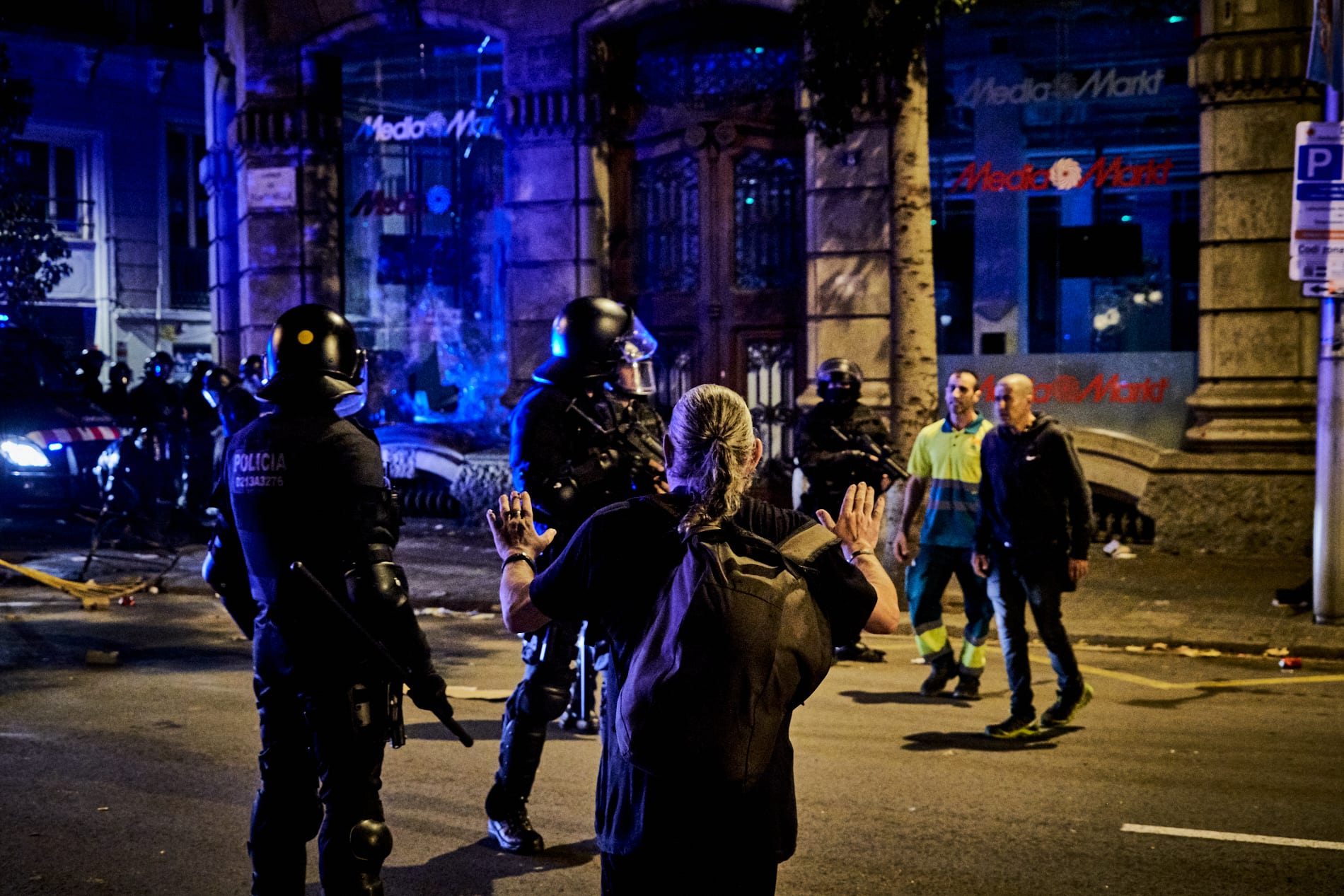
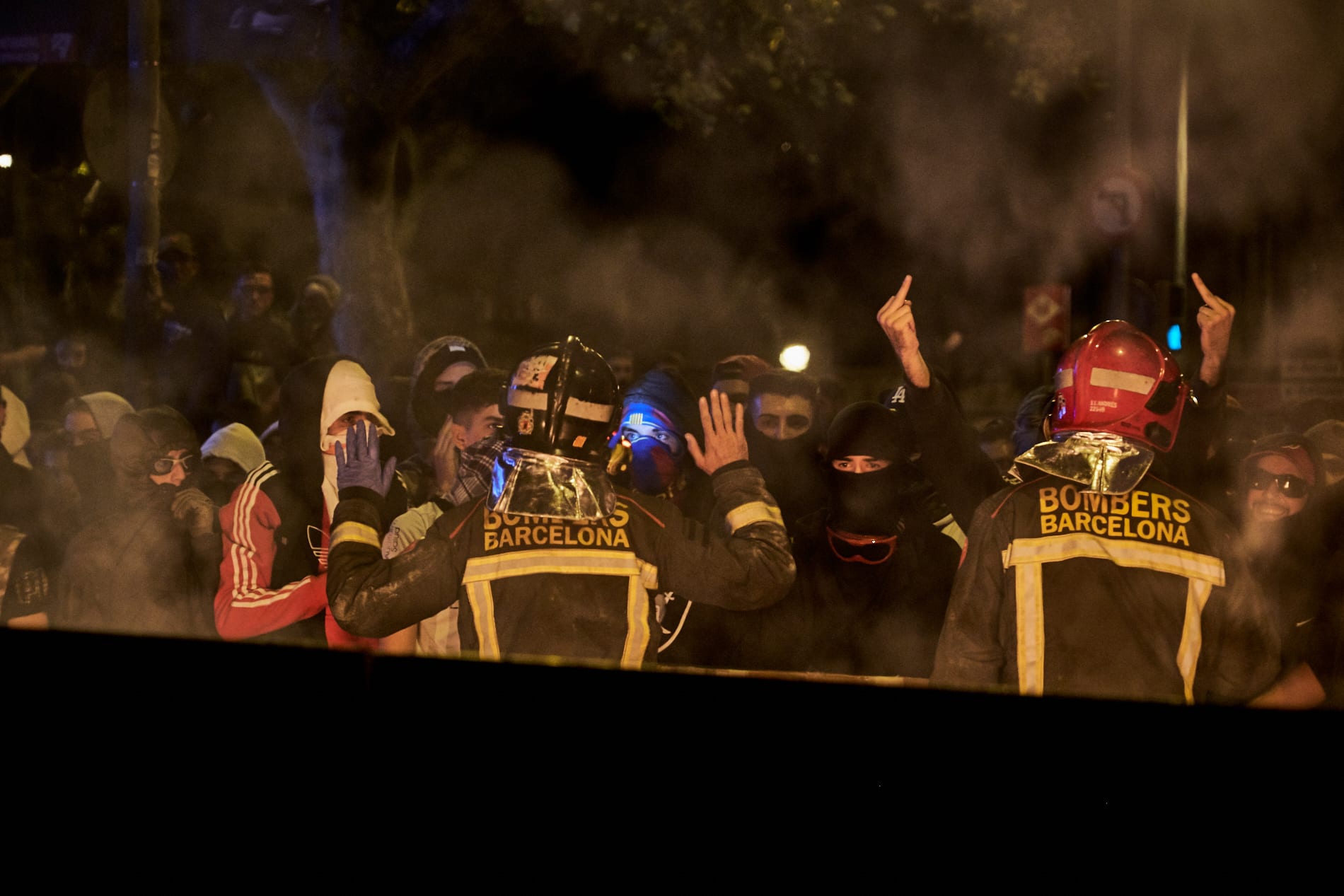
1975, dictator Francisco Franco dies
To understand the importance of this moment, one must go back, at least to 1975 and to the death of the dictator Francisco Franco, who ruled Spain for nearly 40 years and was exhumed on October 24, 2019, by the decision of the Spanish Socialist Government.
1978, the Spanish Constitution enters into force
After the death of Franco, a political transition to democracy began in Spain and in 1978, the Spanish Constitution entered into force, which establishes the structure of Spain in 17 autonomous communities (one of them, Catalonia) and two autonomous cities, to guarantee the autonomy of the different historical territories of the country. Each autonomous community has its Statute of Autonomy, in which competencies are defined.
1979, a new Statute of Autonomy for Catalonia is approved
The 1978 constitution allowed the elaboration of the Statute of Autonomy of Catalonia. The 1979 statute gave back levels of self-government to Catalonia not seen since the 1932 Statute of Autonomy during the Second Spanish Republic. Self-government ended in 1938 with the occupation of Franco’s troops after the 1936 coup d ‚état and subsequent civil war.
2003, the government of Jordi Pujol (1980-2003) ends
Catalonia was ruled since 1980, for 23 years, by Convergència i Unió (CiU), a federation of two centre-right and nationalist ideology parties, led by Jordi Pujol. In 2003, a coalition of three leftist parties: one socialist (PSC), another Republican (ERC) and another eco-socialist (ICV), headed by Pasqual Maragall, known as „the tripartite”, seized power from CiU and promised to reform the Statute.
2004, the socialist government takes power in Spain
The Socialist Party PSOE of José Luís Rodríguez Zapatero, who had supported the reform of the Statute in the campaign, won Spain’s general elections in 2004 and took over the Presidency of Spain.
2006, the term "nation" is included in the Statute
After a referendum among the Catalan population, in August 2006, a new statute for Catalonia entered into force, which amended the Statute of 1979. It established the basis for a new model of regional financing; Catalan was established as a „normal and preferential use” language, and the term „nation” was included in the preamble to refer to Catalonia, in a reduced form following the changes introduced by the Spanish Parliament in the text previously approved by the Catalan Parliament.
The conservative Popular Party, then in opposition, rejected this reform and filed an appeal in the Constitutional Court in July 2006. At the same time, the reform of the Statute of Autonomy of Andalusia with articles identical to those it considered unconstitutional for Catalonia was approved. The Andalusian Statute was not appealed to the Constitutional Court, and the whole text is in force.
June 2010, 14 articles of the Statute are found unconstitutional.
The Constitutional Court’s ruling regarding the Statute of Catalonia came in June 2010, following the first non-binding municipal consultation on Catalonia’s independence held in Arenys de Munt, a village of Barcelona, in September 2009. This unofficial vote involved 41% of the municipality’s voters, and 96% supported independence. In this context of growing support for independence, came to a ruling that considered unconstitutional 14 articles of the Statute with six votes in favour a four against.
July 2010, a mass demonstration after court ruling
The response to the court ruling was a massive demonstration in Barcelona on July 10, 2010, under the slogan „We are a nation, we decide”. More than one million people participated according to the municipal police. The next day, Spain won its first Football World Cup.
2011, the economic crisis hits Spain
The economic and political crisis hit Spain. In Catalonia, its regionalist and conservative government imposed austerity amidst corruption scandals. The social protests of 2011, the growing support for the right to self-determination among Catalan society and the rejection of the so-called fiscal agreement (an understanding similar to the Basque Country and Navarre that would give Catalonia greater economic autonomy) by the Spanish PP government in 2012 to a proposal approved by the Catalan parliament and defended by the Catalan government, led from defending autonomism to stand up for independence to the ruling party (CiU).
From 2006 to 2010, the left-wing Catalanist party Esquerra Republicana de Cataluña (ERC in Catalan) had allied with two progressive parties to dislodge CiU, the traditional regionalist conservative party. After the 2012 elections, Esquerra allied with CiU to empower a party that had decided to support and promote a non-binding consultation in which the Catalans would be asked if they wanted Catalonia to be a State and if so, to be independent.
2014, consultation on the future of Catalonia
The consultation was held on November 9, 2014, with the support of almost 80% of the Catalan Parliament despite being suspended by the Constitutional Court. Thirty-seven per cent of those entitled to vote did so, and 81 per cent of voters said they wanted Catalonia to be an independent state as opposed to 10 per cent who preferred it to be a non-independent state and 5 per cent who did not want it to be a state. Artur Mas, then president of the Catalan president and promoter of the consultation, was condemned for disobedience to the Constitutional Court to two years of disqualification and to pay the expenses of unconstitutional voting.
2015, plebiscitary elections
This symbolic vote led in September 2015 to elections that were presented as plebiscitary on the independence of Catalonia by the independentist parties given the impossibility of holding a legal referendum on Catalonia’s relationship with Spain. The results showed 48% support for pro-independence parties, 39% for unionist parties and 9% for a left-wing party that supports the right to decide but not unilateral independence.
October 1, 2017, the independence referendum
The new parliament, with a clear pro-independence majority, approved the start of the independence process, which culminated in the independence referendum on October 1 2017, which the Spanish government tried unsuccessfully to stop through police charges after being considered illegal by the Constitutional Court, and a declaration of independence by the president of the Generalitat of Catalonia, suspended 8 seconds later to start an international negotiation. On October 27, 2017, the Catalan Parliament unilaterally approved Catalonia’s independence while Spain’s Senate approved the dismissal of the Catalan government, dissolving the Catalan Parliament and calling elections in Catalonia two months later.
A few days later, part of the Catalan government was preventively imprisoned and others, such as Catalan President Carles Puigdemont, travelled to Belgium, where they are currently residing to avoid being imprisoned by the Spanish judiciary. The new elections were won again by pro-independence parties, with new leaders after the imprisonment and escape of those who formed the previous government. However, the most voted party was the unionist party Ciudadanos.
The sentence: explained by three jurists
In October 2019, Spain's Supreme Court sentenced nine Catalan separatist leaders to between 9 and 13 years in prison for sedition over their role in the independence referendum held in Catalonia on October 1, 2017.
The highest sentence was 13 years for former vice president of the Catalan government Oriol Junqueras (ERC) for crimes of sedition and misappropriation of public funds.
Five former Catalan councillors and the former president of the Catalan Parliament were sentenced to prison terms ranging from 12 to 10 and a half years.
Besides, the two leaders of the leading pro-independence associations were sentenced to 9 years in prison for sedition. Jordi Sánchez and Jordi Cuixart, known as the Jordi, were imprisoned before the Catalan Parliament proclaimed independence for leading a protest before the judicial registry of a Catalan council days before the independence referendum. The agglomeration of people, according to the justice system, sought to prevent the police from carrying out their work, aimed to stop the forthcoming referendum.
"It is a good sentence because it is the best possible sentence in an international context in which the European Court of Human Rights" could overturn the sentence if they had been convicted of rebellion, a more serious crime, explains César Aguado, professor of Constitutional Law at the Autonomous University of Madrid. For this jurist, it is of particular relevance that the sentence has been adopted unanimously, with the seven members of the court agreeing on all points of the sentence. "It is not the first time that the European Court of Human Rights has used some of the particular arguments of a judge to found a decision contrary to the majority that dictated the sentence," clarifies Aguado.
Faced with the unanimous conviction for sedition, the Public Prosecutor's Office accused the pro-independence leaders of the rebellion, and the defence demanded free acquittal. "That no one likes it is a symptom of a good sentence because it shows that they have not yielded to pressure from any of the parties," believes constitutionalist César Aguado.
For the prosecutor Álvaro García Ortiz and member of the Progressive Union of Prosecutors, this is normal. "The prosecution opted for the legal thesis of rebellion, and the court has opted for a different legal thesis to that of the prosecution, which in some respects resembled that of the prosecution and in others not. It does not mean that the performance of the prosecution is reprehensible, but that the court has not agreed with the prosecutor's office. It happens many times," says Garcia Ortiz.
For the professor of Criminal Law at the Universidad Carlos III de Madrid Jacobo Dopico, "the absolute majority of Spanish penalists deny that it was a rebellion" because it would require violence that has not occurred. The Supreme Court's ruling "makes it clear that violence must be addressed structurally. The accusations were focused on the question of what happened in the street at two moments: during the registration of a council for which the Jordis were imprisoned and the referendum on October 1 2017, according to Dopico.
"The figure of sedition is old and has undergone a rearrangement in the legal system. It gives rise to numerous interpretative hypotheses. The sentence states that a tumultuous uprising consisted of calling people to go to vote in the referendum knowing that there would be tumults. The sentence dedicates to the hypothesis of sedition only ten pages out of 493 total pages", adds the penalist.
The three experts agree that writs of protection before the Constitutional Court for violation of fundamental rights, the next step after the sentence, has a very low admission rate. Besides, this court would not review the facts judged, but only if there has been a violation of rights in the process. The European Court of Human Rights, based in Strasbourg (France), will decide whether the rights contained in the Convention for the Protection of Human Rights and Fundamental Freedoms have been violated. If it so considers, the sentence would be annulled, and compensation would be awarded to the convicted persons.
The most argued part of the Supreme Court's sentence, according to the three jurists, is the one that responds to possible allegations of violations of fundamental rights for an appeal to both the Constitutional Court and the Strasbourg Court. "The court has been especially guaranteed", believes the prosecutor García Ortiz. "My intuition is that the sentence will not be revoked, not for legal reasons but the context of the decision, with growing nationalism in other European countries. When we are in certain spheres and the higher the instance, the closer we are to politics and few issues are more political than the separation of a European state in the twenty-first century," says the constitutionalist Aguado.
The most controversial part of the sentence is the conviction of the Jordis for sedition, the two civil but not political leaders of independence. "The sentence explains that the Jordis have not been condemned for a specific act by getting into cars but are the leaders of two movements whose aims coincide with the aims of the independence government. That is respectable, and it is not forbidden to achieve the independence of Catalonia. What is forbidden is to promote those ends using illegal formulas", says the public prosecutor García Ortiz.
Following the sentencing of the imprisoned pro-independence leaders, the future of the politicians on the run (or exiled, as pro-independence supporters call them) is still unclear. Belgium must now resolve the new European arrest warrant (extradition request between member states of the European Union) issued for the crimes for which Carles Puigdemont's government colleagues have been convicted. If Puigdemont and the other politicians are sent back to Spain by the Belgian authorities, they will be tried, and the Supreme Court will decide whether they are convicted or acquitted.
For García Ortiz, the difference between the harsh sentence for sedition for the 2017 referendum versus the light penalty for the 2014 consultation is due to an "absolute difference of facts and accusations. The trial is not just about the October 1 referendum. The conditions for the 2014 consultation and the 2017 referendum are different.
In contrast to the opinion of other fellow constitutionalists, Aguado does believe that there is scope for the Spanish Parliament to allow a non-binding consultation in Catalonia on independence. However, the Spanish Constitution would prevent it from being a referendum with effects. "I don't think that Spain is unreformable, as has been said by pro-independence people", defends César Aguado. The professor of Constitutional Law points out that the Spanish Constitution allows autonomous communities such as Catalonia to propose constitutional reforms. "At the moment that possibility exists, but it is the Catalan Parliament that has to propose the reform of the constitution. There is more room for manoeuvre than is said", believes Aguado.
Grayscale routine within the Catalan deadlock
Just a few blocks away from one of October 2019’s demonstrations in Catalonia, Outriders meets Maria Ibáñez and Pablo Knobel, a couple who differ on Catalan independence. Maria, whose parents are both Catalans and who has lived all her life in Barcelona, is 24 years old and is a science teacher in secondary school. Pablo, 28, a PhD student in the environment, has also lived all his life in Barcelona, but his parents are Argentinian exiles.
They both make up two links of the complex grayscale in current Catalan society. On one side, Pablo defends Catalonian independence as a device for social change, but he maintains that for this to happen, secession is not necessary. On the other hand, for Maria, independence is necessary, but more so to reject the Spanish State and its conservatism than to preserve a Catalan homeland. Others contacted for this interview had even more polarised ideological positions. With answers like „it’s too tense a subject right now”, at both ends of the so-called „equidistance”, all asked couples of relatives or friends have declined to sit face to face.
Maria and Pablo are willing to sit and talk, which is what thousands of protestors demanded their political leaders to do a few days this conversation to unravel the deadlock situation. The hashtag #SpainSitAndTalk was a worldwide trending topic for several hours.
[The two converse congenially, although specific controversial issues provoke some discordance. Above us, a police helicopter monitoring the demonstration interrupts the flow of the conversation a couple of times.]
What does the Supreme Court’s judgement of October 2019 mean for the Catalan people?
Maria: I think it’s a response from Spain that shows how the rest of the State sees us. The judgement represents a threat, or at least a wake-up call.
Pablo: We must keep in mind that this ruling does have not only impacts for Catalonians, but also Spanish and Europeans.
How has it affected your daily life?
M: Since Monday (October 14, 2019), when the judgement came out, I have been entirely mobilised, and that same day I went to the airport straight away. The rest of the days, I tried to go to as many demonstrations as I could. Mainly because of my whole social environment, both family and friends also attended. It was really the only thing we have been talking about these past few weeks.
P: The main point is that everyone talks about this, no matter what they think. And we are beginning to see many discrepancies within the independence movement. It is beginning to become clear that independence is not a completely homogeneous movement in which everyone wants one of two things: independence or union.
Does this decision complicate already tense relationships between Spain and Catalonia?
M: On one hand, it further complicates the relationship because Spain is being very hard on Catalonia. This severity distances us and confronts us, but, on the other hand, we can see that some non-Catalan Spanish people are aware of this harshness and are taking a stance in solidarity with the cause.
P: I believe that the sentence by itself is not what complicates the situation.
The decision is perhaps fair according to the law we are in, and the question then is whether the legal system in which we find ourselves is fair.
There is a lot of talking about legality and illegality with the Catalan conflict because instead of being managed politically, it is being handled by the courts. But, in short, this ruling has only revitalised a conflict that Catalonia has been dragging on for at least a decade, if not longer.
Should Catalonia adapt to the law, or should the law adapt to Catalonia?
M: There is a deeper problem: I would like to know how many people, of the voting age population, have voted for the current Constitution (approved in 1978). We should rethink all laws we apply to anything that happens in this country.
P: Perhaps in this case, where the conflict is between two countries, it’s not the Catalan or Spanish law that should be adapted, but the European one.
M: It’s interesting that you say that because Pedro Sánchez (the current president in office) uses the same narrative. We speak of Europe as a saviour when it is precisely the EU who is committing serious human rights violations, such as allowing people to drown in the Mediterranean Sea.
P: That’s a much broader issue, but I think Spain owes a lot to Europe on an economic level. Although legally, Europe does not do many things because it does not have the power to do so. Indeed, Europe doesn’t partake here because we could list several European countries with territories who seek independence.
Playing around with political fiction: what do you think is a viable option to unblock this situation?
M: We have to get to a point where we Catalans are listened rather than judged. And obviously, there must be a dialogue between politicians.
P: The first essential thing is to go through the general elections because every time any politician makes a statement, it is absolutely clear that it is winning or losing votes. From then on, politicians must realise that the majority in Catalonia is not divided between the two huge ideologies, independence or union. They should start thinking beyond that and proposing policies that affect everyone.
How do you perceive violence (in its broadest sense)?
P: I am worried about the situation in which we find ourselves, not only about the violence in the streets, which I consider to be an occasional thing but also about the political situation in general. The leaders can’t talk to each other, there’s no sign that the Spanish legal system is going to change… It’s an uneasiness that leads me to wonder, „where is this taking us?”
From what you said at the beginning, Maria, you have been following the protests more actively. How do you perceive, or have you perceived violence in your milieu?
M: A lot of people gather together and with so much tension and stress it’s easy for a spark to go off and for the riots to start. It happened, for example, on Monday, the first day of protests, at the airport. I also think we are doing this interview right now only because there has been violence. That is to say; it has managed to get it out of Catalonia and Spain.
P: I don’t agree at all. From the media, it seems that the riots are eclipsing the rest of the movement. We are given images of what is happening elsewhere, in Chile, for example, but here is with less intensity. On the other hand, the reporting from the October 1, 2017 referendum in which people were seen sitting in polling stations and being beaten by the police were much more powerful.
M: So, if the press won’t listen to us because worse things are happening elsewhere and Europe, at a political-legal level, doesn’t care either, what do the images matter? Torra and Sánchez should talk. We can take to the streets and protest, but politicians must sit down, talk and realise that it is not a fair judgement and do something to change it. Until that happens, I don’t think we can see any independence, nor can we see Spain worth living in.
Catalonia, one year later
Much has happened in a year in Catalonia after the judgement that was announced on October 14, 2019.
The Supreme Court of Spain has removed Catalonia’s regional president Quim Torra from public office for one year and a half. On September 28, the judges uphold last year’s decision by a lower court ruling that Mr Torra was guilty of disobedience concerning his refusal to remove yellow ribbons in solidarity with those condemned in the trial from official buildings. He had came Catalan president in May 2018 following the departure of his predecessor Carles Puigdemont.
Unidas Podemos, a left-wing party, joined Spain’s ruling socialist party forming a coalition government.
Also, the former Catalan president Carles Puigdemont, on the run from Spanish justice that wants to trial him the acts of 2017, is now officially a member of the European Parliament. More lately, alleged corruption by Spain’s emeritus king has been made public.
And, of course, the COVID-19 pandemic has caused more than 5,750 deaths in Catalonia and more than 30,000 hospitalizations, according to official data. After a hot autumn of mobilizations for the sentence, a confined spring came under a state of alarm decreed by the Spanish government to stop the transmission of the virus. Even the Spanish Army was deployed in Catalonia.
The health crisis has left aside the so-called territorial or national question. However, there have been some political arguments about which administration was responsible for the collapse of the health system.
But let us return to the old normality. To a world without the coronavirus SARS-CoV-2.
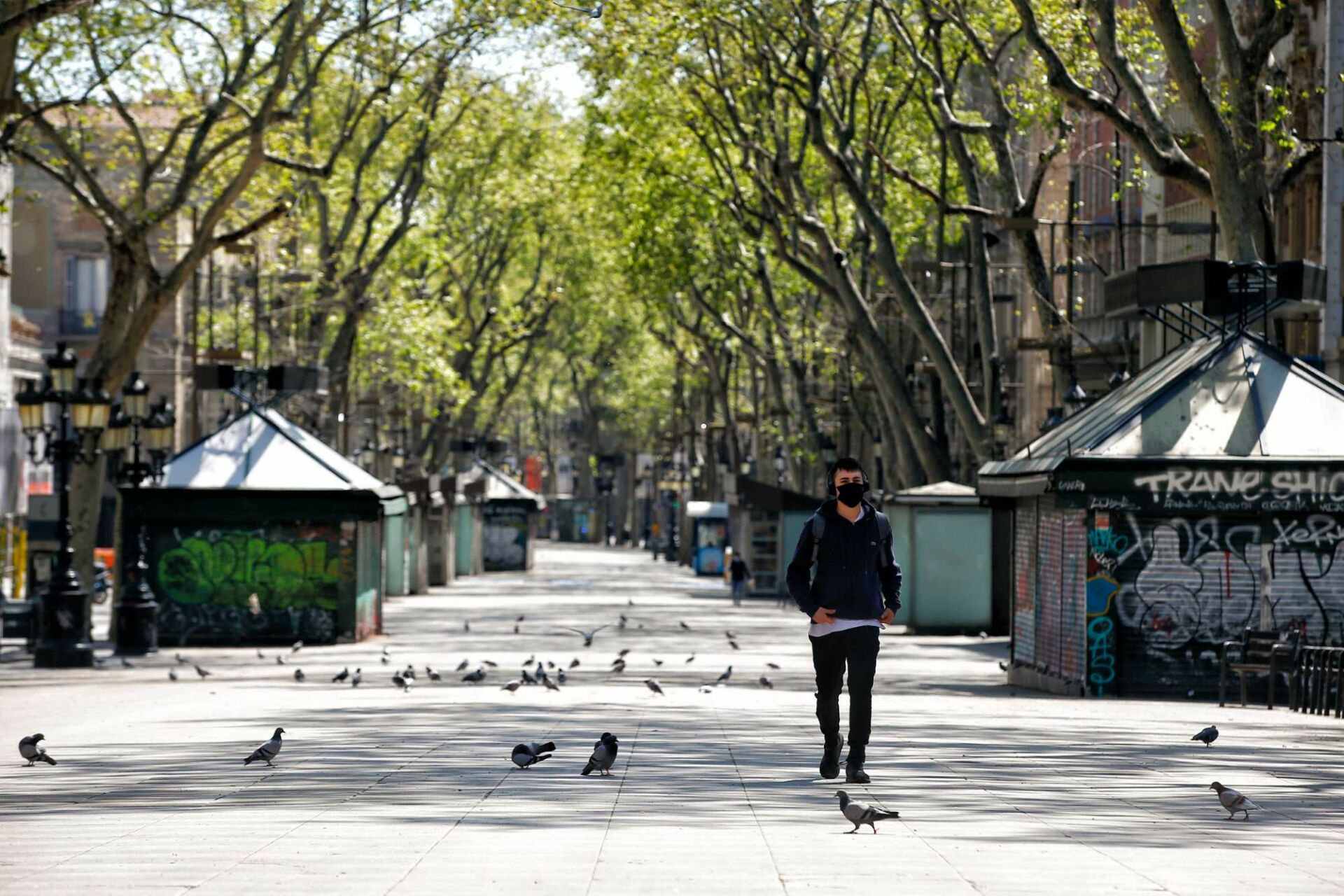
Five and a half months before the Sentence, Spanish general election had been held, on April 28 2019. However, the Socialist party (PSOE), which won most seats at the vote, fell short of a majority. After months of negotiations, the parties failed to reach an agreement, and Spain repeated its general election, holding the country’s fourth general election in four years and the second in a year, on November 10. Almost a month after the sentence, the Socialists received 28.7% of support and 123 seats in the repeat polls and this time they teamed up with left-wing party Unidas Podemos. The repeat election brought a similar scenario to pro-independence parties. Meanwhile, the far-right Vox party, which had asked in the trial for up to 74 years in prison for the pro-independence leaders, became the third force in parliament.
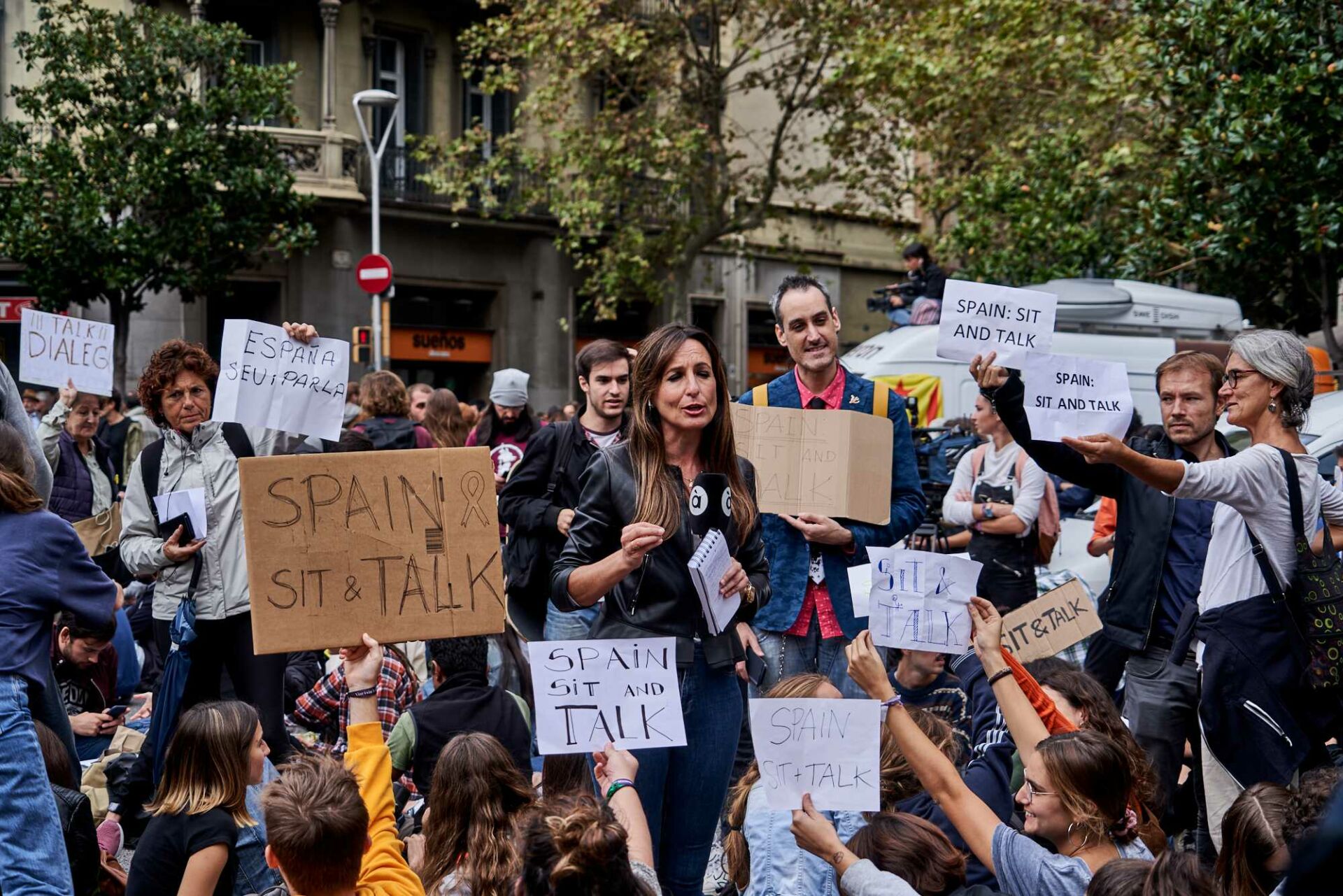
Miriam Vehí, a congresswoman in Madrid for the anti-capitalist independence party CUP, says the October protests „despite not having a concrete demand”, have resulted in a negotiation table between the Catalan and Spanish governments, „something unprecedented since the independence process began”. This meeting happened only once at the end of February and attended both the Spanish President Pedro Sánchez and Catalan President Quim Torra, as well as several members of both governments. Three weeks later, Spain was confined by the coronavirus crisis. The pandemic ended the commitment to meet again once a month. The two administrations have not met again. Nor in a telematic way.
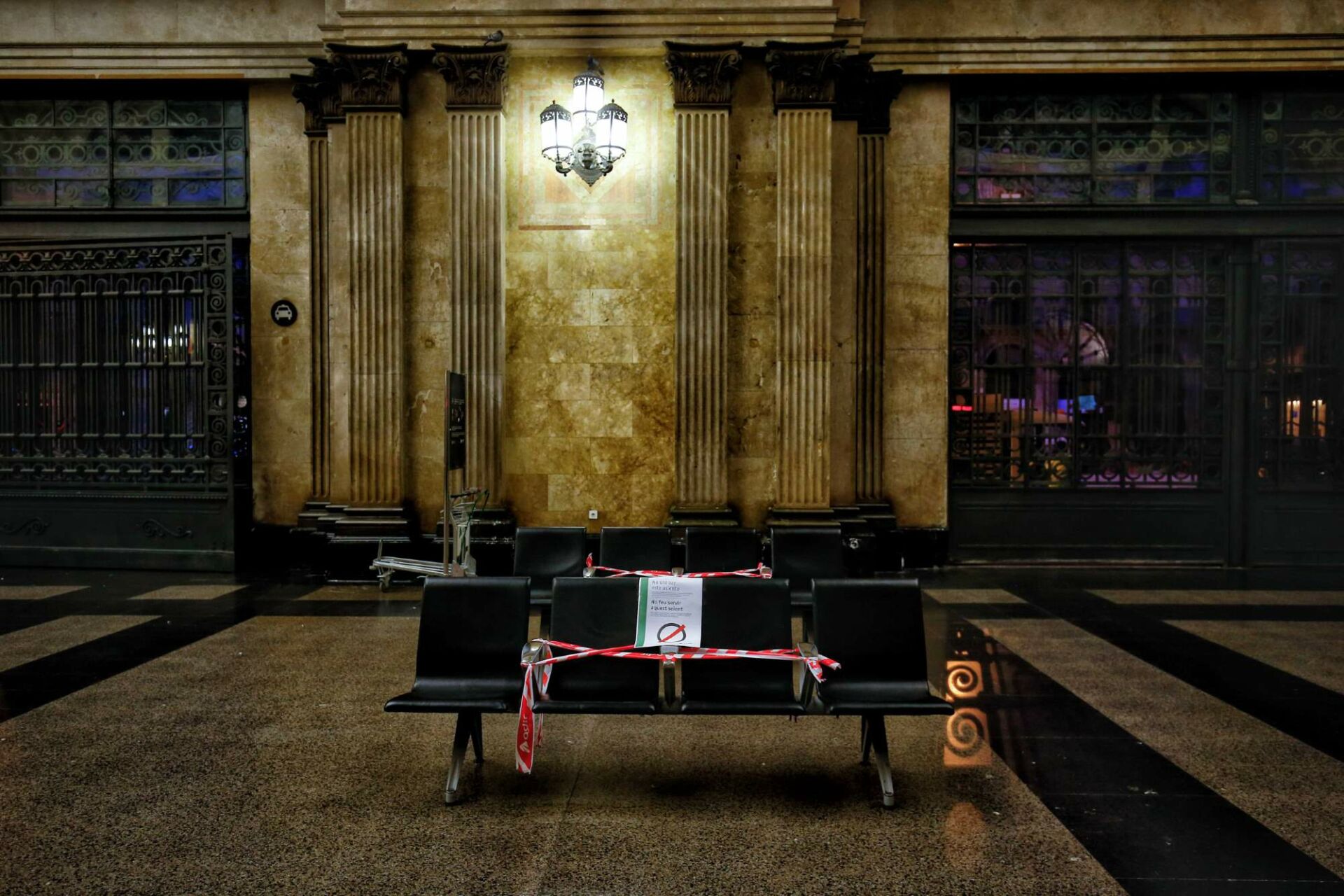
„The situation is one of total stagnation from a repressive perspective. We continue to have prisoners and exiled people. There has not been a referendum, and there are no perspectives that this dialogue table will give a concrete fruit”, denounces Vehí. Her party decided to run for the first time in the Spanish elections of November 2019 because in the face of „the political blockade and increased repression” and because „we considered that a voice for independence with discourse and practice of protest was necessary”. The two pro-independence parties in the Catalan government, according to Vehí, do not break with the Spanish state.
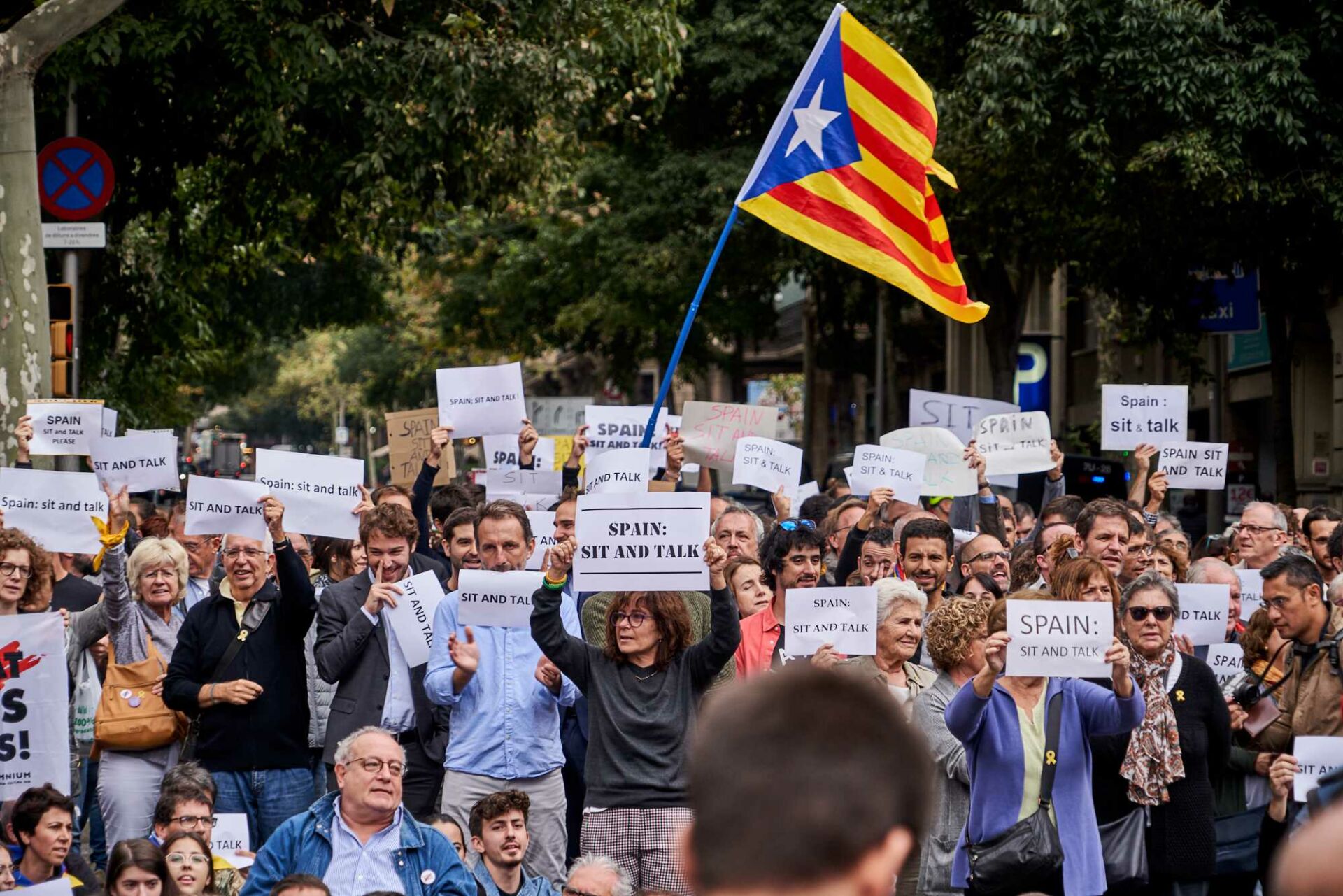
Isabel Elbal, the lawyer of former Catalan president Carles Puigdemont, believes that „independence is not prohibited anywhere in the world except in Spain”.
Puigdemont’s defender stresses that the Working Group on Arbitrary Detention, a body of the United Nations, concluded that the deprivation of liberty of the Catalan pro-independence politicians and activists before their conviction was arbitrary and that the Supreme Court that finally condemned them was not a „competent court”. Furthermore, according to this group, the acts for which they were tried were „carried out in the exercise of freedom of opinion, expression, assembly, association and political participation, over several years”.
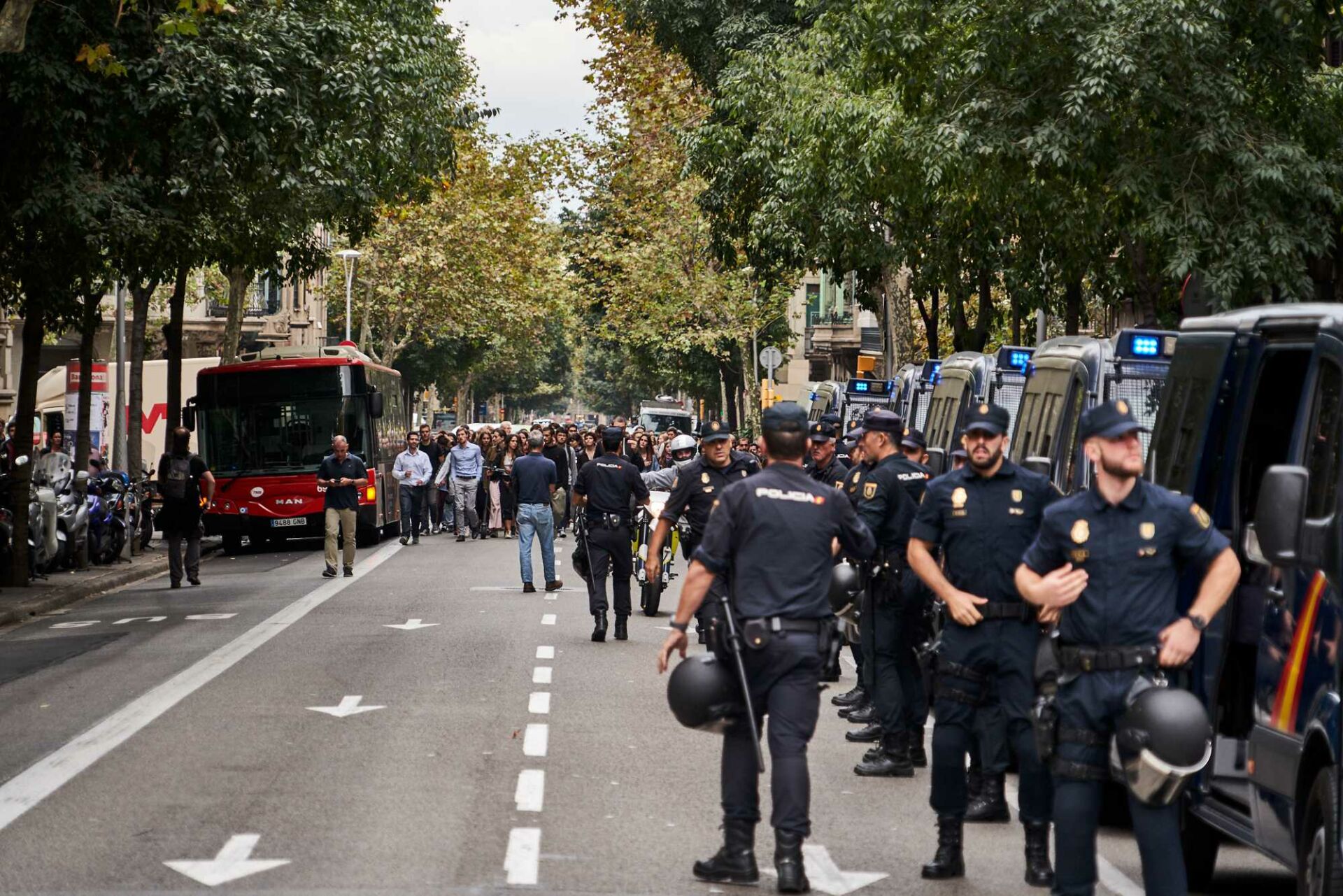
Puigdemont fled to Belgium to avoid arrest, and he has been a MEP since the European elections of 2019. Puigdemont and four of his former government advisors reside now in other European Union countries. They declared themselves in default before the Spanish justice system. They will be arrested if they return to Spain. This August, a Belgian judge handed down an appealable sentence denying the European Arrest Warrant (EAW) issued by Spain against former councillor Lluis Puig because the Supreme Court is not competent to request his arrest and surrender. This is the first time that a judge has considered this thesis defended by the lawyers of the pro-independence politicians.
This sentence changes everything, according to Elbal, by considering that the Supreme Court was not the one who should have judged the independentistas already condemned and in prison either. „All the violations committed by the Supreme Court have been revealed,” she adds. The Supreme Court has not responded to Outriders’ questions about this sentence, but one of the prosecutors of this court who participated in the trial has expressed himself publicly.
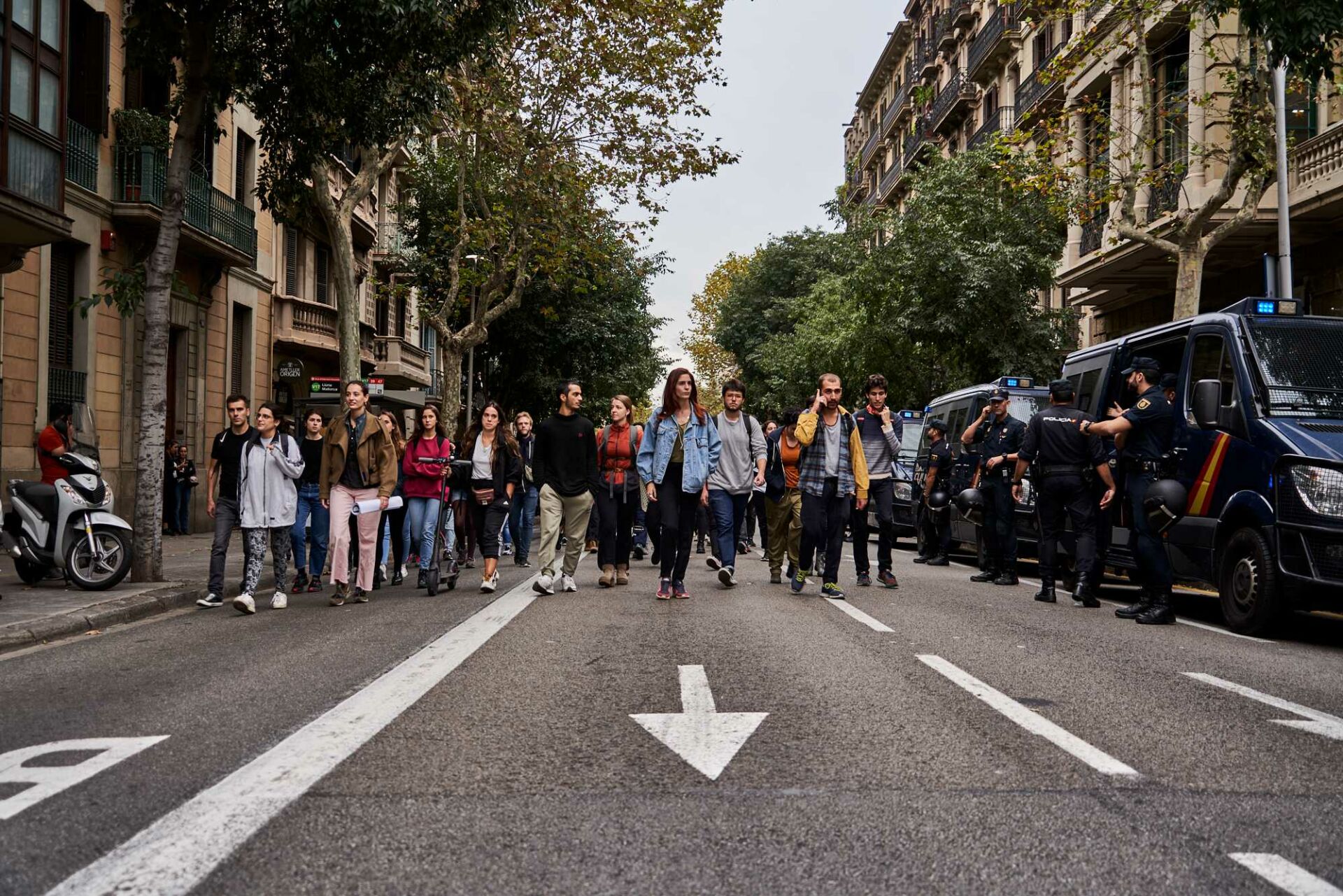
According to the Spanish public prosecutor Javier Zaragoza, this sentence is a „Belgian judicial nonsense” that uses „both incredible and unacceptable reasoning”. The prosecutor considers that the Belgian justice system has failed to comply with European law and considers it is likely that the Belgian state will be condemned again for this by the European Court of Human Rights. It already happened in 2019: Belgium was convicted after refusing to hand over a member of the Basque pro-independence armed group ETA to Spain.
The defendant of Isabel Elbal now has the impunity conferred on him by being an MEP. But this legal protection could be lifted by the end of the year if the European Parliament so decides. If this happens, „the Supreme Court would have to carry out another European Arrest Warrant in Belgium, and we are back to square one. The Belgian judge would have to decide whether to hand over President Puigdemont to the Spanish courts for trial. If the Supreme Court were to retake this EAW, the same Belgian judge would have to say that the Supreme Court is not competent. It’s Groundhog Day”.
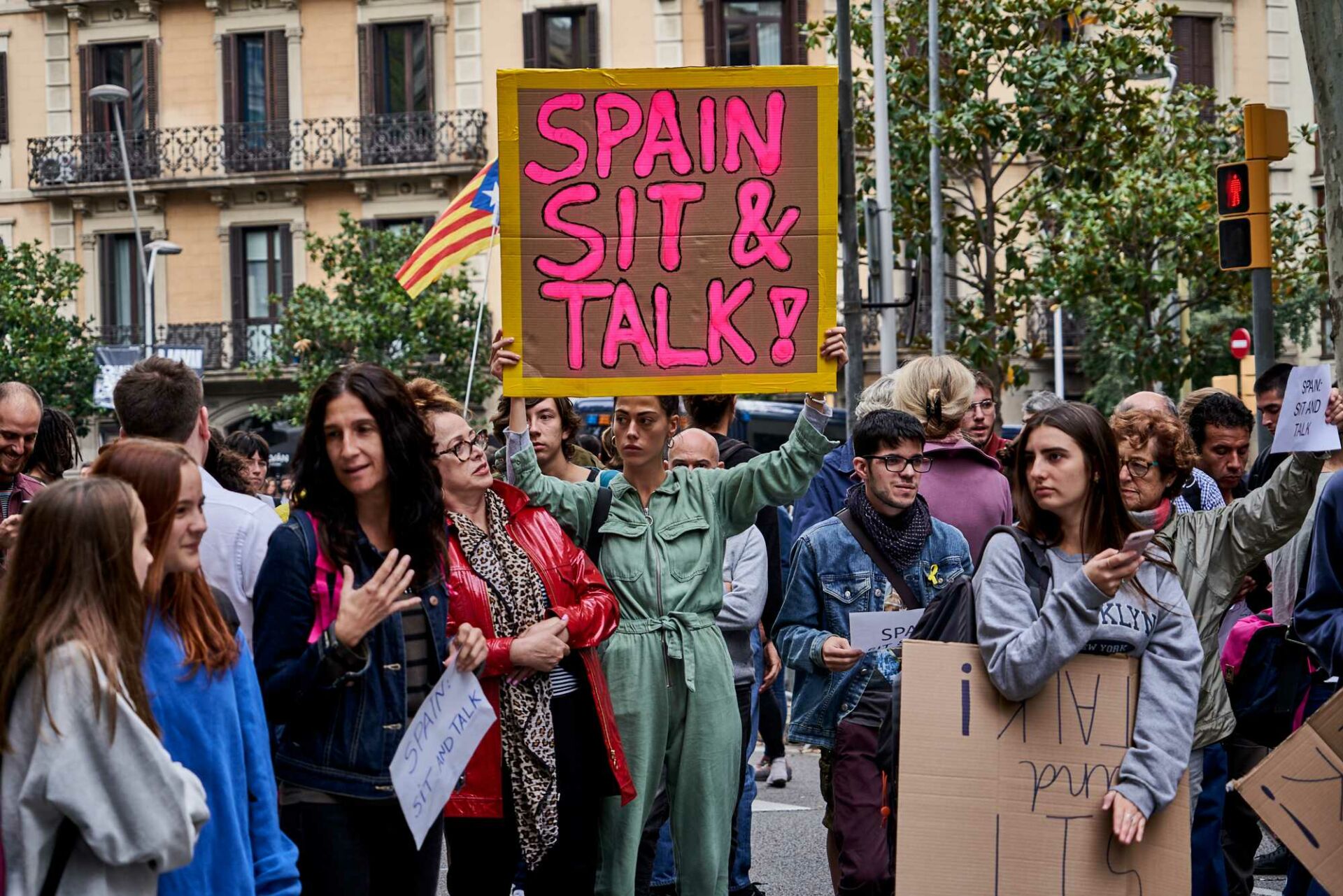
Puigdemont’s lawyer asks for the process to be dejudicialized. „Criminal law no longer has any meaning. It has only served to highlight all the violations committed by the Supreme Court”. Elbal requests that the politicians should sit down to talk. The table gathered in February did not include any representative of Puigdemont, the lawyer denounces.
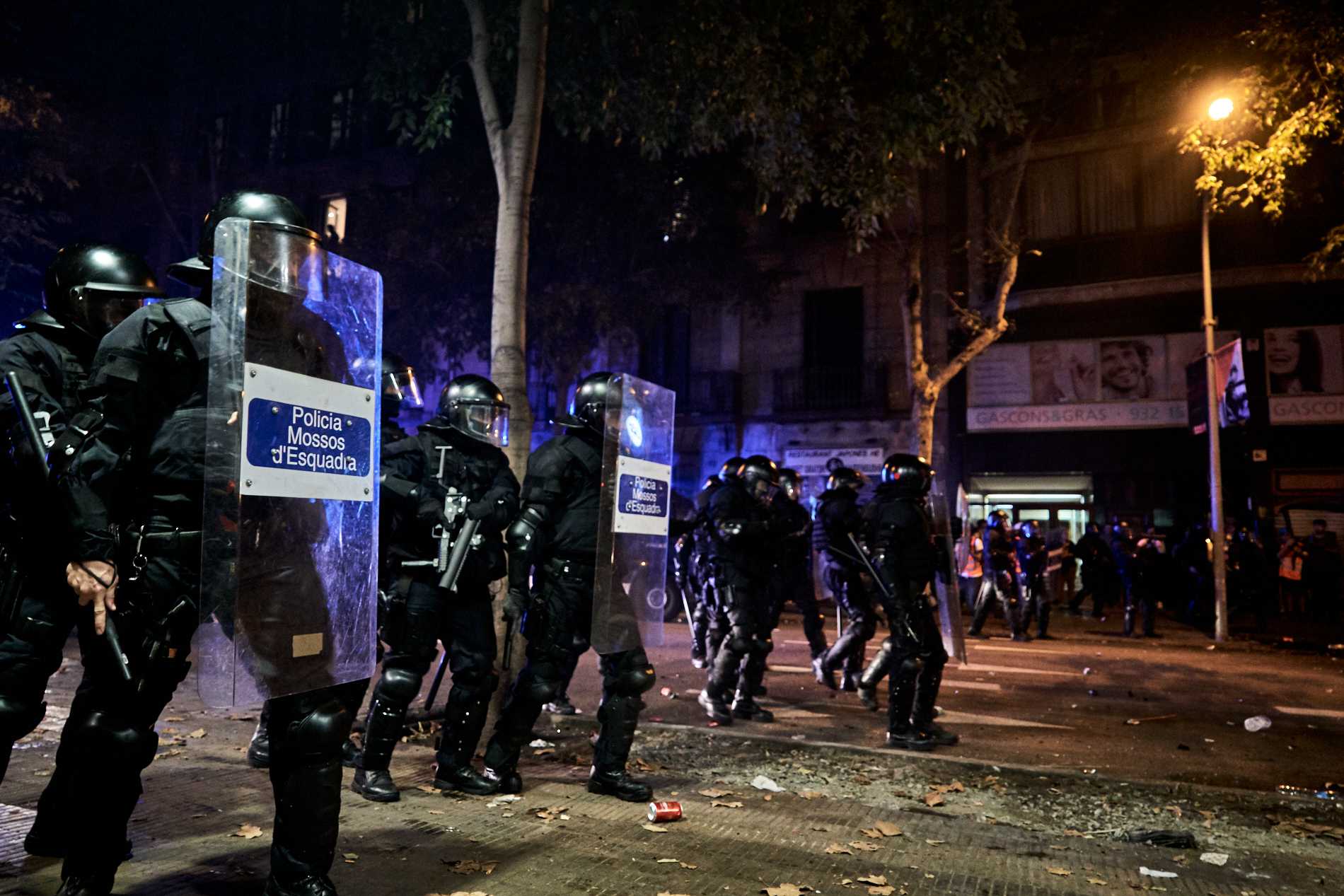
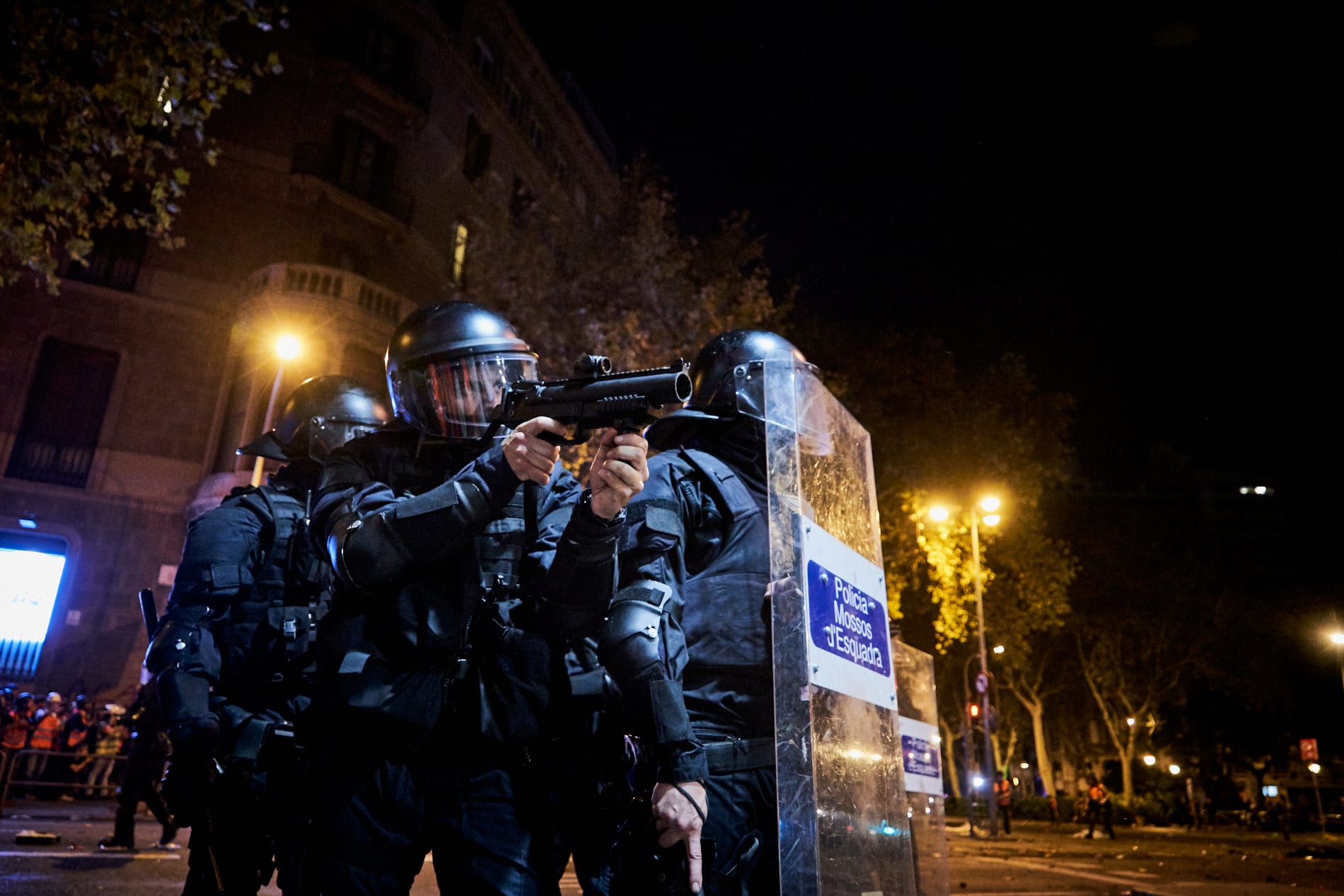
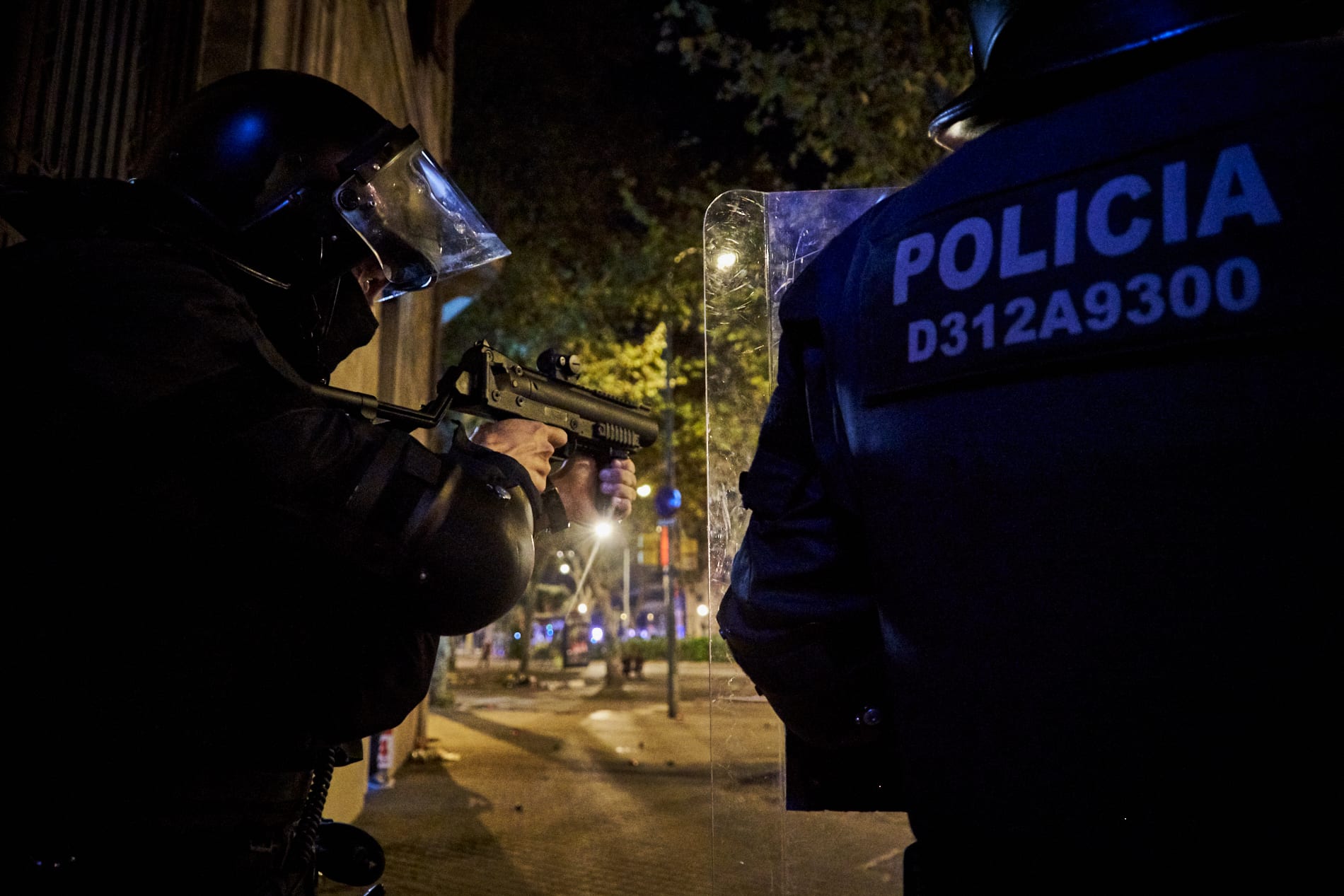
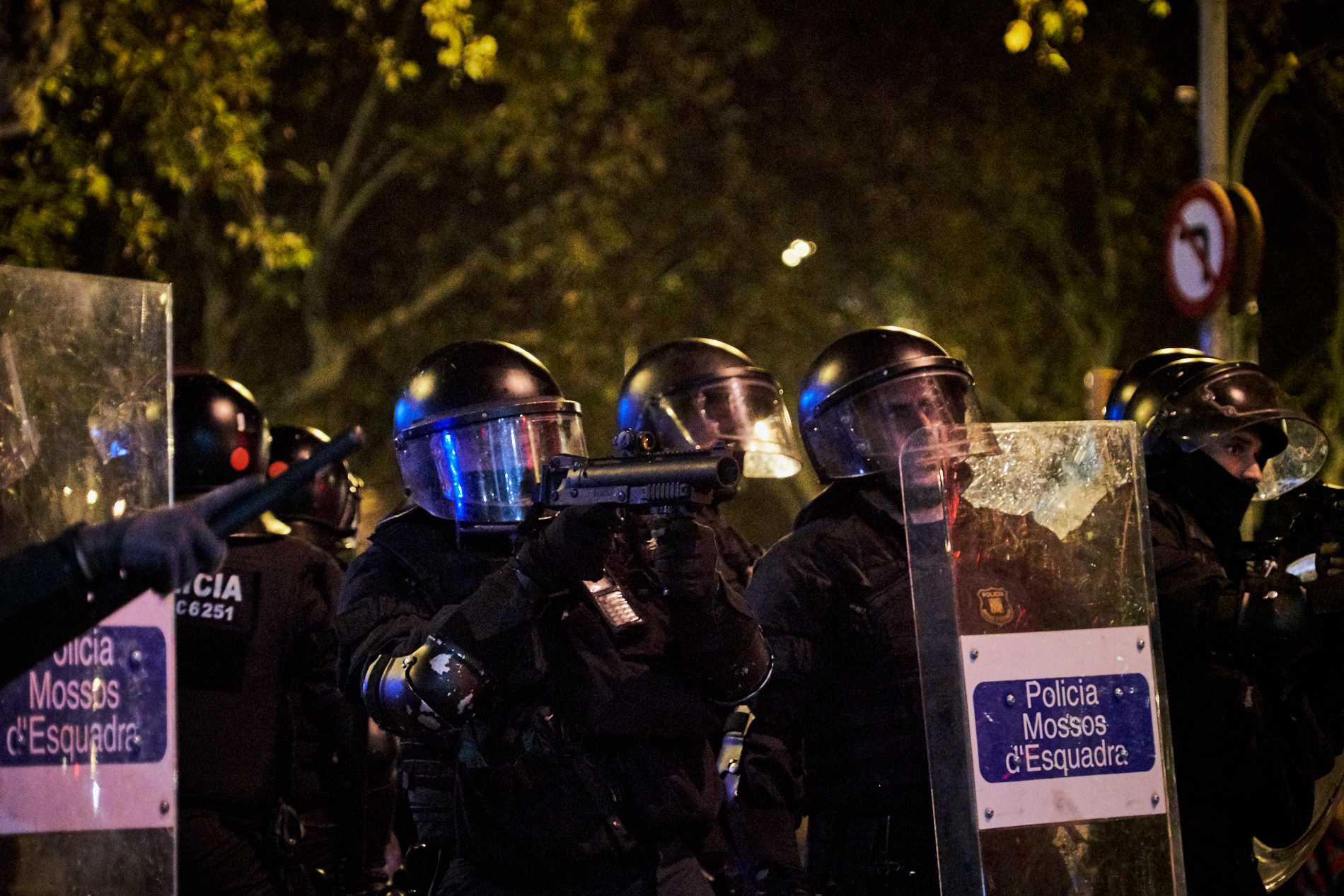
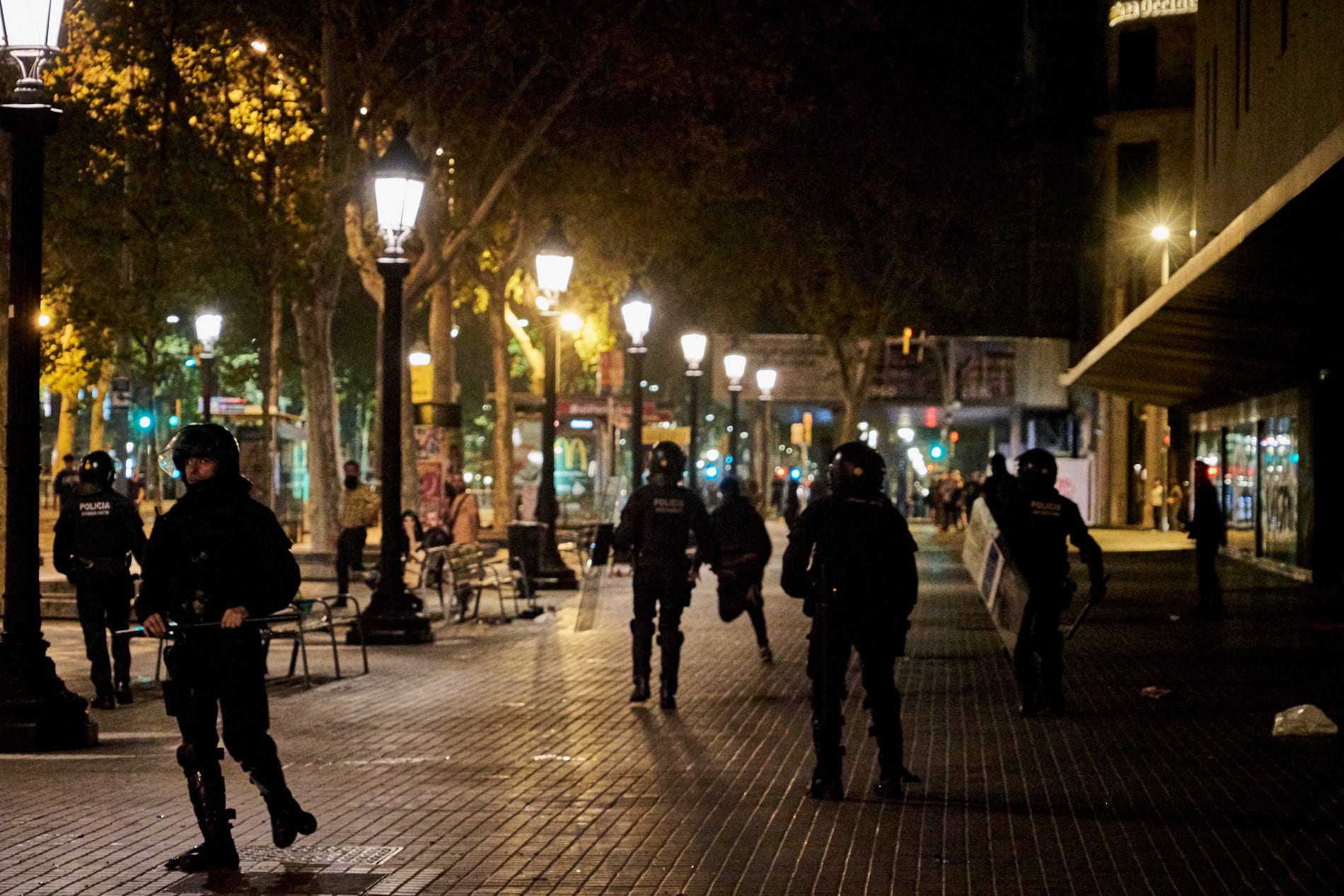
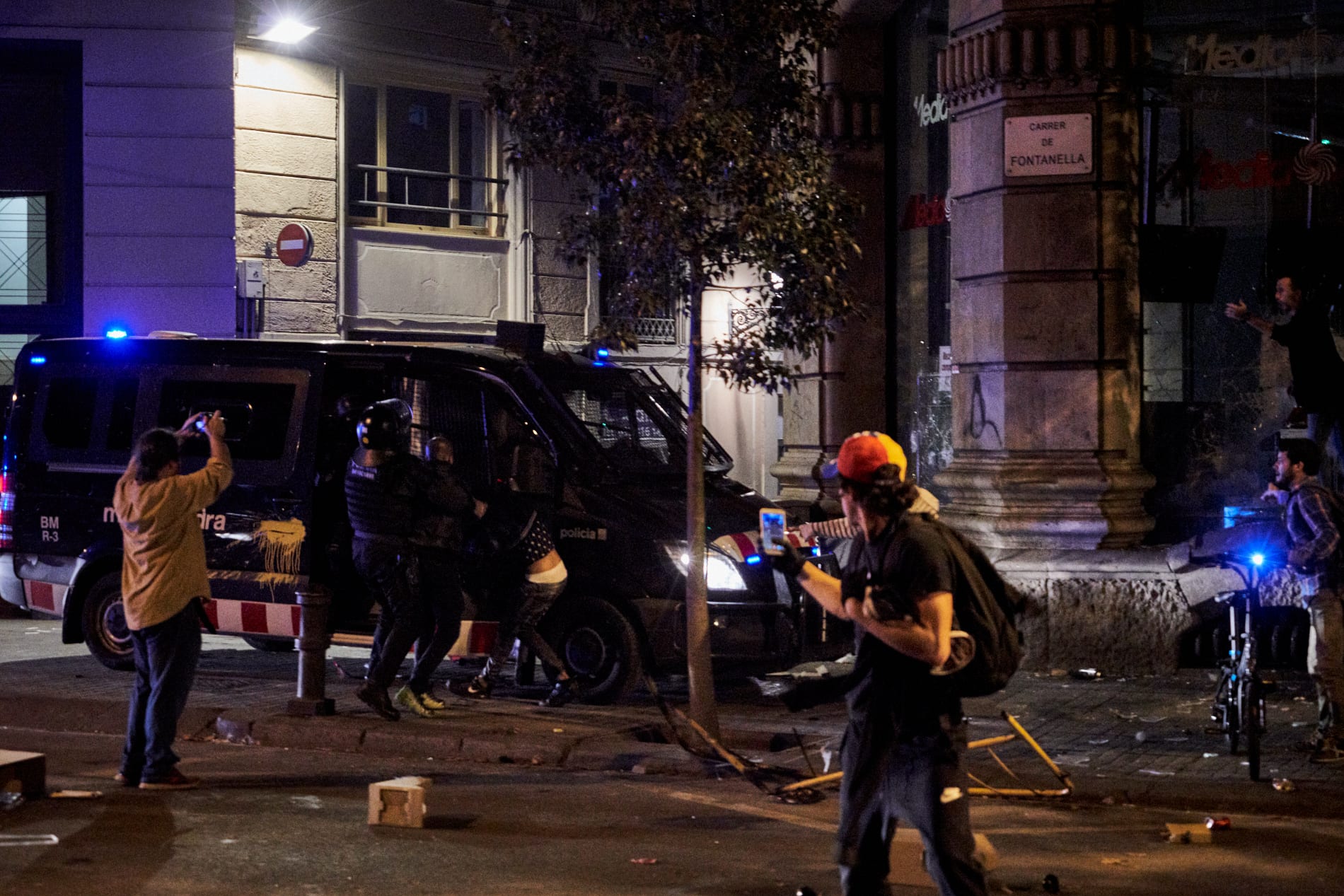
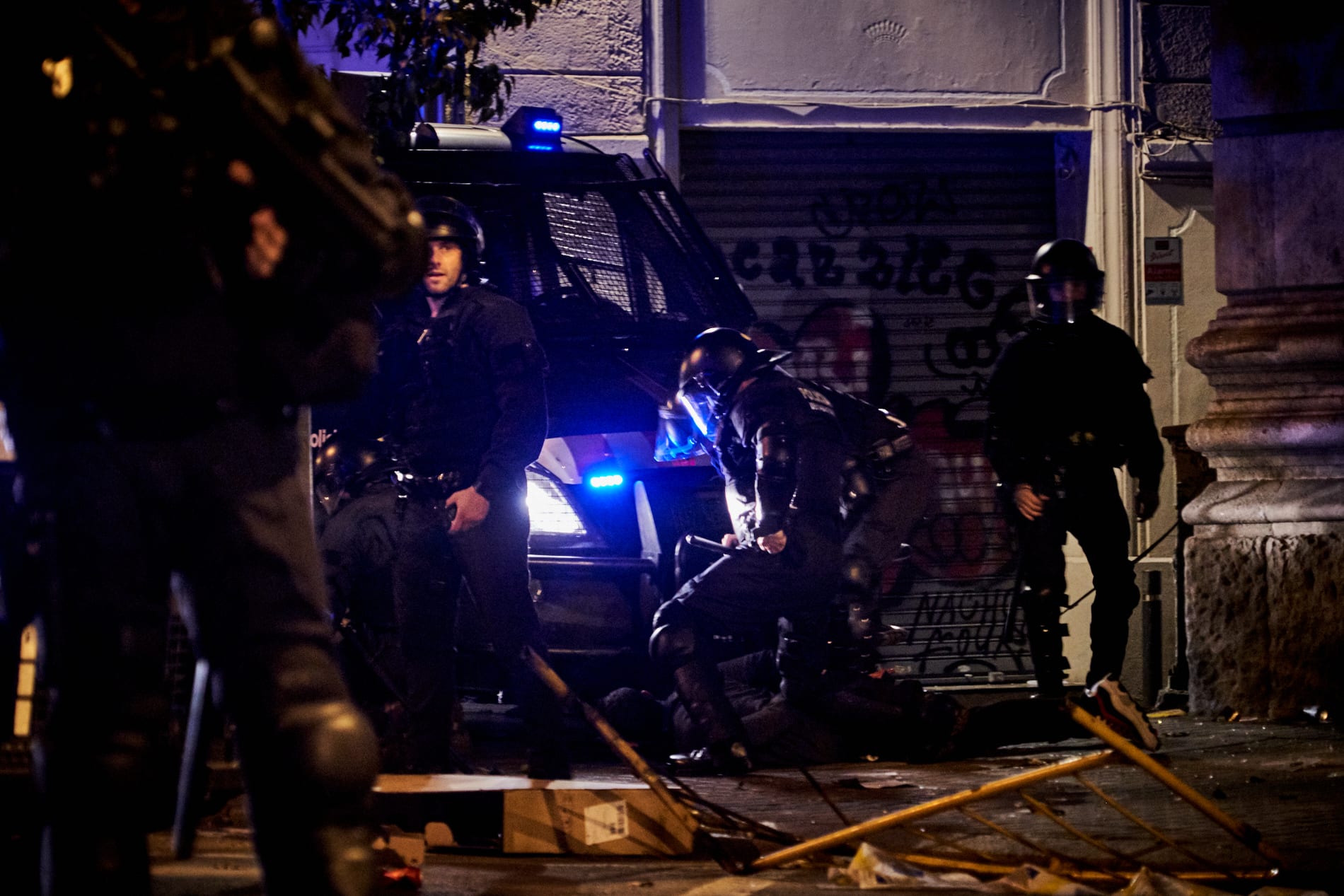
Ángel Gómez is an agent of the Mossos d’Esquadra, the Catalan autonomous police force, and president of the association Union of Mossos for the Spanish Constitution. Gómez believes that Catalonia is currently on „the verge of a civil conflict of catastrophic and dramatic dimensions,” a problem that would threaten „all regions of Spain”. For him, independence „is part of a program of destabilization by leftist nostalgics, supporters of outdated ideologies camouflaged under feminist flags, of homosexual, vegan, animalist and anti-nuclear collectives”.
This conflictive vision is also rejected by the anti-capitalist politician Vehí: „Those who are most interested in promoting the vision of two blocks in Catalonia are the ones that systematically block the democratic way out. The referendum is a device to avoid splitting the society in two and to vote if a different national perspective is wanted”.
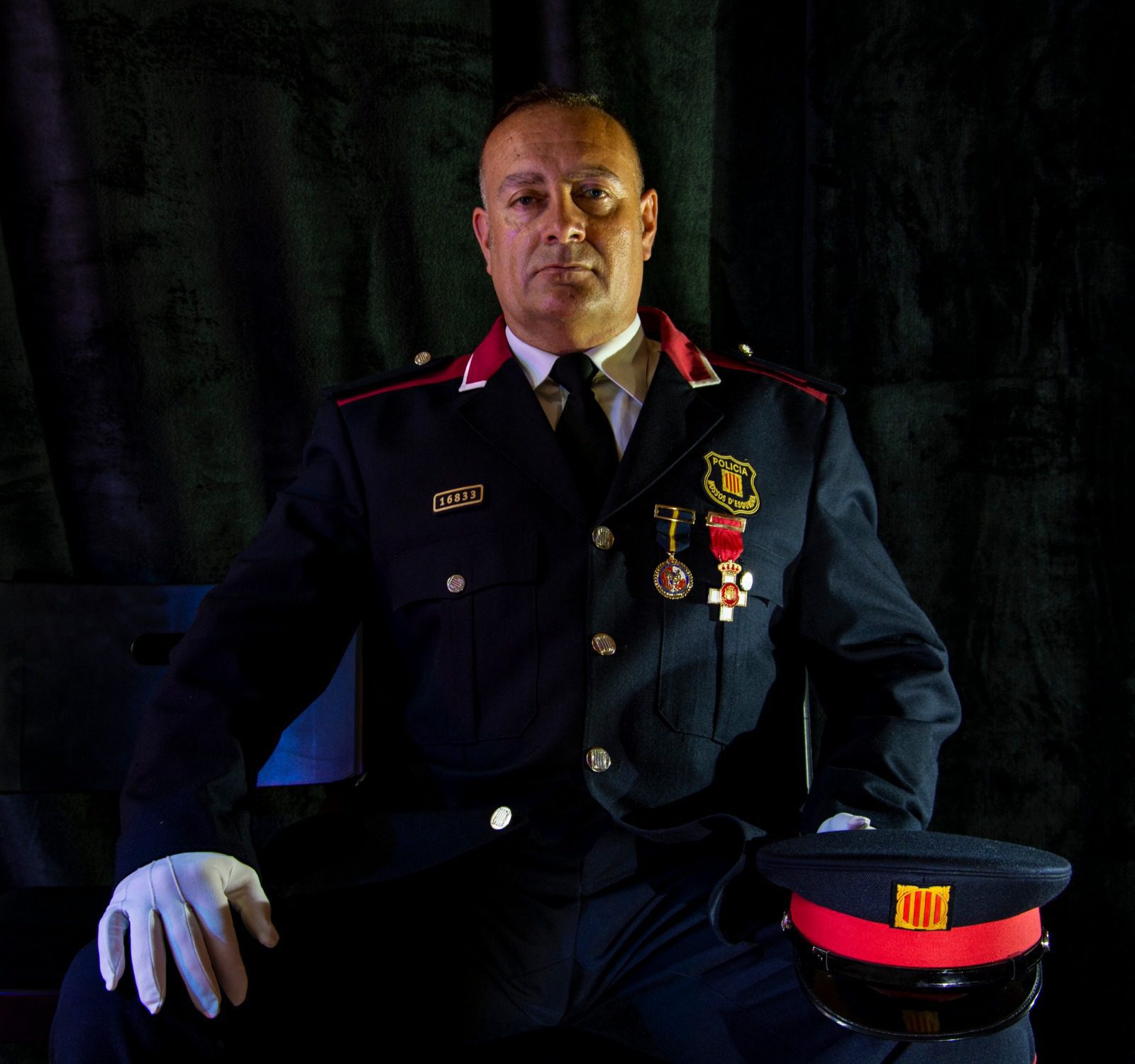
Nonetheless, the Catalan police officer also denies that there is a Catalan conflict but „a generalized subversion fomented from the illicit autonomous institutions, but consented by the central government. A corrupt political class kidnaps the Spanish nation with gangland and Bolshevist overtones”. For him, there is not half of the population that is pro-independence either, but „social activism based on a political fiction instigated by the regime and its subsidized media, as well as by an indoctrinating school, whose ends and means are illegal”.
According to Gómez, the street mobilization is instigated „by the political cryptocommissars camouflaged as teachers in high schools and universities and the media. Among this mass, they have taken in activists of an anarchofascist sign and attitude, who are the ones who are starting the escalation of violence to achieve repressive actions aimed at re-establishing the rule of law”. In this way, says the police officer, they manage to „project victimhood and gather international support from countries that are very ignorant of the political and social situation in Spain and whose perception of Spain is based on clichés from 60 years ago”.
One year after that October 14, when a sentence was made public and raised the level of street protests, a respiratory virus born in China emptied the Catalan streets for months and broke an attempt to bring together central and autonomous power. Meanwhile, on the pitch of the judicial return match, Europe, the two legal teams are beginning to warm up. El Clásico Madrid-Barcelona will be arbitrated by a Strasbourg referee: the European Court of Human Rights.